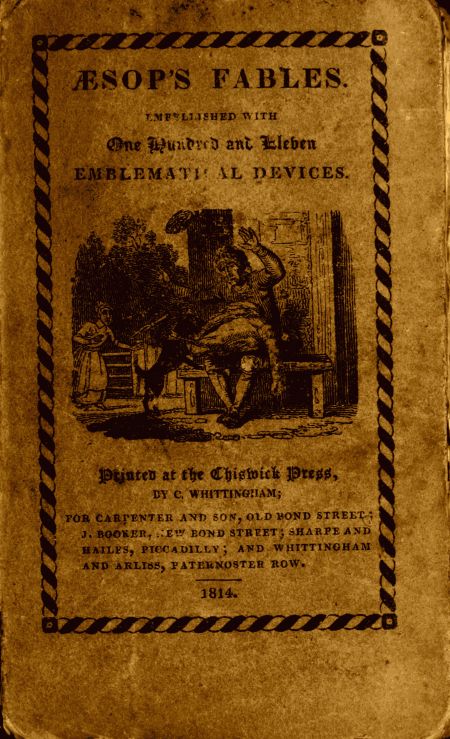
The Project Gutenberg EBook of Æsop's Fables, by Æsop
This eBook is for the use of anyone anywhere at no cost and with
almost no restrictions whatsoever. You may copy it, give it away or
re-use it under the terms of the Project Gutenberg License included
with this eBook or online at www.gutenberg.org
Title: Æsop's Fables
Embellished with One Hundred and Eleven Emblematical Devices.
Author: Æsop
Release Date: March 18, 2012 [EBook #39187]
Language: English
Character set encoding: ISO-8859-1
*** START OF THIS PROJECT GUTENBERG EBOOK ÆSOP'S FABLES ***
Produced by Chris Curnow, Julia Neufeld and the Online
Distributed Proofreading Team at http://www.pgdp.net (This
file was produced from images generously made available
by The Internet Archive)

EMBELLISHED WITH

Printed at the Chiswick Press,
FOR CARPENTER AND SON, OLD BOND STREET;
J. BOOKER, NEW BOND STREET; SHARPE AND
HAILES, PICCADILLY; AND WHITTINGHAM
AND ARLISS, PATERNOSTER ROW.
1814.
| Fable | Page | |
| 1 | The Cock and the Jewel | 1 |
| 2 | The Wolf and the Lamb | 4 |
| 3 | The Lion and the Four Bulls | 7 |
| 4 | The Frog and the Fox | 9 |
| 5 | The Ass eating Thistles | 11 |
| 6 | The Lark and her Young Ones | 13 |
| 7 | The Cock and the Fox | 16 |
| 8 | The Fox in the Well | 19 |
| 9 | The Wolves and the Sheep | 21 |
| 10 | The Eagle and the Fox | 23 |
| 11 | The Wolf in Sheep's Clothing | 26 |
| 12 | The Fowler and the Ring-Dove | 28 |
| 13 | The Sow and the Wolf | 30 |
| 14 | The Horse and the Ass | 32 |
| 15 | The Wolf, the Lamb, and the Goat | 35 |
| 16 | The Kite and the Pigeons | 38 |
| 17 | The Country Mouse and the City Mouse | 41 |
| 18 | The Swallow and other Birds | 46 |
| 19 | The Hunted Beaver | 48 |
| 20 | The Cat and the Fox | 50 |
| [iv] | ||
| 21 | The Cat and the Mice | 52 |
| 22 | The Lion and other Beasts | 54 |
| 23 | The Lion and the Mouse | 56 |
| 24 | The Fatal Marriage | 58 |
| 25 | The Mischievous Dog | 60 |
| 26 | The Ox and the Frog | 62 |
| 27 | The Fox and the Lion | 65 |
| 28 | The Ape and the Fox | 67 |
| 29 | The Dog in the Manger | 70 |
| 30 | The Birds, the Beasts, and the Bat | 72 |
| 31 | The Fox and the Tiger | 75 |
| 32 | The Lioness and the Fox | 78 |
| 33 | The Oak and the Reed | 80 |
| 34 | The Wind and the Sun | 82 |
| 35 | The Kite, the Frog, and the Mouse | 85 |
| 36 | The Frogs desiring a King | 87 |
| 37 | The Old Woman and her Maids | 90 |
| 38 | The Lion, the Bear, and the Fox | 92 |
| 39 | The Crow and the Pitcher | 95 |
| 40 | The Porcupine and the Snakes | 97 |
| 41 | The Hares and Frogs in a Storm | 100 |
| 42 | The Fox and the Wolf | 103 |
| 43 | The Dog and the Sheep | 106 |
| 44 | The Peacock and the Crane | 108 |
| 45 | The Viper and the File | 110 |
| 46 | The Ass, the Lion, and the Cock | 112 |
| 47 | The Jackdaw and Peacocks | 114 |
| 48 | The Ant and the Fly | 116 |
| 49 | The Ant and the Grasshopper | 119 |
| 50 | The Countryman and the Snake | 121 |
| 51 | The Fox and the Sick Lion | 124 |
| 52 | The Wanton Calf | 127 |
| [v] | ||
| 53 | Hercules and the Carter | 130 |
| 54 | The Belly and the Members | 133 |
| 55 | The Horse and the Lion | 136 |
| 56 | The Husbandman and the Stork | 138 |
| 57 | The Cat and the Cock | 140 |
| 58 | The Leopard and the Fox | 142 |
| 59 | The Shepherd's Boy | 145 |
| 60 | The Fox and the Goat | 147 |
| 61 | Cupid and Death | 149 |
| 62 | The Old Man and his Sons | 151 |
| 63 | The Stag and the Fawn | 154 |
| 64 | The Old Hound | 157 |
| 65 | Jupiter and the Camel | 159 |
| 66 | The Fox without a Tail | 161 |
| 67 | The Fox and the Crow | 163 |
| 68 | The Hawk and the Farmer | 166 |
| 69 | The Nurse and the Wolf | 168 |
| 70 | The Hare and the Tortoise | 170 |
| 71 | The Young Man and his Cat | 173 |
| 72 | The Ass in the Lion's Skin | 175 |
| 73 | The Mountains in Labour | 177 |
| 74 | The Satyr and the Traveller | 179 |
| 75 | The Sick Kite | 182 |
| 76 | The Hawk and the Nightingale | 184 |
| 77 | The Peacock's Complaint | 186 |
| 78 | The Angler and the Little Fish | 188 |
| 79 | The Geese and the Cranes | 190 |
| 80 | The Dog and the Shadow | 192 |
| 81 | The Ass and the Little Dog | 194 |
| 82 | The Wolf and the Crane | 197 |
| 83 | The Envious Man and the Covetous | 199 |
| 84 | The Two Pots | 201 |
| [vi] | ||
| 85 | The Fox and the Stork | 203 |
| 86 | The Bear and the Bee-Hives | 205 |
| 87 | The Travellers and the Bear | 207 |
| 88 | The Trumpeter taken Prisoner | 209 |
| 89 | The Partridge and the Cocks | 211 |
| 90 | The Falconer and the Partridge | 214 |
| 91 | The Eagle and the Crow | 216 |
| 92 | The Lion, the Ass, and the Fox | 218 |
| 93 | The Fox and the Grapes | 220 |
| 94 | The Horse and the Stag | 222 |
| 95 | The Young Man and the Swallow | 224 |
| 96 | The Man and his Goose | 227 |
| 97 | The Dog and the Wolf | 229 |
| 98 | The Wood and the Clown | 232 |
| 99 | The Old Lion | 234 |
| 100 | The Horse and the Loaded Ass | 236 |
| 101 | The Old Man and Death | 238 |
| 102 | The Boar and the Ass | 240 |
| 103 | The Tunny and the Dolphin | 242 |
| 104 | The Peacock and the Magpie | 244 |
| 105 | The Forester and the Lion | 246 |
| 106 | The Stag looking into the Water | 248 |
| 107 | The Stag in the Ox-Stall | 251 |
| 108 | The Dove and the Ant | 254 |
| 109 | The Lion in Love | 256 |
| 110 | The Tortoise and the Eagle | 259 |
So much has been already said concerning Æsop and his writings, both by ancient and modern authors, that the subject seems to be quite exhausted. The different conjectures, opinions, traditions, and forgeries, which from time to time we have had given to us of him, would fill a large volume: but they are, for the most part, so inconsistent and absurd, that it would be but a dull amusement for the reader to be led into such a maze of uncertainty: since Herodotus, the most ancient Greek historian, did not flourish till near an hundred years after Æsop.
As for his Life, with which we are entertained in so complete a manner, before most of the editions of his Fables, it was invented by one Maximus Planudes, a Greek Monk; and, if we may judge of him from that composition, just as judicious and learned a person, as the rest of his fraternity are at this day observed to be. Sure there never were so many blunders and childish dreams mixed up together, as are to be met with in the short compass of that piece. For a Monk, he might be very good and wise, but in point of history and chronology, he shows himself to be very ignorant. He brings Æsop to Babylon, in the reign of king Lycerus, a king of his own making; for his name is not to be found in any catalogue, from Nabonassar to Alexander the Great; Nabonadius, most probably, reigning in Babylon about that time. He sends him into Egypt in the days of Nectanebo, who was not in being till two hundred years afterwards; with some other gross mistakes of that kind, which sufficiently show us that this Life was a work of invention, and that the inventor was a bungling[viii] poor creature. He never mentions Æsop's being at Athens; though Phædrus speaks of him as one that lived the greatest part of his time there; and it appears that he had a statue erected in that city to his memory, done by the hand of the famed Lysippus. He writes of him as living at Samos, and interesting himself in a public capacity in the administration of the affairs of that place; yet, takes not the least notice of the Fable which Aristotle[1] tells us he spoke in behalf of a famous Demagogue there, when he was impeached for embezzling the public money; nor does he indeed give us the least hint of such a circumstance. An ingenious man might have laid together all the materials of this kind that are to be found in good old authors, and, by the help of a bright invention, connected and worked them up with success; we might have swallowed such an imposition well enough, because we should not have known how to contradict it: but in Planudes' case, the imposture is doubly discovered; first, as he has the unquestioned authority of antiquity against him; secondly, (and if the other did not condemn him) as he has introduced the witty, discreet, judicious Æsop, quibbling in a strain of low monastic waggery, and as archly dull as a Mountebank's Jester.
That there was a Life of Æsop, either written or traditionary, before Aristotle's time, is pretty plain; and that there was something of that kind extant in Augustus' reign, is, I think, as undoubted; since Phædrus mentions many transactions of his, during his abode at Athens. But it is as certain, that Planudes met with nothing of this kind; or, at least, that he met not with the accounts with which they were furnished, because of the omissions before-mentioned; and consequently with none so authentic and good. He seems to have thrown together some merry conceits which occurred to him in the course of his reading, such as he thought were worthy of Æsop, and very confidently obtrudes them upon us for his. But, when at last he brings him to Delphos (where he was put to death by being thrown down from a precipice) that the Delphians might have some colour of justice for what they intended to do, he favours them with the same stratagem which Joseph made use of to bring back his brother Benjamin; they clandestinely convey a cup into his baggage, overtake him upon the road, after a strict search find him guilty; upon that pretence carry him back to the city, condemn and execute him.
As I would neither impose upon others, nor be imposed upon, I cannot, as some have done, let such stuff as this[ix] pass for the Life of the great Æsop. Planudes has little authority for any thing he has delivered concerning him; nay, as far as I can find, his whole account, from the beginning to the end, is mere invention, excepting some few circumstances; such as the place of his birth, and of his death; for in respect of the time in which he lived, he has blundered egregiously, by mentioning some incidents as contemporary with Æsop, which were far enough from being so. Xanthus, his supposed master, puts his wife into a passion, by bringing such a piece of deformity into her house, as our Author is described to be. Upon this, the master reproaches the slave for not uttering something witty, at a time that seemed to require it so much: and then Æsop comes out, slap dash, with a satirical reflection upon women, taken from Euripides, the famous Greek tragedian. Now Euripides happened not to be born till about fourscore years after Æsop's death. What credit, therefore, can be given to any thing Planudes says of him?
As to the place of his birth, I will allow, with the generality of those who have written about him, that it might have been some town in Phrygia Major: A. Gellius making mention of him, says, 'Æsopus ille, e Phrygia, Fabulator.' That he was also by condition a slave, we may conclude from what Phædrus[2] relates of him. But whether at both Samos and Athens, he does not particularly mention: though I am inclined to think it was at the latter only; because he often speaks of him as living at that place, and never at any other; which looks as if Phædrus believed that he had never lived any where else. Nor do I see how he could help being of that opinion, if others of the ancients, whose credit is equally good, did not carry him into other places. Aristotle introduces him (as I mentioned before) speaking in public to the Samians, upon the occasion of their Demagogue, or Prime Minister, being impeached for plundering the commonwealth.
I cannot but think Æsop was something above the degree of a slave, when he made such a figure as an eminent speaker in the Samian State. Perhaps he might have been in that low condition in the former part of his life; and therefore Phædrus, who had been of the same rank himself, might love to enlarge upon this circumstance, since he does not choose to represent him in any higher sphere. Unless we allow him to be speaking[3] in as public a capacity to the Athenians, upon the occasion of Pisistratus' seizing their liberties, as we have before[x] supposed he did to the Samians. But, however, granting that he was once a slave, we have great authority that he was afterwards not only free, but in high veneration and esteem with all that knew him; especially all that were eminent for wisdom and virtue. Plutarch, in his Banquet of the Seven Wise Men, among several other illustrious persons, celebrated for their wit and knowledge, introduces Æsop. And, though in one place he seems to be ridiculed by one of the company for being of a clumsy mongrel shape; yet, in general, he is represented as very courtly and polite in his behaviour. He rallies Solon, and the rest, for taking too much liberty in prescribing rules for the conduct of sovereign princes; putting them in mind, that those who aspire to be the friends and counsellors of such, lose that character, and carry matters too far when they proceed to censure and find fault with them. Upon the credit of Plutarch, likewise, we fix the Life of Æsop in the time of Crœsus, King of Lydia; with whom he was in such esteem, as to be deputed by him to consult the Oracle at Delphos, and be sent as his envoy to Periander, King of Corinth; which was about three hundred and twenty years after the time in which Homer lived, and five hundred and fifty before Christ.
Now, though this imaginary banquet of Plutarch does not carry with it the weight of a serious history, yet we may take it for granted, that he introduced nothing in his fictitious scene, which might contradict either the written or traditionary Life of Æsop; but rather chose to make every thing agree with it. Be that as it will, this is the sum of the account which we have to give of him. Nor, indeed, is it material for us to know the little trifling circumstances of his Life; as whether he lived at Samos or Athens, whether he was a slave or a freeman, whether handsome or ugly. He has left us a legacy in his writings that will preserve his memory dear and perpetual among us: what we have to do, therefore, is to show ourselves worthy of so valuable a present, and to act, in all respects, as near as we can to the will and intention of the donor. They who are governed by reason, need no other motive than the mere goodness of a thing to incite them to the practice of it. But men, for the most part, are so superficial in their inquiries, that they take all upon trust; and have no taste for any thing but what is supported by the vogue of others, and which it is inconsistent with the fashion of the world not to admire.
As an inducement, therefore, to such as these to like the person and conversation of Æsop, I must assure them that he was held in great esteem by most of the great wits of old. There is scarce an author among the ancient Greeks,[xi] who mixed any thing of morality in his writings, but either quotes or mentions him.
Whatever his person was, the beauties of his mind were very charming and engaging; that the most celebrated among the ancients were his admirers; that they speak of him with raptures, and pay as great a respect to him as to any of the other wise men who lived in the same age. Nor can I perceive, from any author of antiquity, that he was so deformed as the Monk has represented him. If he had, he must have been so monstrous and shocking to the eye, as not only to be a very improper envoy for a great king, but scarce fit to be admitted as a slave in any private family. Indeed, from what Plutarch hints of him, I suspect he had something particular in his mien; but rather odd than ugly, and more apt to excite mirth than disgust, in those that conversed with him. Perhaps something humorous displayed itself in his countenance as well as his writings; and it might be upon account of both, that he got the name of Γελωτοποιος, as Lucian calls him, and his works that of Γελοια. However, we will go a middle way; and without insisting upon his beauty, or giving into his deformity, allow him to have made a merry comical figure; at least as handsome as Socrates; but at the same time conclude, that this particularity in the frame of his body was so far from being of any disadvantage to him, that it gave a mirthful cast to every thing he said, and added a kind of poignancy to his conversation.
We have seen what opinion the ancients had of our Author, and his writings. Now, as to the manner of conveying instruction by Fables in general, though many good vouchers of antiquity sufficiently recommend it, yet to avoid tiring the reader's patience, I shall wave all quotations from thence, and lay before him the testimony of a modern; whose authority, in point of judgment, and consequently, in the present case, may be as readily acknowledged as that of any ancient of them all. "Fables[4]," says Mr. Addison, "were the first pieces of wit that made their appearance in the world; and have been still highly valued, not only in times of the greatest simplicity, but among the most polite ages of mankind. Jotham's Fable of the Trees is the oldest that is extant, and as beautiful as any which have been made since that time. Nathan's Fable of the poor Man and his Lamb, is likewise more ancient than any that is extant, besides the above-mentioned, and had so good an effect, as to convey instruction to the ear of a king, without offending it, and[xii] to bring the man after God's own heart to a right sense of his guilt, and his duty. We find Æsop in the most distant ages of Greece. And, if we look into the very beginning of the commonwealth of Rome, we see a mutiny among the common people appeased by the Fable of the Belly and the Members[5]; which was indeed very proper to gain the attention of an incensed rabble, at a time, when, perhaps, they would have torn to pieces any man who had preached the same doctrine to them, in an open and direct manner. As Fables took their birth in the very infancy of learning, they never flourished more than when learning was at its greatest height. To justify this assertion, I shall put my reader in mind of Horace, the greatest wit and critic in the Augustan age; and of Boileau, the most correct poet among the moderns; not to mention La Fontaine, who, by this way of writing, is come more into vogue than any other author of our times." After this, he proceeds to give some account of that kind of Fable in which the passions, and other imaginary beings, are actors; and concludes with a most beautiful one of that sort, of his own contriving. In another place, he gives us a translation from Homer of that inimitable Fable comprised in the interview between Jupiter and Juno, when the latter made use of the girdle of Venus, to recall the affection of her husband; a piece never sufficiently to be recommended to the perusal of such of the fair sex, as are ambitious of acquitting themselves handsomely in point of conjugal complacence. But I must not omit the excellent Preface, by which the Fable is introduced, "Reading is to the mind[6]," says he, "what exercise is to the body: as by the one, health is preserved, strengthened, and invigorated; by the other virtue (which is the health of the mind) is kept alive, cherished, and confirmed. But, as exercise becomes tedious and painful when we make use of it only as the means of health, so reading is too apt to grow uneasy and burdensome, when we apply ourselves to it only for our improvement in virtue. For this reason, the virtue which we gather from a Fable or an allegory, is like the health we get by hunting, as we are engaged in an agreeable pursuit that draws us on with pleasure, and makes its insensible of the fatigues that accompany it."
 THE COCK AND THE JEWEL.
THE COCK AND THE JEWEL.
A brisk young Cock, in company with two or three pullets, his mistresses, raking upon a dunghill for something to entertain them with, happened to scratch up a Jewel. He knew what it was well enough, for it sparkled with an exceeding bright lustre; but, not knowing what to do with it, endeavoured to cover his ignorance under a gay contempt; so, shrugging up his wings, shaking his head, and putting on a grimace, he expressed himself to this purpose:—'Indeed, you are a very[2] fine thing; but I know not any business you have here. I make no scruple of declaring that my taste lies quite another way; and I had rather have one grain of dear delicious barley, than all the Jewels under the sun.'
APPLICATION.
There are several people in the world that pass, with some, for well accomplished gentlemen, and very pretty fellows, though they are as great strangers to the true uses of virtue and knowledge as the Cock upon the dunghill is to the real value of the Jewel. He palliates his ignorance by pretending that his taste lies another way. But, whatever gallant airs people may give themselves upon these occasions, without dispute, the solid advantages of virtue, and the durable pleasures of learning, are as much to be preferred before other objects of the senses, as the finest brilliant diamond is above a barley-corn. The greatest blockheads would appear to understand what at the same time they affect to despise: and nobody yet was ever so vicious, as to have the impudence to declare, in public, that virtue was not a fine thing.
But still, among the idle, sauntering young fellows of the age, who have leisure as well to cultivate and improve the faculties of the mind, as to dress and embellish the body, how many are there who spend their days in raking after new scenes of debauchery, in comparison of those few who know how to relish more reasonable entertainments![3] Honest, undesigning good sense is so unfashionable, that he must be a bold man who, at this time of day, attempts to bring it into esteem.
How disappointed is the youth who, in the midst of his amorous pursuits, endeavouring to plunder an outside of bloom and beauty, finds a treasure of impenetrable virtue concealed within! And why may it not be said, how delighted are the fair sex when, from among a crowd of empty, frolic, conceited admirers, they find out, and distinguish with their good opinion, a man of sense, with a plain, unaffected person, which, at first sight, they did not like!
 THE WOLF AND THE LAMB.
THE WOLF AND THE LAMB.
One hot, sultry day, a Wolf and a Lamb happened to come, just at the same time, to quench their thirst in the stream of a clear, silver brook that ran tumbling down the side of a rocky mountain. The Wolf stood upon the higher ground, and the Lamb at some distance from him down the current. However, the Wolf, having a mind to pick a quarrel with him, asked him, what he meant by disturbing the water, and making it so muddy that he could not drink? and, at the same time demanded satisfaction. The Lamb, frightened at this threatening charge, told him, in a tone as mild as possible, that, with humble submission, he could not conceive how that could be;[5] since the water which he drank, ran down from the Wolf to him, and therefore it could not be disturbed so far up the stream. 'Be that as it will,' replies the Wolf, 'you are a rascal, and I have been told that you treated me with ill language, behind my back, about half a year ago.'—'Upon my word,' says the Lamb, 'the time you mention was before I was born.' The Wolf, finding it to no purpose to argue any longer against truth, fell into a great passion, snarling and foaming at the mouth, as if he had been mad; and drawing nearer to the Lamb, 'Sirrah,' says he, 'if it was not you, it was your father, and that is all one.'—So he seized the poor innocent, helpless thing, tore it to pieces, and made a meal of it.
APPLICATION.
The thing which is pointed at in this fable is so obvious, that it will be impertinent to multiply words about it. When a cruel ill-natured man has a mind to abuse one inferior to himself, either in power or courage, though he has not given the least occasion for it, how does he resemble the Wolf! whose envious, rapacious temper could not bear to see innocence live quietly in its neighbourhood. In short, wherever ill people are in power, innocence and integrity are sure to be persecuted: the more vicious the community is, the better countenance they have for their own villanous measures. To practise honesty in bad times, is being liable to suspicion enough; but if any one should dare to prescribe it, it is ten to[6] one but he would be impeached of high crimes and misdemeanors: for to stand up for justice in a degenerate and corrupt state, is tacitly to upbraid the government, and seldom fails of pulling down vengeance upon the head of him that offers to stir in its defence. Where cruelty and malice are in combination with power, nothing is so easy as for them to find a pretence to tyrannize over innocence, and exercise all manner of injustice.
 THE LION AND THE FOUR BULLS.
THE LION AND THE FOUR BULLS.
Four Bulls, which had entered into a very strict friendship, kept always near one another, and fed together. The Lion often saw them, and as often had a mind to make one of them his prey; but, though he could easily have subdued any of them singly, yet he was afraid to attack the whole alliance, as knowing they would have been too hard for him, and therefore contented himself, for the present, with keeping at a distance. At last, perceiving no attempt was to be made upon them, as long as this combination held, he took occasion, by whispers and hints, to foment jealousies, and raise divisions among them. This stratagem succeeded so well, that the Bulls grew cold and reserved towards one another, which[8] soon after ripened into a downright hatred and aversion; and, at last, ended in a total separation. The Lion had now obtained his ends; and, as impossible as it was for him to hurt them while they were united, he found no difficulty, now they were parted, to seize and devour every Bull of them, one after another.
APPLICATION.
The moral of this fable is so well known and allowed, that to go about to enlighten it, would be like holding a candle to the sun. "A kingdom divided against itself cannot stand;" and as undisputed a maxim as it is, was, however, thought necessary to be urged to the attention of mankind, by the best Man that ever lived. And since friendships and alliances are of so great importance to our well-being and happiness, we cannot be too often cautioned not to let them be broken by tale-bearers and whisperers, or any other contrivance of our enemies.
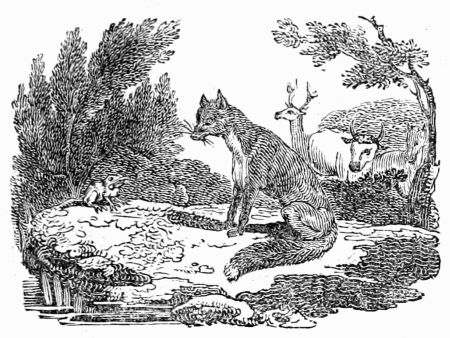 THE FROG AND THE FOX.
THE FROG AND THE FOX.
A Frog, leaping out of a lake, and taking the advantage of a rising ground, made proclamation to all the beasts of the forest, that he was an able physician, and, for curing all manner of distempers, would turn his back to no person living. This discourse, uttered in a parcel of hard, cramp words, which nobody understood, made the beasts admire his learning, and give credit to every thing he said. At last the Fox, who was present, with indignation asked him, how he could have the impudence, with those thin lantern-jaws, that meagre pale phiz, and blotched spotted body, to set up for one who was able to cure the infirmities of others.[10]
APPLICATION.
A sickly, infirm look, is as disadvantageous in a physician, as that of a rake in a clergyman, or a sheepish one in a soldier. If this moral contains any thing further, it is, that we should not set up for rectifying enormities in others, while we labour under the same ourselves. Good advice ought always to be followed, without our being prejudiced upon account of the person from whom it comes: but it is seldom that men can be brought to think us worth minding, when we prescribe cures for maladies with which ourselves are infected. "Physician, heal thyself," is too scriptural not to be applied upon such an occasion; and, if we would avoid being the jest of an audience, we must be sound, and free from those diseases of which we would endeavour to cure others. How shocked must people have been to hear a preacher, for a whole hour, declaim against drunkenness, when his own infirmity has been such, that he could neither bear nor forbear drinking; and, perhaps, was the only person in the congregation who made the doctrine at that time necessary! Others too have been very zealous in exploding crimes, for which none were more suspected than themselves: but let such silly hypocrites remember, that they whose eyes want couching, are the most improper people in the world to set up for oculists.
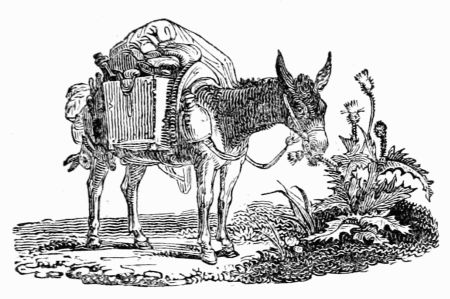 THE ASS EATING THISTLES.
THE ASS EATING THISTLES.
An Ass was loaded with good provisions of several sorts, which, in time of harvest, he was carrying into the field for his master and the reapers to dine upon. By the way he met with a fine large Thistle, and, being very hungry, began to mumble it; which, while he was doing, he entered into this reflection—'How many greedy epicures would think themselves happy, amidst such a variety of delicate viands as I now carry! But to me, this bitter prickly Thistle is more savoury and relishing than the most exquisite and sumptuous banquet.'
APPLICATION.
Happiness and misery, and oftentimes pleasure and pain, exist merely in our opinion, and are no[12] more to be accounted for than the difference of tastes. "That which is one man's meat, is another man's poison," is a proposition that ought to be allowed in all particulars, where the opinion is concerned, as well as in eating and drinking. Our senses must inform us whether a thing pleases or displeases, before we can declare our judgment of it; and that is to any man good or evil, which his own understanding suggests to him to be so, and not that which is agreeable to another's fancy. And yet, as reasonable and as necessary as it is to grant this, how apt are we to wonder at people for not liking this or that, or how can they think so and so! This childish humour of wondering at the different tastes and opinions of others, occasions much uneasiness among the generality of mankind. But, if we considered things rightly, why should we be more concerned at others differing from us in their way of thinking upon any subject whatever, than at their liking cheese, or mustard; one, or both of which, we may happen to dislike? In truth, he that expects all mankind should be of his opinion, is much more stupid and unreasonable than the Ass in the fable.
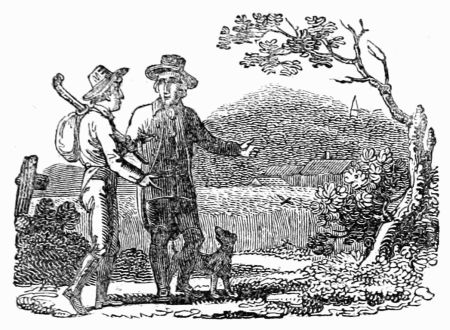 THE LARK AND HER YOUNG ONES.
THE LARK AND HER YOUNG ONES.
A Lark, who had Young Ones in a field of corn which was almost ripe, was under some fear lest the reapers should come to reap it before her young brood were fledged, and able to remove from the place: wherefore, upon flying abroad to look for food, she left this charge with them—that they should take notice what they heard talked of in her absence, and tell her of it when she came back again. When she was gone, they heard the owner of the corn call to his son—'Well,' says he, 'I think this corn is ripe enough; I would have you go early to-morrow, and desire our friends and neighbours to come and help us to reap it.' When the Old Lark came home, the Young Ones fell a quivering and chirping round[14] her, and told her what had happened, begging her to remove them as fast as she could. The mother bid them be easy; 'for,' says she, 'if the owner depends upon friends and neighbours, I am pretty sure the corn will not be reaped to-morrow.' Next day she went out again, upon the same occasion, and left the same orders with them as before. The owner came, and stayed, expecting those he had sent to: but the sun grew hot, and nothing was done, for not a soul came to help him. 'Then,' says he to his son, 'I perceive these friends of ours are not to be depended upon; so that you must even go to your uncles and cousins, and tell them, I desire they would be here betimes to-morrow morning to help us to reap.' Well, this the Young Ones, in a great fright, reported also to their mother. 'If that be all,' says she, 'do not be frightened, children, for kindred and relations do not use to be so very forward to serve one another; but take particular notice what you hear said the next time, and be sure you let me know it.' She went abroad the next day, as usual; and the owner, finding his relations as slack as the rest of his neighbours, said to his son, 'Hark ye! George, do you get a couple of good sickles ready against to-morrow morning, and we will even reap the corn ourselves.' When the Young Ones told their mother this, 'Then,' says she, 'we must be gone indeed; for, when a man undertakes to do his business himself, it is not so likely that he will be disappointed.' So she removed her Young Ones immediately, and the corn was reaped the next day by the good man and his son.[15]
APPLICATION.
Never depend upon the assistance of friends and relations in any thing which you are able to do yourself; for nothing is more fickle and uncertain. The man, who relies upon another for the execution of any affair of importance, is not only kept in a wretched and slavish suspense while he expects the issue of the matter, but generally meets with a disappointment. While he, who lays the chief stress of his business upon himself, and depends upon his own industry and attention for the success of his affairs, is in the fairest way to attain his end: and, if at last he should miscarry, has this to comfort him—that it was not through his own negligence, and a vain expectation of the assistance of friends. To stand by ourselves, as much as possible, to exert our own strength and vigilance in the prosecution of our affairs, is god-like, being the result of a most noble and highly exalted reason; but they who procrastinate and defer the business of life by an idle dependance upon others, in things which it is in their own power to effect, sink down into a kind of stupid abject slavery, and show themselves unworthy of the talents with which human nature is dignified.
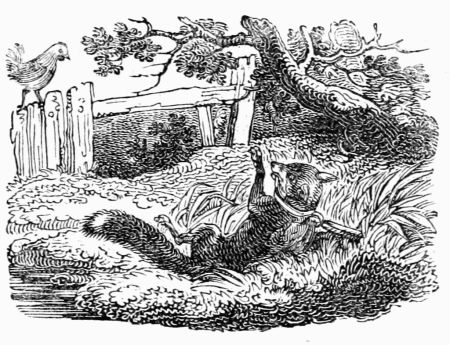 THE COCK AND THE FOX.
THE COCK AND THE FOX.
The Fox, passing early one summer's morning near a farm-yard, was caught in a springe, which the farmer had planted there for that end. The Cock, at a distance, saw what happened; and, hardly yet daring to trust himself too near so dangerous a foe, approached him cautiously, and peeped at him, not without some horror and dread of mind. Reynard no sooner perceived it, but he addressed himself to him, with all the designing artifice imaginable. 'Dear cousin,' says he, 'you see what an unfortunate accident has befallen me here, and all upon your account: for, as I was creeping through yonder hedge, in my way homeward, I heard you crow, and was resolved to ask you how you did before I went any further: but,[17] by the way, I met with this disaster; and therefore now I must become an humble suitor to you for a knife to cut this plaguy string; or, at least, that you would conceal my misfortune, till I have gnawed it asunder with my teeth.' The Cock, seeing how the case stood, made no reply, but posted away as fast as he could, and gave the farmer an account of the whole matter; who, taking a good weapon along with him, came and did the Fox's business, before he could have time to contrive his escape.
APPLICATION.
Though there is no quality of the mind more graceful in itself, or that renders it more amiable to others, than the having a tender regard to those who are in distress; yet we may err, even in this point, unless we take care to let our compassion flow out upon proper objects only. When the innocent fall into misfortune, it is the part of a generous brave spirit to contribute to their redemption; or, if that be impossible, to administer something to their comfort and support. But, when wicked men, who have been enemies to their fellow-subjects, are entrapped in their own pernicious schemes, he that labours to deliver them, makes himself an associate in their crimes, and becomes as great an enemy to the public as those whom he would screen and protect.
When highwaymen and housebreakers are taken, condemned, and going to satisfy justice,[18] at the expense of their vile paltry lives; who are they that grieve for them, and would be glad to rescue them from the rope? Not honest men, we may be sure. The rest of the thieving fraternity would, perhaps, commiserate their condition, and be ready to mutiny in their favour: nay, the rascally solicitor, who had been employed upon their account, would be vexed that his negociations had succeeded no better, and be afraid of losing his reputation, among other delinquents, for the future: but every friend to justice would have no reason to be dissatisfied at any thing but a mournful reflection, which he could not forbear making, that, while these little criminals swing for some trifling inconsiderable rapine, others, so transcendently their superiors in fraud and plunder, escape with a whole skin.
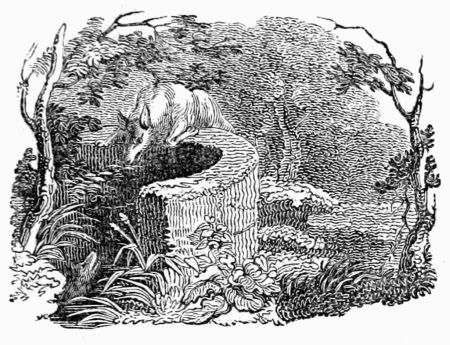 THE FOX IN THE WELL.
THE FOX IN THE WELL.
A Fox having fallen into a Well, made a shift, by sticking his claws into the sides, to keep his head above water. Soon after, a Wolf came and peeped over the brink; to whom the Fox applied himself very earnestly for assistance: entreating, that he would help him to a rope, or something of that kind, which might favour his escape. The Wolf, moved with compassion at his misfortune, could not forbear expressing his concern: 'Ah! poor Reynard,' says he, 'I am sorry for you with all my heart; how could you possibly come into this melancholy condition?'—'Nay, prithee, friend,' replies the Fox, 'if you wish me well, do not stand pitying of me, but lend[20] me some succour as fast as you can: for pity is but cold comfort when one is up to the chin in water, and within a hair's breadth of starving or drowning.'
APPLICATION.
Pity, indeed, is of itself but poor comfort at any time; and, unless it produces something more substantial, is rather impertinently troublesome, than any way agreeable. To stand bemoaning the misfortunes of our friends, without offering some expedient to alleviate them, is only echoing to their grief, and putting them in mind that they are miserable. He is truly my friend who, with a ready presence of mind, supports me; not he who condoles with me upon my ill success, and says he is sorry for my loss. In short, a favour or obligation is doubled by being well-timed; and he is the best benefactor, who knows our necessities, and complies with our wishes, even before we ask him.
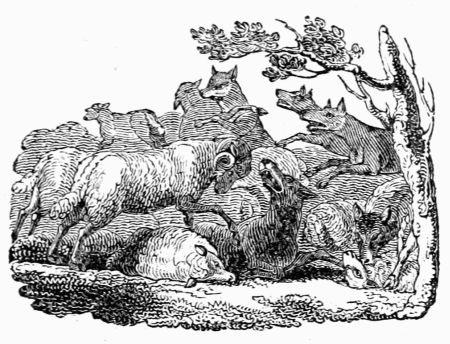 THE WOLVES AND THE SHEEP.
THE WOLVES AND THE SHEEP.
The Wolves and the Sheep had been a long time in a state of war together. At last a cessation of arms was proposed, in order to a treaty of peace, and hostages were to be delivered on both sides for security. The Wolves proposed that the Sheep should give up their dogs, on the one side, and that they would deliver up their young ones, on the other. This proposal was agreed to; but no sooner executed, than the young Wolves began to howl for want of their dams. The old ones took this opportunity to cry out, the treaty was broke; and so falling upon the Sheep, who were destitute of their faithful guardians the dogs, they worried and devoured them without control.[22]
APPLICATION.
In all our transactions with mankind, even in the most private and low life, we should have a special regard how, and with whom, we trust ourselves. Men, in this respect, ought to look upon each other as Wolves, and to keep themselves under a secure guard, and in a continual posture of defence. Particularly upon any treaties of importance, the securities on both sides should be strictly considered; and each should act with so cautious a view to their own interest, as never to pledge or part with that which is the very essence and basis of their safety and well-being. And if this be a just and reasonable rule for men to govern themselves by, in their own private affairs, how much more fitting and necessary is it in any conjuncture wherein the public is concerned? If the enemy should demand our whole army for an hostage, the danger in our complying with it would be so gross and apparent, that we could not help observing it: but, perhaps, a country may equally expose itself by parting with a particular town or general, as its whole army; its safety, not seldom, depending as much upon one of the former, as upon the latter. In short, hostages and securities may be something very dear to us, but ought never to be given up, if our welfare and preservation have any dependance upon them.
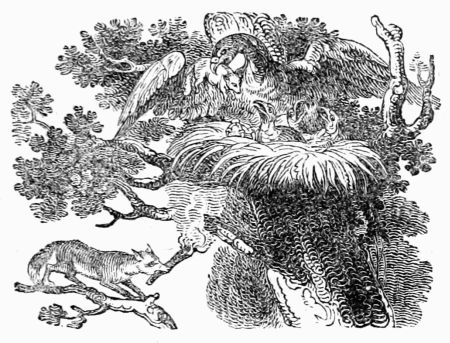 THE EAGLE AND THE FOX.
THE EAGLE AND THE FOX.
An Eagle that had young ones, looking out for something to feed them with, happened to spy a Fox's cub, that lay basking itself abroad in the sun. She made a stoop, and trussed it immediately; but before she had carried it quite off, the old Fox coming home, implored her, with tears in her eyes, to spare her cub, and pity the distress of a poor fond mother, who should think no affliction so great as that of losing her child. The Eagle, whose nest was up in a very high tree, thought herself secure enough from all projects of revenge, and so bore away the cub to her young ones, without showing any regard to the supplications of the Fox. But that subtle creature, highly incensed at this outrageous barbarity,[24] ran to an altar, where some country people had been sacrificing a kid in the open fields, and catching up a firebrand in her mouth, made towards the tree where the Eagle's nest was, with a resolution of revenge. She had scarce ascended the first branches, when the Eagle, terrified with the approaching ruin of herself and family, begged of the Fox to desist, and, with much submission, returned her the cub again safe and sound.
APPLICATION.
This fable is a warning to us not to deal hardly or injuriously by any body. The consideration of our being in a high condition of life, and those we hurt, far below us, will plead little or no excuse for us in this case: for there is scarce a creature of so despicable a rank, but is capable of avenging itself some way, and at some time or other. When great men happen to be wicked, how little scruple do they make of oppressing their poor neighbours! They are perched upon a lofty station, and have built their nest on high; and, having outgrown all feelings of humanity, are insensible of any pangs of remorse. The widow's tears, the orphan's cries, and the curses of the miserable, like javelins thrown by the hand of a feeble old man, fall by the way, and never reach their heart. But let such a one, in the midst of his flagrant injustice, remember, how easy a matter it is, notwithstanding his superior distance, for the meanest vassal to be revenged of him. The bitterness of an affliction, even where[25] cunning is wanting, may animate the poorest spirit with resolutions of vengeance; and, when once that fury is thoroughly awakened, we know not what she will require before she is lulled to rest again. The most powerful tyrants cannot prevent a resolved assassination; there are a thousand different ways for any private man to do the business, who is heartily disposed to it, and willing to satisfy his appetite for revenge, at the expense of his life. An old woman may clap a firebrand in the palace of a prince; and it is in the power of a poor weak fool to destroy the children of the mighty.
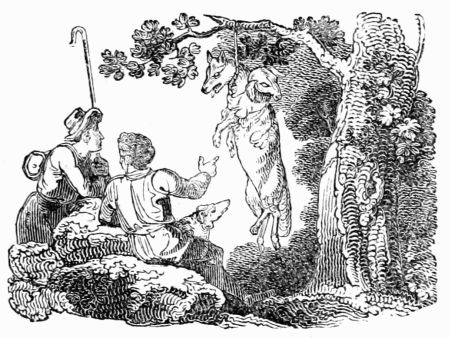 THE WOLF IN SHEEP'S CLOTHING.
THE WOLF IN SHEEP'S CLOTHING.
A Wolf, clothing himself in the skin of a Sheep, and getting in among the flock, by this means took the opportunity to devour many of them. At last the shepherd discovered him, and cunningly fastening a rope about his neck, tied him up to a tree which stood hard by. Some other shepherds happening to pass that way, and observing what he was about, drew near, and expressed their amazement at it. 'What,' says one of them, 'brother, do you make hanging of Sheep?'—'No,' replies the other; 'but I make hanging of a Wolf whenever I catch him, though in the habit and garb of a Sheep.' Then he showed them their mistake, and they applauded the justice of the execution.[27]
APPLICATION.
This fable shows us, that no regard is to be had to the mere habit or outside of any person, but to undisguised worth and intrinsic virtue. When we place our esteem upon the external garb, before we inform ourselves of the qualities which it covers, we may often mistake evil for good, and, instead of a Sheep, take a Wolf into our protection. Therefore, however innocent or sanctified any one may appear, as to the vesture wherewith he is clothed, we may act rashly, because we may be imposed upon, if from thence we take it for granted, that he is inwardly as good and righteous as his outward robe would persuade us he is. Men of judgment and penetration do not use to give an implicit credit to a particular habit, or a peculiar colour, but love to make a more exact scrutiny; for he that will not come up to the character of an honest, good kind of man, when stripped of his Sheep's Clothing, is but the more detestable for his intended imposture; as the Wolf was but the more obnoxious to the shepherd's resentment, by wearing a habit so little suiting with his manners.
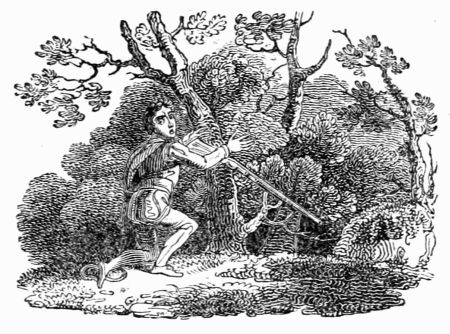 THE FOWLER AND THE RING-DOVE.
THE FOWLER AND THE RING-DOVE.
A fowler took his gun, and went into the woods a-shooting. He spied a Ring-Dove among the branches of an oak, and intended to kill it. He clapped the piece to his shoulder, and took his aim accordingly. But, just as he was going to pull the trigger, an adder, which he had trod upon under the grass, stung him so painfully in the leg, that he was forced to quit his design, and threw his gun down in a passion. The poison immediately infected his blood, and his whole body began to mortify; which, when he perceived, he could not help owning it to be just. 'Fate,' says he, 'has brought destruction upon me, while I was contriving the death of another.'[29]
APPLICATION.
This is another lesson against injustice; a topic in which our just Author abounds. And, if we consider the matter fairly, we must allow it to be as reasonable that some one should do violence to us, as we should commit it upon another. When we are impartial in our reflections, thus we must always think. The unjust man, with a hardened unfeeling heart, can do a thousand bitter things to others: but if a single calamity touches himself, oh, how tender he is! How insupportable is the uneasiness it occasions! Why should we think others born to hard treatment more than ourselves? Or imagine it can be reasonable to do to another, what we ourselves should be unwilling to suffer? In our behaviour to all mankind, we need only ask ourselves these plain questions, and our consciences will tell us how to act. Conscience, like a good valuable domestic, plays the remembrancer to us upon all occasions, and gives us a gentle twitch, when we are going to do a wrong thing. It does not, like the adder in the fable, bite us to death, but only gives us kind cautions. However, if we neglect these just and frequent warnings, and continue in a course of wickedness and injustice, do not let us be surprised if Providence thinks fit, at last, to give us a home sting, and to exercise a little retaliation upon us.
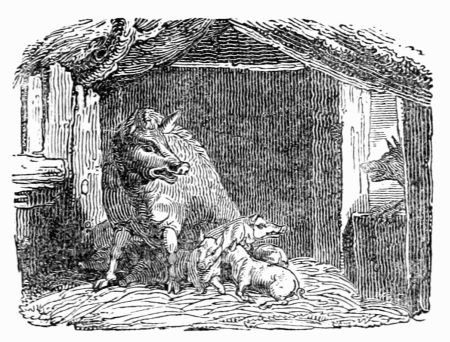 THE SOW AND THE WOLF.
THE SOW AND THE WOLF.
A Sow had just farrowed, and lay in the stye, with her whole litter of pigs about her. A Wolf who longed for one of them, but knew not how to come at it, endeavoured to insinuate himself into the Sow's good opinion: and, accordingly, coming up to her—'How does the good woman in the straw do?' says he. 'Can I be of any service to you, Mrs. Sow, in relation to your little family here? If you have a mind to go abroad, and air yourself a little, or so, you may depend upon it, I will take as much care of your pigs as you could yourself.'—'Your humble servant,' says the Sow, 'I thoroughly understand your meaning; and, to let you know I do, I must be so free as to tell you, I had rather have your room[31] than your company; and, therefore, if you would act like a Wolf of honour, and oblige me, I beg I may never see your face again.'
APPLICATION.
The being officiously good-natured and civil is something so uncommon in the world, that one cannot hear a man make profession of it without being surprised, or, at least, suspecting the disinterestedness of his intentions. Especially, when one who is a stranger to us, or though known, is ill-esteemed by us, will be making offers of services, we have great reason to look to ourselves, and exert a shyness and coldness towards him. We should resolve not to receive even favours from bad kind of people; for should it happen that some immediate mischief was not couched in them, yet it is dangerous to have obligations to such, or to give them an opportunity of making a communication with us.
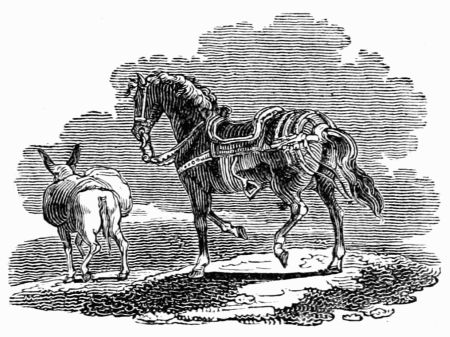 THE HORSE AND THE ASS.
THE HORSE AND THE ASS.
The Horse, adorned with his great war-saddle, and champing his foaming bridle, came thundering along the way, and made the mountains echo with his loud shrill neighing. He had not gone far, before he overtook an Ass, who was labouring under a heavy burden, and moving slowly on in the same track with himself. Immediately he called out to him, in a haughty imperious tone, and threatened to trample him in the dirt, if he did not break the way for him. The poor patient Ass, not daring to dispute the matter, quietly got out of his way as fast as he could, and let him go by. Not long after this, the same Horse, in an engagement with the enemy, happened to be shot in the eye, which made him unfit for show,[33] or any military business; so he was stripped of his fine ornaments, and sold to a carrier. The Ass, meeting him in this forlorn condition, thought that now it was his time to insult; and so, says he, 'Hey-day, friend, is it you? Well, I always believed that pride of yours would one day have a fall.'
APPLICATION.
Pride is a very unaccountable vice: many people fall into it unawares, and are often led into it by motives, which, if they considered things rightly, would make them abhor the very thoughts of it. There is no man that thinks well of himself, but desires that the rest of the world should think so too. Now it is the wrong measures we take in endeavouring after this, that expose us to discerning people in that light which they call pride, and which is so far from giving us any advantage in their esteem, that it renders us despicable and ridiculous. It is an affectation of appearing considerable, that puts men upon being proud and insolent; and their very being so makes them, infallibly, little, and inconsiderable. The man that claims and calls for reverence and respect, deserves none; he that asks for applause, is sure to lose it; the certain way to get it is to seem to shun it; and the humble man, according to the maxims even of this world, is the most likely to be exalted. He that, in his words or actions, pleads for superiority, and rather chooses to do an ill action, than condescend to do a good one, acts like the Horse, and is as void of reason and[34] understanding. The rich and the powerful want nothing but the love and esteem of mankind to complete their felicity; and these they are sure to obtain by a good-humoured, kind condescension; and as certain of being every body's aversion, while the least tincture of overbearing rudeness is perceptible in their words or actions. What brutal tempers must they be of, who can be easy and indifferent, while they know themselves to be universally hated, though in the midst of affluence and power! But this is not all; for if ever the wheel of fortune should whirl them from the top to the bottom, instead of friendship or commiseration, they will meet with nothing but contempt; and that with much more justice than ever they themselves exerted it towards others.
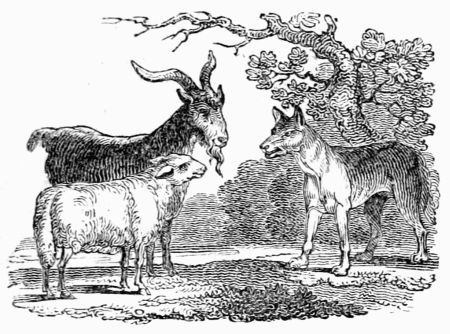 THE WOLF, THE LAMB, AND THE GOAT.
THE WOLF, THE LAMB, AND THE GOAT.
A Wolf meeting a Lamb, one day, in company with a Goat—'Child,' says he, 'you are mistaken; this is none of your mother; she is yonder;' pointing to a flock of sheep at a distance.—'It may be so,' says the Lamb; 'the person that happened to conceive me, and afterwards bore me a few months in her belly, because she could not help it, and then dropped me, she did not care where, and left me to the wide world, is, I suppose, what you call my mother; but I look upon this charitable Goat as such, that took compassion on me in my poor, helpless, destitute condition, and gave me suck; sparing it out of the mouths of her own kids, rather than I should want it.'—'But sure,' says he, 'you have a greater[36] regard for her that gave you life, than for any body else.'—'She gave me life! I deny that. She that could not so much as tell whether I should be black or white, had a great hand in giving me life, to be sure! But, supposing it were so, I am mightily obliged to her, truly, for contriving to let me be of the male-kind, so that I go every day in danger of the butcher. What reason then have I to have a greater regard for one to whom I am so little indebted for any part of my being, than for those from whom I have received all the benevolence and kindness which have hitherto supported me in life?'
APPLICATION.
It is they whose goodness makes them our parents, that properly claim filial respect from us, and not those who are such only out of necessity. The duties between parents and their children are relative and reciprocal. By all laws, natural as well as civil, it is expected that the parents should cherish and provide for the child, till it is able to shift for itself; and that the child, with a mutual tenderness, should depend upon the parent for its sustenance, and yield it a reasonable obedience. Yet, through the depravity of human nature, we very often see these laws violated, and the relations before-mentioned treating one another with as much virulence as enemies of different countries are capable of. Through the natural impatience and protervity of youth, we observe the first occasion for any animosity most[37] frequently arising from their side; but, however, there are not wanting examples of undutiful parents: and, when a father, by using a son ill, and denying him such an education and such an allowance as his circumstances can well afford, gives him occasion to withdraw his respect from him, to urge his begetting of him as the sole obligation to duty, is talking like a silly unthinking dotard. Mutual benevolence must be kept up between relations, as well as friends; for, without this cement, whatever you please to call the building, it is only a castle in the air, a thing to be talked of, without the least reality.
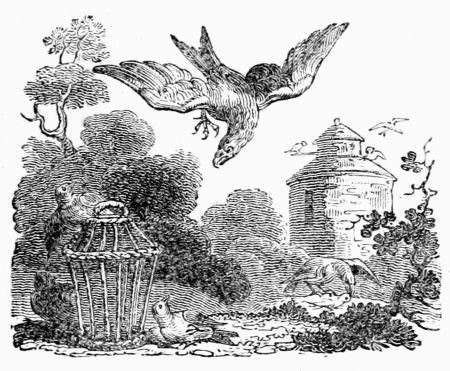 THE KITE AND THE PIGEONS.
THE KITE AND THE PIGEONS.
A Kite, who had kept sailing in the air for many days near a dove-house, and made a stoop at several pigeons, but all to no purpose (for they were too nimble for him), at last had recourse to stratagem, and took his opportunity one day to make a declaration to them, in which he set forth his own just and good intentions, who had nothing more at heart than the defence and protection of the Pigeons in their ancient rights and liberties, and how concerned he was at their fears and jealousies of a foreign invasion, especially their unjust and unreasonable suspicions of himself, as if he intended, by force of arms, to break in upon their constitution, and erect a tyrannical[39] government over them. To prevent all which, and thoroughly to quiet their minds, he thought proper to propose to them such terms of alliance and articles of peace as might for ever cement a good understanding between them: the principal of which was, that they should accept of him for their king, and invest him with all kingly privilege and prerogative over them. The poor simple Pigeons consented: the Kite took the coronation oath, after a very solemn manner, on his part, and the Doves, the oaths of allegiance and fidelity, on theirs. But much time had not passed over their heads, before the good Kite pretended that it was part of his prerogative to devour a Pigeon whenever he pleased. And this he was not contented to do himself only, but instructed the rest of the royal family in the same kingly arts of government. The Pigeons, reduced to this miserable condition, said one to the other, 'Ah! we deserve no better! Why did we let him come in!
APPLICATION.
What can this fable be applied to but the exceeding blindness and stupidity of that part of mankind who wantonly and foolishly trust their native rights of liberty without good security? Who often choose for guardians of their lives and fortunes, persons abandoned to the most unsociable vices; and seldom have any better excuse for such an error in politics than, that they were deceived in their expectation; or never[40] thoroughly knew the manners of their king till he had got them entirely in his power: which, however, is notoriously false; for many, with the Doves in the fable, are so silly, that they would admit of a Kite, rather than be without a king. The truth is, we ought not to incur the possibility of being deceived in so important a matter as this: an unlimited power should not be trusted in the hands of any one who is not endued with a perfection more than human.
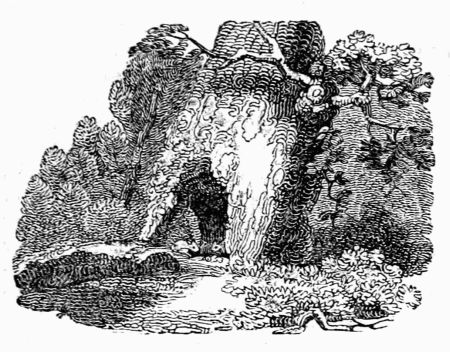 THE COUNTRY MOUSE AND THE CITY MOUSE.
THE COUNTRY MOUSE AND THE CITY MOUSE.
An honest, plain, sensible Country Mouse, is said to have entertained at his hole one day a fine Mouse of the Town. Having formerly been playfellows together, they were old acquaintance, which served as an apology for the visit. However, as master of the house, he thought himself obliged to do the honours of it, in all respects, and to make as great a stranger of his guest as he possibly could. In order to this, he set before him a reserve of delicate grey peas and bacon, a dish of fine oatmeal, some parings of new cheese, and, to crown all with a dessert, a remnant of a charming mellow apple. In good manners, he forbore to eat any himself, lest the stranger should not have enough; but, that he might seem to bear[42] the other company, sat and nibbled a piece of a wheaten straw very busily. At last says the spark of the town, 'Old crony, give me leave to be a little free with you; how can you bear to live in this nasty, dirty, melancholy hole here, with nothing but woods and meadows, and mountains, and rivulets, about you? Do not you prefer the conversation of the world to the chirping of birds, and the splendour of a court to the rude aspect of an uncultivated desert! Come, take my word for it, you will find it a change for the better. Never stand considering, but away this moment. Remember, we are not immortal, and therefore have no time to lose. Make sure of to-day, and spend it as agreeably as you can; you know not what may happen to-morrow.' In short, these and such like arguments prevailed, and his Country Acquaintance was resolved to go to town that night. So they both set out upon their journey together, proposing to sneak in after the close of the evening. They did so; and, about midnight, made their entry into a certain great house, where there had been an extraordinary entertainment the day before, and several tit-bits, which some of the servants had purloined, were hid under the seat of a window. The Country Guest was immediately placed in the midst of a rich Persian carpet: and now it was the Courtier's turn to entertain; who, indeed, acquitted himself in that capacity with the utmost readiness and address, changing the courses as elegantly, and tasting every thing first as judiciously, as any clerk of a[43] kitchen, the other sat and enjoyed himself like a delighted epicure, tickled to the last degree with this new turn of his affairs; when, on a sudden, a noise of somebody opening the door made them start from their seats, and scuttle in confusion about the dining-room. Our Country Friend, in particular, was ready to die with fear at the barking of a huge mastiff or two, which opened their throats just about the same time, and made the whole house echo. At last, recovering himself—'Well,' says he, 'if this be your town life, much good may do you with it: give me my poor quiet hole again, with my homely, but comfortable, grey peas.'
APPLICATION.
A moderate fortune, with a quiet retirement in the country, is preferable to the greatest affluence which is attended with care and the perplexity of business, and inseparable from the noise and hurry of the town. The practice of the generality of people of the best taste, it is to be owned, is directly against us in this point; but, when it is considered that this practise of theirs proceeds rather from a compliance with the fashion of the times, than their own private thoughts, the objection is of no force. Among the great numbers of men who have received a learned education, how few are there but either have their fortunes entirely to make, or, at least, think they deserve to have, and ought not to lose the opportunity of getting, somewhat more than their[44] fathers have left them! The town is the field of action for volunteers of this kind; and whatever fondness they may have for the country, yet they must stay till their circumstances will admit of a retreat thither. But sure there never was a man yet, who lived in a constant return of trouble and fatigue in town, as all men of business do in some degree or other, but has formed to himself some end of getting some sufficient competency, which may enable him to purchase a quiet possession in the country, where he may indulge his genius, and give up his old age to that easy smooth life which, in the tempest of business, he had so often longed for. Can any thing argue more strongly for a country life, than to observe what a long course of labour people go through, and what difficulties they encounter to come at it? They look upon it, at a distance, like a kind of heaven, a place of rest and happiness; and are pushing forward through the rugged thorny cares of the world, to make their way towards it. If there are many who, though born to plentiful fortunes, yet live most part of their time in the noise, the smoke, and hurry of the town, we shall find, upon inquiry, that necessary indispensible business is the real or pretended plea which most of them have to make for it. The court and the senate require the attendance of some: lawsuits, and the proper direction of trade, engage others: they who have a sprightly wit and an elegant taste for conversation, will resort to the place which is frequented by people of the same turn,[45] whatever aversion they may otherwise have for it; and others, who have no such pretence, have yet this to say, that they follow the fashion. They who appear to have been men of the best sense amongst the ancients, always recommended the country as the most proper scene for innocence, ease, and virtuous pleasure; and, accordingly, lost no opportunities of enjoying it: and men of the greatest distinction among the moderns, have ever thought themselves most happy when they could be decently spared from the employments which the excellency of their talents necessarily threw them into, to embrace the charming leisure of a country life.
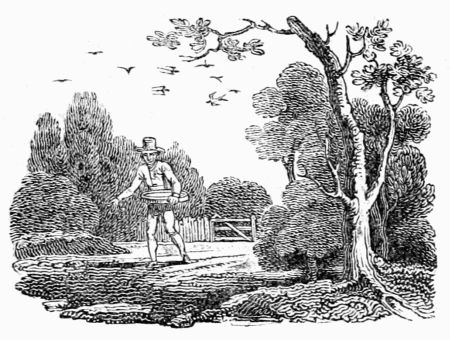 THE SWALLOW AND OTHER BIRDS.
THE SWALLOW AND OTHER BIRDS.
A farmer was sowing his field with flax. The Swallow observed it, and desired the other Birds to assist her in picking the seed up, and in destroying it; telling them, that flax was that pernicious material of which the thread was composed which made the fowler's nets, and by that means contributed to the ruin of so many innocent birds. But the poor Swallow not having the good fortune to be regarded, the flax sprung up, and appeared above the ground. She then put them in mind once more of their impending danger, and wished them to pluck it up in the bud, before it went any further. They still neglected her warnings; and the flax grew up into the high stalk. She yet again desired them to[47] attack it, for that it was not yet too late. But all that she could get was to be ridiculed and despised for a silly pretending prophet. The Swallow finding all her remonstrances availed nothing, was resolved to leave the society of such unthinking, careless creatures, before it was too late. So quitting the woods, she repaired to the houses, and forsaking the conversation of the Birds, has ever since made her abode among the dwellings of men.
APPLICATION.
As men, we should always exercise so much humanity as to endeavour the welfare of mankind, particularly of our acquaintance and relations: and, if by nothing further, at least by our good advice. When we have done this, and, if occasion required, continued to repeat it a second or third time, we shall have acquitted ourselves sufficiently from any imputation upon their miscarriage; and having nothing more to do but to separate ourselves from them, that we may not be involved in their ruin, or be supposed to partake of their error. This is an excommunication which reason allows. For as it would be cruel, on the one side, to prosecute and hurt people for being mistaken, so, on the other, it would be indiscreet and over complaisant, to keep them company through all their wrong notions, and act contrary to our opinion out of pure civility.
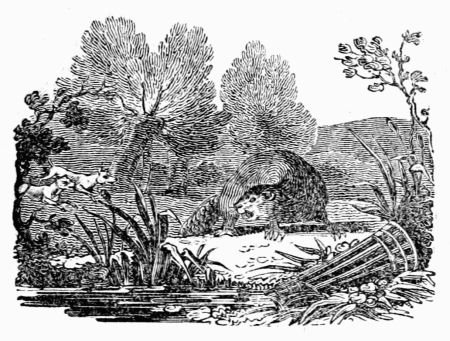 THE HUNTED BEAVER.
THE HUNTED BEAVER.
It is said that a Beaver (a creature which lives chiefly in the water) has a certain part about him which is good in physic, and that, upon this account, he is often hunted down and killed. Once upon a time, as one of these creatures was hard pursued by the dogs, and knew not how to escape, recollecting with himself the reason of his being thus persecuted, with a great resolution and presence of mind, he bit off the part which his hunters wanted, and throwing it towards them, by these means escaped with his life.
APPLICATION.
However it is among beasts, there are few human creatures but what are hunted for something[49] else besides either their lives or the pleasure of hunting them. The inquisition would hardly be so keen against the Jews, if they had not something belonging to them which their persecutors esteem more valuable than their souls; which whenever that wise, but obstinate people, can prevail with themselves to part with, there is an end of the chase for that time. Indeed, when life is pursued, and in danger, whoever values it, should give up every thing but his honour to preserve it. And when a discarded minister is prosecuted for having damaged the commonwealth, let him but throw down some of the fruits of his iniquity to the hunters, and one may engage for his coming off, in other respects, with a whole skin.
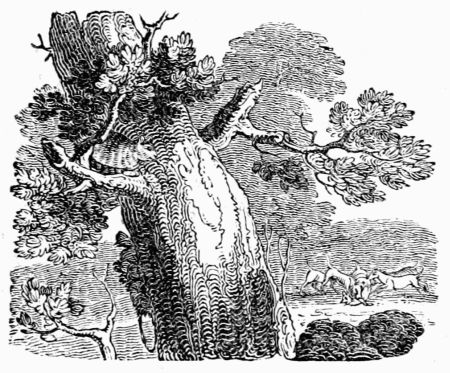 THE CAT AND THE FOX.
THE CAT AND THE FOX.
As the Cat and the Fox were talking politics together, on a time, in the middle of a forest, Reynard said, 'Let things turn out ever so bad, he did not care, for he had a thousand tricks for them yet, before they should hurt him.'—'But pray,' says he, 'Mrs. Puss, suppose there should be an invasion, what course do you design to take?'—'Nay,' says the Cat, 'I have but one shift for it, and if that won't do, I am undone.'—'I am sorry for you, replies Reynard, 'with all my heart, and would gladly furnish you with one or two of mine, but indeed, neighbour, as times go, it is not good to trust; we must even be every one for himself, as the saying is, and so your humble servant.' These words were scarce out of his mouth, when they were alarmed with a pack[51] of hounds, that came upon them full cry. The Cat, by the help of her single shift, ran up a tree, and sat securely among the top branches; from whence she beheld Reynard, who had not been able to get out of sight, overtaken with his thousand tricks, and torn in as many pieces by the dogs which had surrounded him.
APPLICATION.
A man that sets up for more cunning than the rest of his neighbours, is generally a silly fellow at the bottom. Whoever is master of a little judgment and insight into things, let him keep them to himself, and make use of them as he sees occasion; but he should not be teasing others with an idle and impertinent ostentation of them. One good discreet expedient, made use of upon an emergency, will do a man more real service, and make others think better of him, than to have passed all along for a shrewd crafty knave, and be bubbled at last. When any one has been such a coxcomb as to insult his acquaintance, by pretending to more policy and stratagem than the rest of mankind, they are apt to wish for some difficulty for him to show his skill in; where, if he should miscarry (as ten to one but he does) his misfortune, instead of pity, is sure to be attended with laughter. He that sets up for a biter, as the phrase is, being generally intent upon his prey, or vain of showing his art, frequently exposes himself to the traps of one sharper than himself, and incurs the ridicule of those whom he designed to make ridiculous.
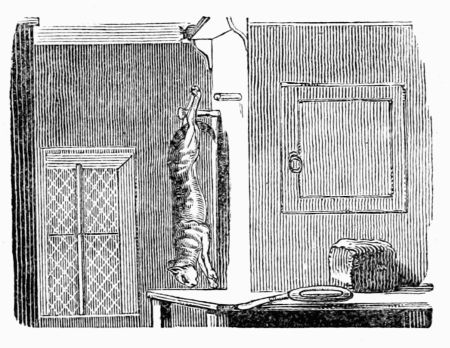 THE CAT AND THE MICE.
THE CAT AND THE MICE.
A certain house was much infested with Mice; but at last they got a Cat, who catched and eat every day some of them. The Mice, finding their numbers grow thin, consulted what was best to be done for the preservation of the public from the jaws of the devouring Cat. They debated and came to this resolution, That no one should go down below the upper shelf. The Cat, observing the mice no longer came down as usual, hungry and disappointed of her prey, had recourse to this stratagem; she hung by her hinder legs on a peg which stuck in the wall, and made as if she had been dead, hoping by this lure to entice the Mice to come down. She had not been in this posture long, before a cunning old Mouse peeped over the edge of the[53] shelf, and spoke thus:—'Aha, my good friend, are you there! there may you be! I would not trust myself with you, though your skin were stuffed with straw.'
APPLICATION.
Prudent folks never trust those a second time who have deceived them once. And, indeed, we cannot well be too cautious in following this rule, for, upon examination, we shall find, that most of the misfortunes which befal us, proceed from our too great credulity. They that know how to suspect, without exposing or hurting themselves, till honesty comes to be more in fashion, can never suspect too much.
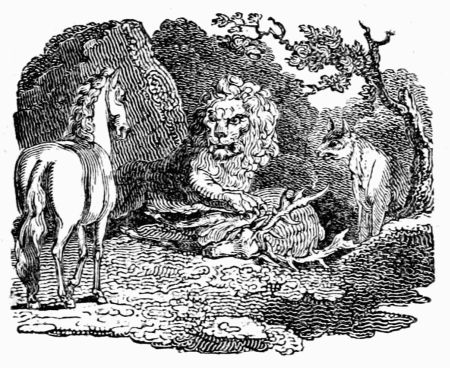 THE LION AND OTHER BEASTS.
THE LION AND OTHER BEASTS.
The Lion and several other beasts entered into an alliance, offensive and defensive, and were to live very sociably together in the forest. One day, having made a sort of an excursion by way of hunting, they took a very fine, large, fat deer, which was divided into four parts; there happening to be then present his majesty the Lion, and only three others. After the division was made, and the parts were set out, his majesty advancing forward some steps, and pointing to one of the shares, was pleased to declare himself after the following manner: 'This I seize and take possession of as my right, which devolves to me, as I[55] am descended by a true, lineal, hereditary succession from the royal family of Lion: that (pointing to the second) I claim by, I think, no unreasonable demand; considering that all the engagements you have with the enemy turn chiefly upon my courage and conduct; and you very well know, that wars are too expensive to be carried on without proper supplies. Then (nodding his head towards the third) that I shall take by virtue of my prerogative; to which, I make no question, but so dutiful and loyal a people will pay all the deference and regard that I can desire. Now, as for the remaining part, the necessity of our present affairs is so very urgent, our stock so low, and our credit so impaired and weakened, that I must insist upon your granting that, without any hesitation or demur; and hereof fail not at your peril.'
APPLICATION.
No alliance is safe which is made with those that are superior to us in power. Though they lay themselves under the most strict and solemn ties at the opening of the congress, yet the first advantageous opportunity will tempt them to break the treaty; and they will never want specious pretences to furnish out their declarations of war. It is not easy to determine, whether it is more stupid and ridiculous for a community to trust itself first in the hands of those that are more powerful than themselves, or to wonder afterwards that their confidence and credulity are abused, and their properties invaded.
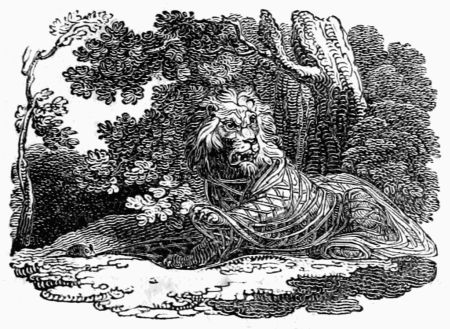 THE LION AND THE MOUSE.
THE LION AND THE MOUSE.
A Lion, faint with heat, and weary with hunting, was laid down to take his repose under the spreading boughs of a thick shady oak. It happened that, while he slept, a company of scrambling Mice ran over his back, and waked him: upon which, starting up, he clapped his paw upon one of them, and was just going to put it to death; when the little suppliant implored his mercy in a very moving manner, begging him not to slain his noble character with the blood of so despicable and small a beast. The Lion, considering the matter, thought proper to do as he was desired, and immediately released his little trembling prisoner. Not long after, traversing the forest in pursuit of his prey, he chanced to run into the[57] toils of the hunters; from whence, not able to disengage himself, he set up a most hideous and loud roar. The Mouse, hearing the voice, and knowing it to be the Lion's, immediately repaired to the place, and bid him fear nothing, for that he was his friend. Then straight he fell to work, and, with his little sharp teeth, gnawing asunder the knots and fastenings of the toils, set the royal brute at liberty.
APPLICATION.
This fable gives us to understand, that there is no person in the world so little, but even the greatest may, at some time or other, stand in need of his assistance; and consequently that it is good to use clemency, where there is any room for it, towards those who fall within our power. A generosity of this kind is a handsome virtue, and looks very graceful whenever it is exerted, if there were nothing else in it: but as the lowest people in life may, upon occasion, have it in their power either to serve or hurt us, that makes it our duty, in point of common interest, to behave ourselves with good nature and lenity towards all with whom we have to do. Then the gratitude of the Mouse, and his readiness not only to repay, but even to exceed, the obligation due to his benefactor, notwithstanding his little body, gives us the specimen of a great soul, which is never so much delighted as with an opportunity of showing how sensible it is of favours received.
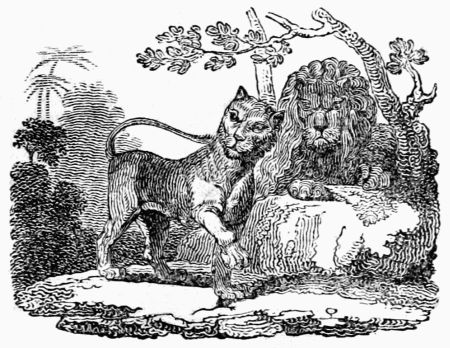 THE FATAL MARRIAGE.
THE FATAL MARRIAGE.
The Lion aforesaid, touched with the grateful procedure of the Mouse, and resolving not to be outdone in generosity by any wild beast whatsoever, desired his little deliverer to name his own terms, for that he might depend upon his complying with any proposal he should make. The Mouse, fired with ambition at this gracious offer, did not so much consider what was proper for him to ask, as what was in the power of his prince to grant; and so presumptuously demanded his princely daughter, the young Lioness, in marriage. The Lion consented: but, when he would have given the royal virgin into his possession, she, like a giddy thing as she was, not minding how she walked, by chance set her paw upon her spouse, who was coming to meet her, and crushed her little dear to pieces.[59]
APPLICATION.
This fable seems intended to show us how miserable some people make themselves by a wrong choice, when they have all the good things in the world spread before them to choose out of. In short, if that one particular of judgment be wanting, it is not in the power of the greatest monarch upon earth, nor of the repeated smiles of fortune, to make us happy. It is the want or possession of a good judgment which oftentimes makes the prince a poor wretch, and the poor philosopher completely easy. Now, the first and chief degree of judgment is to know one's self; to be able to make a tolerable estimate of one's own capacity, so as not to speak or undertake any thing which may either injure or make us ridiculous: and yet (as wonderful as it is) there have been men of allowed good sense in particular, and possessed of all desirable qualifications in general, to make life delightful and agreeable, who have unhappily contrived to match themselves with women of a genius and temper necessarily tending to blast their peace. This proceeds from some unaccountable blindness: but when wealthy plebeians, of mean extraction and unrefined education, as an equivalent for their money, demand brides out of the nurseries of our peerage, their being despised, or at least overlooked, is so unavoidable, unless in extraordinary cases, that nothing but a false taste of glory could make them enter upon a scheme so inconsistent and unpromising.
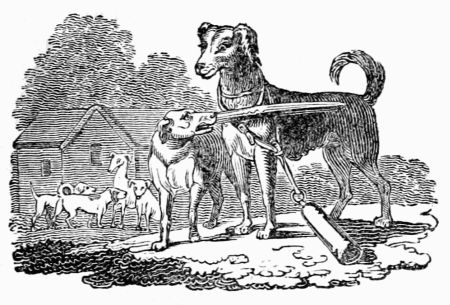 THE MISCHIEVOUS DOG.
THE MISCHIEVOUS DOG.
A certain man had a Dog, which was so fierce and mischievous, that he was forced to fasten a heavy clog about his neck, to keep him from running at and worrying people. This the vain cur took for a badge of honourable distinction; and grew so insolent upon it, that he looked down with an air of scorn upon the neighbouring dogs, and refused to keep them company. But a sly old poacher, who was one of the gang, assured him, that he had no reason to value himself upon the favour he wore, since it was fixed upon him rather as a mark of disgrace than of honour.
APPLICATION.
Some people are so exceeding vain, and at the same time so dull of apprehension, that they interpret every thing by which they are distinguished[61] from others in their own favour. If they betray any weaknesses in conversation, which are apt to excite the laughter of their company, they make no scruple of ascribing it to their superiority in point of wit. If want of sense or breeding (one of which is always the case) disposes them to give, or mistake, affronts, upon which account all discreet sensible people are obliged to shun their company, they impute it to their own valour and magnanimity, to which they fancy the world pays an awful and respectful deference. There are several decent ways of preventing such turbulent men from doing mischief, which might be applied with secrecy, and many times pass unregarded, if their own arrogance did not require the rest of mankind to take notice of it.
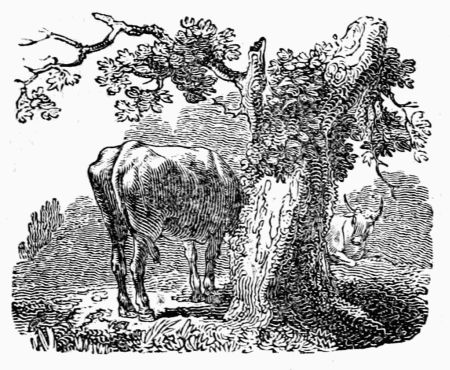 THE OX AND THE FROG.
THE OX AND THE FROG.
An Ox, grazing in a meadow, chanced to set his foot among a parcel of young Frogs, and trod one of them to death. The rest informed their mother, when she came home, what had happened; telling her, that the beast which did it was the hugest creature that they ever saw in their lives. 'What, was it so big?' says the old Frog, swelling and blowing up her speckled belly to a great degree. 'Oh! bigger by a vast deal,' say they. 'And so big?' says she, straining herself yet more. 'Indeed, mamma,' say they, 'If you were to burst yourself, you would never be so big.' She strove yet again, and burst herself indeed.
[63]APPLICATION.
Whenever a man endeavours to live equal with one of a greater fortune than himself, he is sure to share a like fate with the Frog in the fable. How many vain people, of moderate easy circumstances, burst and come to nothing, by vying with those whose estates are more ample than their own? Sir Changeling Plumstock was possessed of a very considerable estate, devolved to him by the death of an old uncle, who had adopted him his heir. He had a false taste of happiness, and, without the least economy, trusting to the sufficiency of his vast revenue, was resolved to be outdone by nobody in showish grandeur and expensive living. He gave five thousand pounds for a piece of ground in the country to set a house upon; the building and furniture of which cost fifty thousand more; and his gardens were proportionably magnificent. Besides which, he thought himself under a necessity of buying out two or three tenements which stood in his neighbourhood, that he might have elbow-room enough. All this he could very well bear; and still might have been happy, had it not been for an unfortunate view which he one day happened to take of my Lord Castlebuilder's gardens, which consisted of twenty acres, whereas his own were not above twelve. From that time he grew pensive; and, before the ensuing winter, gave five and thirty years purchase for a dozen acres more to enlarge his gardens; built a couple[64] of exorbitant greenhouses, and a large pavilion at the further end of a terrace-walk. The bare repairs and superintendencies of all which call for the remaining part of his income. He is mortgaged pretty deep, and pays nobody; but, being a privileged person, resides altogether at a private cheap lodging in the City of Westminster.
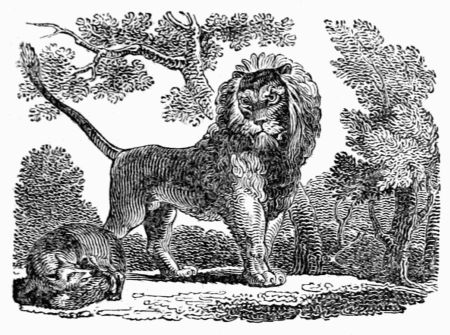 THE FOX AND THE LION.
THE FOX AND THE LION.
The first time the Fox saw the Lion, he fell down at his feet, and was ready to die with fear. The second time, he took courage, and could even bear to look upon him. The third time, he had the impudence to come up to him, to salute him, and to enter into familiar conversation with him.
APPLICATION.
From this fable we may observe the two extremes in which we may fail, as to a proper behaviour towards our superiors: the one is a bashfulness, proceeding either from a vicious guilty mind, or a timorous rusticity; the other, an over-bearing impudence, which assumes more than becomes it, and so renders the person insufferable[66] to the conversation of well-bred reasonable people. But there is this difference between the bashfulness that arises from a want of education, and the shamefacedness that accompanies conscious guilt; the first, by a continuance of time and a nearer acquaintance, may be ripened into a proper liberal behaviour; the other no sooner finds an easy practicable access, but it throws off all manner of reverence, grows every day more and more familiar, and branches out into the utmost indecency and irregularity. Indeed, there are many occasions which may happen to cast an awe, or even a terror, upon our minds at first view, without any just and reasonable grounds; but upon a little recollection, or a nearer insight, we recover ourselves, and can appear indifferent and unconcerned, where, before, we were ready to sink under a load of diffidence and fear. We should, upon such occasions, use our endeavours to regain a due degree of steadiness and resolution; but, at the same time, we must have a care that our efforts in that respect do not force the balance too much, and make it rise to an unbecoming freedom and an offensive familiarity.
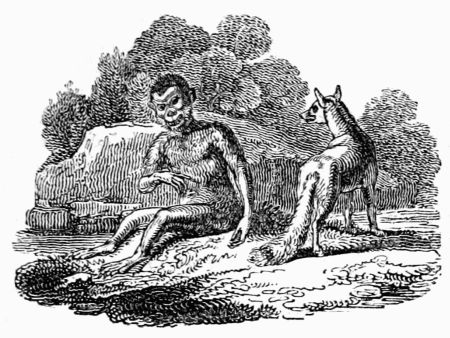 THE APE AND THE FOX.
THE APE AND THE FOX.
The Ape meeting the Fox one day, humbly requested him to give him a piece of his fine, long, brush tail, to cover his poor naked backside, which was exposed to all the violence and inclemency of the weather; 'For,' says he, 'Reynard, you have already more than you have occasion for, and a great part of it even drags along in the dirt.' The Fox answered, 'That as to his having too much, that was more than he knew; but be it as it would, he had rather sweep the ground with his tail, as long as he lived, than deprive himself of the least bit to cover the Ape's nasty stinking posteriors.'
[68]APPLICATION.
One cannot help considering the world, in the particular of the goods of fortune, as a kind of lottery; in which some few are entitled to prizes of different degrees; others, and those by much the greatest part, come off with little or nothing. Some, like the Fox, have even larger circumstances than they know what to do with, insomuch that they are rather a charge and incumbrance than of any true use and pleasure to them. Others, like the poor Ape's case, are all blank; not having been so lucky as to draw from the wheel of fortune wherewith to cover their nakedness, and live with tolerable decency. That these things are left, in a great measure, by Providence, to the blind uncertain shuffle of chance, is reasonable to conclude from the unequal distribution of them; for there is seldom any regard had to true merit upon these occasions; folly and knavery ride in coaches, while good sense and honesty walk in the dirt. The all-wise Disposer of events does certainly permit these things for just and good purposes, which our shallow understanding is not able to fathom; but, humanly thinking, if the riches and power of the world were to be always in the hands of the virtuous part of mankind, they would be more likely to do good with them in their generation, than the vile sottish wretches who generally enjoy them. A truly good man would direct all the superfluous[69] part of his wealth, at least, for the necessities of his fellow-creatures, though there were no religion which enjoined it: but selfish and avaricious people, who are always great knaves, how much soever they may have, will never think they have enough: much less be induced, by any consideration of virtue and religion, to part with the least farthing for public charity and beneficence.
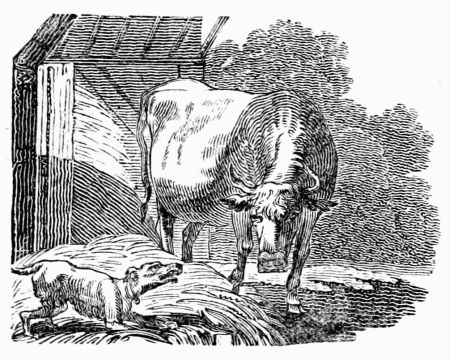 THE DOG IN THE MANGER.
THE DOG IN THE MANGER.
A Dog was lying upon a manger full of hay. An Ox, being hungry, came near, and offered to eat of the hay; but the envious ill-natured cur, getting up and snarling at him, would not suffer him to touch it. Upon which the Ox, in the bitterness of his heart, said, 'A curse light on thee, for a malicious wretch, who wilt neither eat hay thyself, nor suffer others to do it.'
APPLICATION.
Envy is the most unnatural and unaccountable of all the passions. There is scarce any other emotion of the mind, however unreasonable, but may have something said in excuse for it; and there are many of these weaknesses of the soul,[71] which, notwithstanding the wrongness and irregularity of them, swell the heart, while they last, with pleasure and gladness. But the envious man has no such apology as this to make; the stronger the passion is, the greater torment he endures; and subjects himself to a continual real pain, by only wishing ill to others. Revenge is sweet, though cruel and inhuman; and though it sometimes thirsts even for blood, yet may be glutted and satiated. Avarice is something highly monstrous and absurd; yet, as it is a desire after riches, every little acquisition gives it pleasure; and to behold and feel the hoarded treasure, to a covetous man, is a constant uncloying enjoyment. But envy, which is an anxiety arising in our minds, upon our observing accomplishments in others which we want ourselves, can never receive any true comfort, unless in a deluge, a conflagration, a plague, or some general calamity that should befal mankind: for, as long as there is a creature living, that enjoys its being happily within the envious man's sphere, it will afford nourishment to his distempered mind; but such nourishment as will make him pine, and fret, and emaciate himself to nothing.
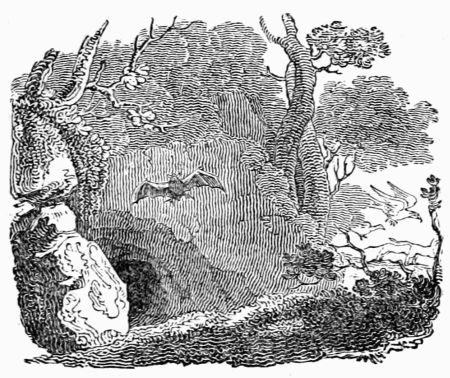 THE BIRDS, THE BEASTS, AND THE BAT.
THE BIRDS, THE BEASTS, AND THE BAT.
Once upon a time there commenced a fierce war between the Birds and the Beasts; when the Bat, taking advantage of his ambiguous make hoped, by that means, to live secure in a state of neutrality, and save his bacon. It was not long before the forces on each side met, and gave battle; and, their animosities running very high, a bloody slaughter ensued. The Bat, at the beginning of the day, thinking the birds most likely to carry it, listed himself among them; but kept fluttering at a little distance, that he might the better observe, and take his measures accordingly. However, after some time spent in the action, the army of the Beasts seeming to prevail,[73] he went entirely over to them, and endeavoured to convince them, by the affinity which he had to a Mouse, that he was by nature a beast, and would always continue firm and true to their interest. His plea was admitted; but, in the end, the advantage turning completely on the side of the Birds, under the admirable conduct and courage of their general the Eagle, the Bat, to save his life, and escape the disgrace of falling into the hands of his deserted friends, betook himself to flight; and ever since, skulking in caves and hollow trees all day, as if ashamed to show himself, he never appears till the dusk of the evening, when all the feathered inhabitants of the air are gone to roost.
APPLICATION.
For any one to desert the interest of his country, and turn renegado, either out of fear, or any prospect of advantage, is so notoriously vile and low, that it is no wonder if the man, who is detected in it, is for ever ashamed to see the sun, and to show himself in the eyes of those whose cause he has betrayed. Yet, as there is scarce any vice, even to be imagined, but there may be found men who have been guilty of it, perhaps there have been as many criminals in the case before us, as in any one particular besides, notwithstanding the aggravation and extraordinary degree of its baseness. We cannot help reflecting upon it with horror: but, as truly detestable as this vice[74] is, and must be acknowledged to be, by all mankind, so far are those that practise it from being treated with a just resentment by the rest of mankind, that by the kind reception they afterwards meet with, they rather seem to be encouraged and applauded, than despised and discountenanced, for it.
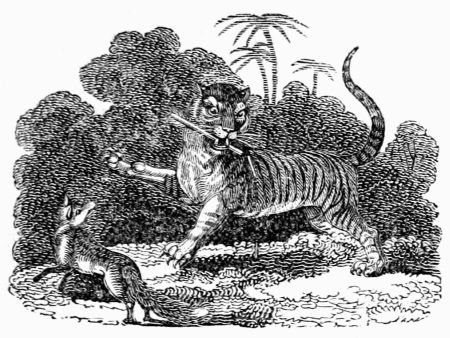 THE FOX AND THE TIGER.
THE FOX AND THE TIGER.
A skilful archer coming into the woods, directed his arrows so successfully, that he slew many wild beasts, and pursued several others. This put the whole savage kind into a fearful consternation, and made them fly to the most retired thickets for refuge. At last, the Tiger resumed a courage, and, bidding them not to be afraid, said, that he alone would engage the enemy; telling them, they might depend upon his valour and strength to revenge their wrongs. In the midst of these threats, while he was lashing himself with his tail, and tearing up the ground for anger, an arrow pierced his ribs, and hung by its barbed point in his side. He set up an hideous76] and loud roar, occasioned by the anguish which he felt, and endeavoured to draw out the painful dart with his teeth; when the Fox, approaching him, inquired with an air of surprise, who it was that could have strength and courage enough to wound so mighty and valorous a beast?—'Ah!' says the Tiger, 'I was mistaken in my reckoning: it was that invincible man yonder.'
APPLICATION.
Though strength and courage are very good ingredients towards the making us secure and formidable in the world, yet, unless there be a proper portion of wisdom or policy to direct them, instead of being serviceable, they often prove detrimental to their proprietors. A rash froward man, who depends upon the excellence of his own parts and accomplishments, is likewise apt to expose a weak side, which his enemies might not otherwise have observed, and gives an advantage to others by those very means which he fancied would have secured it to himself. Counsel and conduct always did, and always will, govern the world; and the strong, in spite of all their force, can never avoid being tools to the crafty. Some men are as much superior to others in wisdom and policy, as man, in general, is above a brute. Strength ill-concerted, opposed to them, is like a quarter staff in the hands of a huge, robust, but bungling fellow, who fights against a master of the science. The latter, though without a weapon,77] would have skill and address enough to disarm his adversary, and drub him with his own staff. In a word, savage fierceness and brutal strength must not pretend to stand in competition with finesse and stratagem.
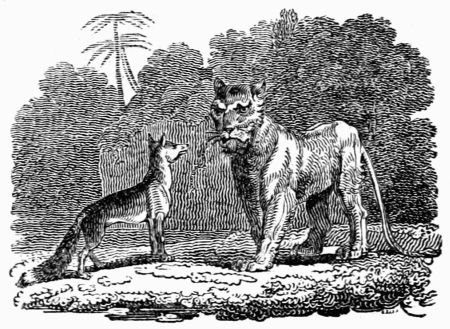 THE LIONESS AND THE FOX.
THE LIONESS AND THE FOX.
The Lioness and the Fox meeting together fell into discourse; and the conversation turning upon the breeding and the fruitfulness of some living creatures above others, the Fox could not forbear taking the opportunity of observing to the Lioness, that, for her part, she thought Foxes were as happy in that respect as almost any other creatures; for that they bred constantly once a year, if not oftener, and always had a good litter of cubs at every birth: 'and yet,' says she, 'there are those who are never delivered of more than one at a time, and that perhaps not above once or twice through their whole life, who hold up their noses, and value themselves so much upon it, that they think all other creatures beneath[79] them, and scarce worthy to be spoken to.' The Lioness, who all the while perceived at whom this reflection pointed, was fired with resentment, and with a good deal of vehemence replied—'What you have observed may be true, and that not without reason. You produce a great many at a litter, and often; but what are they?—Foxes. I indeed have but one at a time; but you should remember that this one is a Lion.'
APPLICATION.
Our productions, of whatsoever kind, are not to be esteemed so much by the quantity as the quality of them. It is not being employed much, but well, and to the purpose, which makes us useful to the age we live in, and celebrated by those which are to come. As it is a misfortune to the countries which are infested with them, for Foxes and other vermin to multiply; so one cannot help throwing out a melancholy reflection, when one sees some particulars of the humankind increase so fast as they do. But the most obvious meaning of this fable, is the hint it gives us in relation to authors. These gentlemen should never attempt to raise themselves a reputation, by enumerating a catalogue of their productions; since there is more glory in having written one tolerable piece, than a thousand indifferent ones. And whoever has had the good fortune to please in one performance of this kind, should be very cautious how he ventures his reputation in a second.
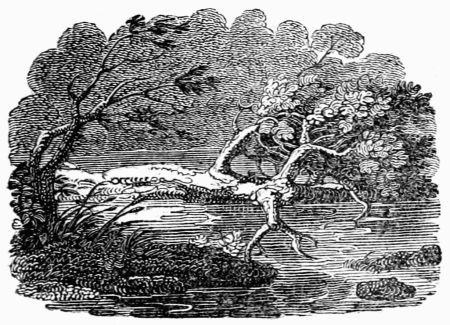 THE OAK AND THE REED.
THE OAK AND THE REED.
An oak, which hung over the bank of a river, was blown down by a violent storm of wind; and as it was carried along by the stream, some of its boughs brushed against a Reed which grew near the shore. This struck the Oak with a thought of admiration; and he could not forbear asking the Reed, how he came to stand so secure and unhurt, in a tempest which had been furious enough to tear an Oak up by the roots? 'Why,' says the Reed, 'I secure myself by putting on a behaviour quite contrary to what you do; instead of being stubborn and stiff, and confiding in my strength, I yield and bend to the blast, and let it go over me; knowing how vain and fruitless it would be to resist.'
[81]APPLICATION.
Though a tame submission to injuries which it is in our power to redress, be generally esteemed a base and a dishonourable thing; yet, to resist where there is no probability, or even hopes, of our getting the better, may also be looked upon as the effect of a blind temerity, and perhaps of a weak understanding. The strokes of fortune are oftentimes as irresistible as they are severe; and he who, with an impatient reluctant spirit, fights against her, instead of alleviating, does but double her blows upon himself. A person of a quiet still temper, whether it is given him by Nature, or acquired by art, calmly composes himself, in the midst of a storm, so as to elude the shock, or receive it with the least detriment; like a prudent experienced sailor, who is swimming to the shore from a wrecked vessel in a swelling sea, he does not oppose the fury of the waves, but stoops and gives way, that they may roll over his head without obstruction. The doctrine of absolute submission in all cases is an absurd dogmatical precept, with nothing but ignorance and superstition to support it: but, upon particular occasions, and where it is impossible for us to overcome, to submit patiently is one of the most reasonable maxims in life.
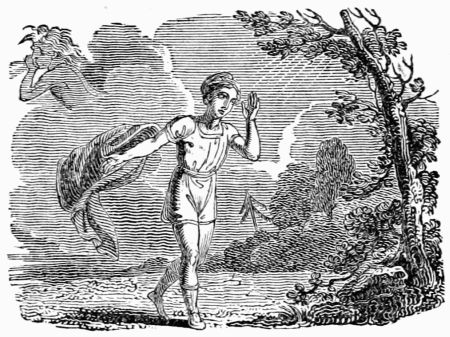 THE WIND AND THE SUN.
THE WIND AND THE SUN.
A dispute once arose between the north Wind and the Sun, about the superiority of their power; and they agreed to try their strength upon a traveller, which should be able to get his cloak off first. The north Wind began, and blew a very cold blast, accompanied with a sharp driving shower. But this, and whatever else he could do, instead of making the man quit his cloak, obliged him to gird it about his body as close as possible. Next came the Sun, who, breaking out from a thick watery cloud, drove away the cold vapours from the sky, and darted his warm sultry beams upon the head of the poor weather-beaten traveller. The man growing faint with the heat, and unable to endure it any longer, first[83] throws off his heavy cloak, and then flies for protection to the shade of a neighbouring grove.
APPLICATION.
There is something in the temper of men so averse to severe and boisterous treatment, that he who endeavours to carry his point that way, instead of prevailing, generally leaves the mind of him, whom he has thus attempted, in a more confirmed and obstinate situation than he found it at first. Bitter words and hard usage freeze the heart into a kind of obduracy, which mild persuasion and gentle language only can dissolve and soften. Persecution has always fixed and rivetted those opinions which it was intended to dispel; and some discerning men have attributed the quick growth of Christianity, in a great measure, to the rough and barbarous reception which its first teachers met with in the world. The same may have been observed of our reformation; the blood of the martyrs was the manure which produced that great Protestant crop, on which the church of England has subsisted ever since. Providence, which always makes use of the most natural means to attain its purpose, has thought fit to establish the purest religion by this method: the consideration of which may give a proper check to those who are continually endeavouring to root out errors by that very management, which so infallibly fixes and implants all opinions, as well erroneous as orthodox. When an opinion is so violently attacked, it raises an attention in[84] the persecuted party, and gives an alarm to their vanity, by making them think that worth defending and keeping, at the hazard of their lives, which, perhaps, otherwise they would only have admired awhile for the sake of its novelty, and afterwards resigned of their own accord. In short, a fierce turbulent opposition, like the north Wind, only serves to make a man wrap up his notions more closely about him; but we know not what a kind, warm, Sun-shiny behaviour, rightly applied, would not be able to effect.
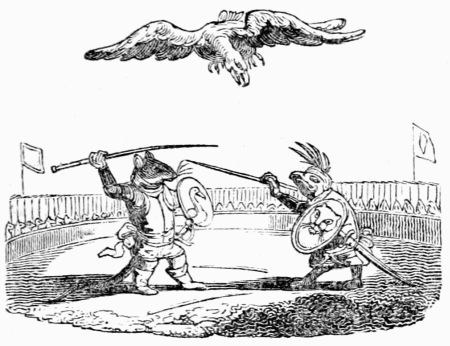 THE KITE, THE FROG, AND THE MOUSE.
THE KITE, THE FROG, AND THE MOUSE.
There was once a great emulation between the Frog and the Mouse, which should be master of the fen, and wars ensued upon it. But the crafty Mouse, lurking under the grass in ambuscade, made sudden sallies, and often surprised the enemy at a disadvantage. The Frog, excelling in strength, and being more able to leap abroad and take the field, challenged the Mouse to single combat. The Mouse accepts the challenge; and each of them entered the lists, armed with a point of a bulrush instead of a spear. A Kite, sailing in the air, beheld them afar off; and, while they were eagerly bent upon each other, and pressing on to the duel, this fatal enemy descended souse upon them, and with her crooked talons carried off both the champions.
[86]APPLICATION.
Nothing so much exposes a man's weak side, and lays him so open to an enemy, as passion and malice. He whose attention is wholly fixed upon forming a project of revenge, is ignorant of the mischiefs that may be hatching against him from some other quarter, and, upon the attack, is unprovided with the means of defending or securing himself. How are the members of a commonwealth sometimes divided amongst themselves, and inspired with rancour and malice to the last degree; and often upon as great a trifle as that which was the subject matter of debate between the Frog and the Mouse; not for any real advantage, but merely who shall get the better in the dispute? But such animosities, as insignificant and trifling as they may be among themselves, are yet of the last importance to their enemies, by giving them many fair opportunities of falling upon them, and reducing them to misery and slavery. O Britons, when will ye be wise! when will ye throw away the ridiculous distinctions of party, those ends of bulrushes, and by a prudent union secure yourselves in a state of peace and prosperity! A state, of which, if it were not for your intolerably foolish and unnecessary divisions at home, all the powers upon earth could never deprive you.
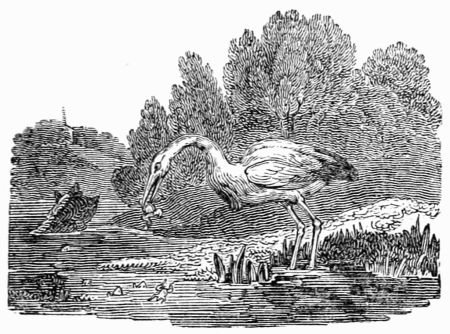 THE FROGS DESIRING A KING.
THE FROGS DESIRING A KING.
The Frogs, living an easy free life every where among the lakes and ponds, assembled together, one day, in a very tumultuous manner, and petitioned Jupiter to let them have a King, who might inspect their morals, and make them live a little honester. Jupiter, being at that time in pretty good humour, was pleased to laugh heartily at their ridiculous request; and, throwing a little log down into the pool, cried, 'There is a King for you.' The sudden splash which this made by its fall into the water, at first terrified them so exceedingly, that they were afraid to come near it. But in a little time, seeing it lay still without moving, they ventured, by degrees, to approach it; and at last, finding there was no danger, they[88] leaped upon it; and, in short, treated it as familiarly as they pleased. But not contented with so insipid a King as this was, they sent their deputies to petition again for another sort of one; for this they neither did nor could like. Upon that he sent them a Stork, who, without any ceremony, fell a devouring and eating them up, one after another, as fast as he could. Then they applied themselves privately to Mercury, and got him to speak to Jupiter in their behalf, that he would be so good as to bless them again with another King, or to restore them to their former state. 'No,' says he, 'since it was their own choice, let the obstinate wretches suffer the punishment due to their folly.'
APPLICATION.
It is pretty extraordinary to find a fable of this kind finished with so bold and yet polite a turn by Phædrus: one who attained his freedom by the favour of Augustus, and wrote it in the time of Tiberius; who were, successively, tyrannical usurpers of the Roman government. If we may take his word for it, Æsop spoke it upon this occasion. When the commonwealth of Athens flourished under good wholesome laws of its own enacting, they relied so much upon the security of their liberty, that they negligently suffered it to run out into licentiousness. And factions happening to be fomented among them by designing people, much about the same time, Pisistratus took that opportunity to make himself[89] master of their citadel and liberties both together. The Athenians finding themselves in a slate of slavery, though their tyrant happened to be a very merciful one, yet could not bear the thoughts of it; so that Æsop, where there was no remedy, prescribes to them patience, by the example of the foregoing fable; and adds, at last, 'Wherefore, my dear countrymen, be contented with your present condition, bad as it is, for fear a change should be worse.'
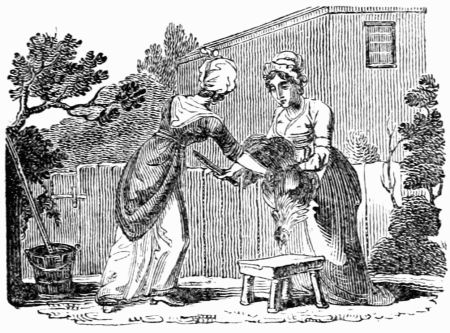 THE OLD WOMAN AND HER MAIDS.
THE OLD WOMAN AND HER MAIDS.
A certain Old Woman had several Maids, whom she used to call up to their work, every morning, at the crowing of the Cock. The Wenches, who found it grievous to have their sweet sleep disturbed so early, combined together, and killed the Cock; thinking, that, when the alarm was gone, they might enjoy themselves in their warm beds a little longer. The Old Woman, grieved for the loss of her Cock, and having, by some means or other, discovered the whole plot, was resolved to be even with them; for, from that time, she obliged them to rise constantly at midnight.
APPLICATION.
It can never be expected that things should be, in all respects, agreeable to our wishes; and, if[91] they are not very bad indeed, we ought, in many cases, to be contented with them; lest when, through impatience, we precipitately quit our present condition of life, we may to our sorrow find, with the old saying, that seldom comes a better. Before we attempt any alteration of moment, we should be certain what state it will produce; for, when things are already bad, to make them worse by trying experiments, is an argument of great weakness and folly, and is sure to be attended with a too late repentance. Grievances, if really such, ought by all means to be redressed, provided we can be assured of doing it with success: but we had better, at any time, bear with some inconvenience, than make our condition worse by attempting to mend it.
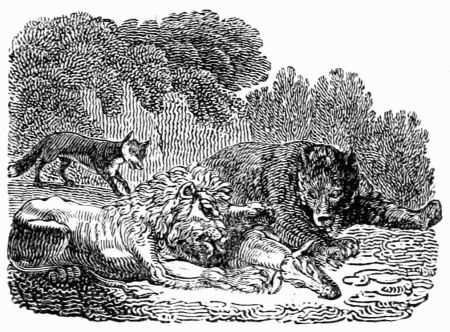 THE LION, THE BEAR, AND THE FOX.
THE LION, THE BEAR, AND THE FOX.
A Lion and a Bear fell together by the ears over the carcass of a Fawn which they found in the forest, their title to him being to be decided by force of arms. The battle was severe and tough on both sides, and they held it out, tearing and worrying one another so long, that, what with wounds and fatigue, they were so faint and weary, that they were not able to strike another stroke. Thus, while they lay upon the ground, panting and lolling out their tongues, a Fox chanced to pass by that way, who, perceiving how the case stood, very impudently stepped in between them, seized the booty which they had all this while been contending for, and carried it off. The two combatants, who lay and beheld all this, without having strength enough to stir[93] and prevent it, were only wise enough to make this reflection: 'Behold the fruits of our strife and contention! that villain, the Fox, bears away the prize, and we ourselves have deprived each other of the power to recover it from him.'
APPLICATION.
When people go to law about an uncertain title, and have spent their whole estate in the contest, nothing is more common than for some little pettifogging attorney to step in and secure it to himself. The very name of law seems to imply equity and justice, and that is the bait which has drawn in many to their ruin. Others are excited by their passions, and care not if they destroy themselves, so they do but see their enemy perish with them. But, if we lay aside prejudice and folly, and think calmly of the matter, we shall find, that going to law is not the best way of deciding differences about property; it being, generally speaking, much safer to trust to the arbitration of two or three honest sensible neighbours, than, at a vast expense of money, time, and trouble, to run through the tedious, frivolous forms, with which, by the artifice of greedy lawyers, a court of judicature is contrived to be attended. It has been said, that if mankind would lead moral virtuous lives, there would be no occasion for divines; if they would but live temperately and soberly, that they would never want physicians; both which assertions, though true in the main, are yet expressed in too great a[94] latitude. But one may venture to affirm, that if men preserved a strict regard to justice and honesty in their dealings with each other, and, upon any mistake or misapprehension, were always ready to refer the matter to disinterested umpires, of acknowledged judgment and integrity, they never could have the least occasion for lawyers. When people have gone to law, it is rarely to be found but one or both parties was either stupidly obstinate, or rashly inconsiderate. For, if the case should happen to be so intricate, that a man of common sense could not distinguish who had the best title, how easy would it be to have the opinion of the best counsel in the land, and agree to determine it by that? If it should appear dubious even after that, how much better would it be to divide the thing in dispute, rather than go to law, and hazard the losing not only of the whole, but costs and damages into the bargain?
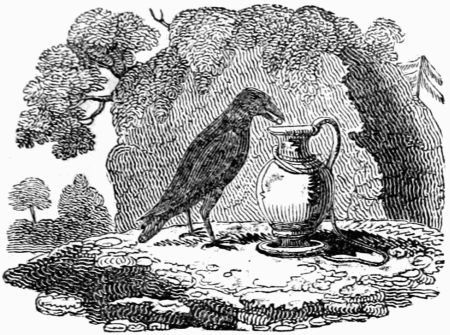 THE CROW AND THE PITCHER.
THE CROW AND THE PITCHER.
A Crow, ready to die with thirst, flew with joy to a Pitcher, which he beheld at some distance. When he came, he found water in it indeed, but so near the bottom, that, with all his stooping and straining, he was not able to reach it. Then he endeavoured to overturn the Pitcher, that so at least he might be able to get a little of it. But his strength was not sufficient for this. At last, seeing some pebbles lie near the place, he cast them one by one into the Pitcher; and thus, by degrees, raised the water up to the very brim, and satisfied his thirst.
APPLICATION.
Many things which cannot be effected by strength, or by the vulgar way of enterprising, may yet be brought about by some new and untried means. A man of sagacity and penetration,[96] upon encountering a difficulty or two, does not immediately despair; but, if he cannot succeed one way, employs his wit and ingenuity another; and, to avoid or get over an impediment, makes no scruple of stepping out of the path of his forefathers. Since our happiness, next to the regulation of our minds, depends altogether upon our having and enjoying the conveniences of life, why should we stand upon ceremony about the methods of obtaining them, or pay any deference to antiquity upon that score? If almost every age had not exerted itself in some new improvements of its own, we should want a thousand arts, or, at least, many degrees of perfection in every art, which at present we are in possession of. The invention of any thing which is more commodious for the mind or body than what they had before, ought to be embraced readily, and the projector of it distinguished with a suitable encouragement. Such as the use of the compass, for example, from which mankind reaps so much benefit and advantage, and which was not known to former ages. When we follow the steps of those who have gone before us in the old beaten track of life, how do we differ from horses in a team, which are linked to each other by a chain or harness, and move on in a dull heavy pace, to the tune of their leader's bells? But the man who enriches the present fund of knowledge with some new and useful improvement, like a happy adventurer at sea, discovers, as it were, an unknown land, and imports an additional trade into his own country.
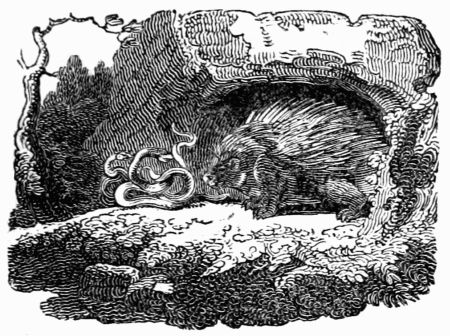 THE PORCUPINE AND THE SNAKES.
THE PORCUPINE AND THE SNAKES.
A Porcupine, wanting to shelter himself, desired a nest of Snakes to give him admittance into their cave. They were prevailed upon, and let him in accordingly; but were so annoyed with his sharp prickly quills, that they soon repented of their easy compliance, and entreated the Porcupine to withdraw, and leave them their hole to themselves. 'No,' says he, 'let them quit the place that don't like it; for my part, I am well enough satisfied as I am.'
APPLICATION.
Some people are of such brutish, inhospitable tempers, that there is no living with them, without greatly incommoding ourselves. Therefore,[98] before we enter into any degree of friendship, alliance, or partnership, with any person whatever, we should thoroughly consider his nature and qualities, his circumstances and his humour. There ought to be something in each of these respects to tally and correspond with our own measures, to suit our genius, and adapt itself to the size and proportion of our desires; otherwise our associations, of whatever kind, may prove the greatest plagues of our life. Young men are very apt to run into this error; and being warm in all their passions, throw open their arms at once, and admit into the greatest intimacy persons whom they know little of, but by false and uncertain lights. Thus they sometimes receive a Viper into their bosom instead of a friend, and take a Porcupine for a consort, with whom they are obliged to cohabit, though she may prove a thorn in their sides as long as they live. A true friend is one of the greatest blessings in life; therefore to be mistaken or disappointed of such enjoyment, when we hope to be in full possession of it must be as great a mortification. So that we cannot be too nice and scrupulous in our choice of those who are to be our companions for life: for they must have but a poor shallow notion of friendship, who intend to take it, like a lease, for a term of years only. In a word, the doctrine which this fable speaks, is to prepare us against being injured or deceived by a rash combination of any sort. The manners of the man we desire for a friend, of the woman we like for a wife, of[99] the person with whom we would jointly manage and concert measures for the advancement of our temporal interest, should be narrowly and cautiously inspected, before we embark with them in the same vessel, lest we should alter our mind when it is too late, and think of regaining the shore after we have launched out of our depth.
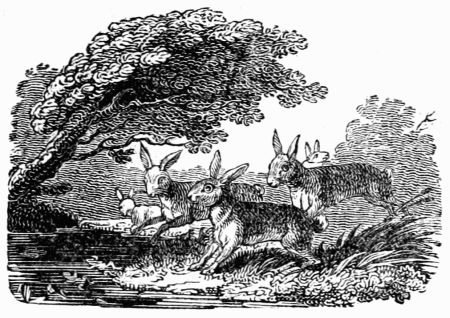 THE HARES AND FROGS IN A STORM.
THE HARES AND FROGS IN A STORM.
Upon a great storm of wind that blew among the trees and bushes, and made a rustling with the leaves, the Hares (in a certain park where there happened to be plenty of them) were so terribly frighted, that they ran like mad all over the place, resolving to seek out some retreat of more security, or to end their unhappy days by doing violence to themselves. With this resolution they found an outlet where a pale had been broken down, and, bolting forth upon an adjoining common, had not run far before their course was stopped by that of a gentle brook which glided across the way they intended to take. This was so grievous a disappointment, that they were not able to bear it; and they determined rather[101] to throw themselves headlong into the water, let what would become of it, than lead a life so full of dangers and crosses. But, upon their coming to the brink of the river, a parcel of Frogs, which were sitting there, frighted at their approach, leaped into the stream in great confusion, and dived to the very bottom for fear: which a cunning old Puss observing, called to the rest and said, 'Hold, have a care what ye do: here are other creatures, I perceive, which have their fears as well as us: don't then let us fancy ourselves the most miserable of any upon earth; but rather, by their example, learn to bear patiently those inconveniences which our nature has thrown upon us.'
APPLICATION.
This fable is designed to show us how unreasonable many people are for living in such continual fears and disquiets about the miserableness of their condition. There is hardly any state of life great enough to satisfy the wishes of an ambitious man; and scarce any so mean but may supply all the necessities of him that is moderate. But if people will be so unwise as to work themselves up to imaginary misfortunes, why do they grumble at nature and their stars, when their own perverse minds are only to blame? If we are to conclude ourselves unhappy by as many degrees as there are others greater than we, why then the greatest part of mankind must be miserable, in some degree at least. But, if they who repine at their own afflicted condition, would but[102] reckon up how many more there are with whom they would not change cases, than whose pleasures they envy, they would certainly rise up better satisfied from such a calculation. But what shall we say to those who have a way of creating themselves panics from the rustling of the wind, the scratching of a Rat or Mouse behind the hangings, the fluttering of a Moth, or the motion of their own shadow by moonlight? Their whole life is as full of alarms as that of a Hare, and they never think themselves so happy as when, like the timorous folks in the fable, they meet with a set of creatures as fearful as themselves.
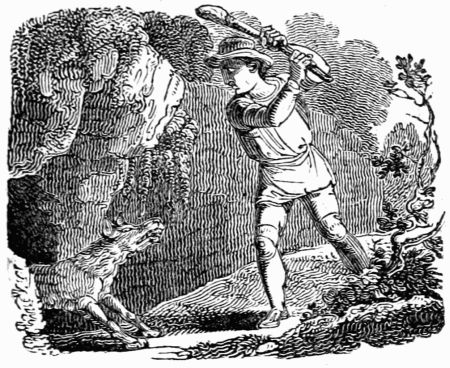 THE FOX AND THE WOLF.
THE FOX AND THE WOLF.
The Wolf having laid in store of provision, kept close at home, and made much of himself. The Fox observed this, and thinking it something particular, went to visit him, the better to inform himself of the truth of the matter. The Wolf excused himself from seeing him, by pretending he was very much indisposed. All this did but confirm the Fox in his suspicions: so away he goes to a shepherd, and made discovery of the Wolf; telling him, he had nothing else to do but to come with a good weapon and knock him on the head as he lay in his cave. The shepherd followed his directions, and killed the Wolf. The wicked Fox enjoyed the cave and provisions[104] to himself, but enjoyed them not long; for the same shepherd passing afterwards by the same hole, and seeing the Fox there, dispatched him also.
APPLICATION.
This fable seems to be directed against the odious trade of informing. Not that giving information against criminals and enemies of the public is in itself odious, for it is commendable; but the circumstances and manner of doing it oftentimes make it a vile and detestable employment. He that accuses another merely for the sake of the promised reward, or in hopes of getting his forfeited estate, or with any other such mercenary view, nay, even to save his own life, whatever he gets by the bargain, is sure to lose his reputation: for, indeed, the most innocent company is not safe with such a one in it, nor the neighbourhood secure in which he lives. A villain of his stamp, whose only end is getting, will as soon betray the innocent as the guilty: let him but know where there is a suspected person, and propose the reward, and he will scarce fail to work the suspicion up to high-treason, or be at a loss to give sufficient proofs of it. We have no small comfort concerning this sort of people, when we consider how improbable it is that they should thrive or prosper long in their ill-gotten possessions. For he that can betray another for the sake of a little pelf, must be a man of such bad principles, that it cannot be for the interest of any community to suffer him to live long in[105] it. Besides, he himself will not be contented with one single villany; and there is no fear but he will provoke justice to hurl down upon his head at least as great a calamity as he, by his malicious information, has brought upon another.
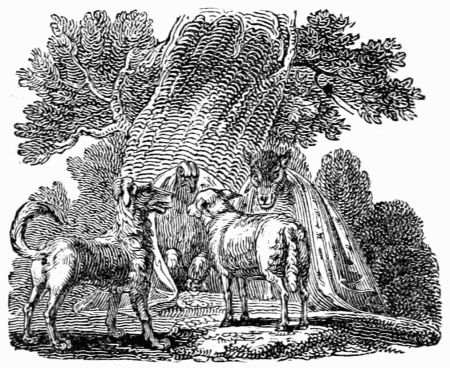 THE DOG AND THE SHEEP.
THE DOG AND THE SHEEP.
The Dog sued the Sheep for a debt, of which the Kite and the Wolf were to be judges. They, without debating long upon the matter, or making any scruple for want of evidence, gave sentence for the plaintiff; who immediately tore the poor Sheep in pieces, and divided the spoil with the unjust judges.
APPLICATION.
Deplorable are the times when open barefaced villany is protected and encouraged, when innocence is obnoxious, honesty contemptible, and it is reckoned criminal to espouse the cause of virtue. Men originally entered into covenants and civil compacts with each other for the promotion of their happiness and well-being, for the establishment[107] of justice and public peace. How comes it then that they look stupidly on, and tamely acquiesce, when wicked men pervert this end, and establish an arbitrary tyranny of their own upon the foundation of fraud and oppression? Among beasts, who are incapable of being civilized by social laws, it is no strange thing to see innocent helpless Sheep fall a prey to Dogs, Wolves, and Kites: but it is amazing how mankind could ever sink down to such a low degree of base cowardice, as to suffer some of the worst of their species to usurp a power over them, to supersede the righteous laws of good government, and to exercise all kinds of injustice and hardship, in gratifying their own vicious lusts. Wherever such enormities are practised, it is when a few rapacious statesmen combine together to get and secure the power in their own hands, and agree to divide the spoil among themselves. For as long as the cause is to be tried only among themselves, no question but they will always vouch for each other. But, at the same time, it is hard to determine which resemble brutes most, they in acting, or the people in suffering them to act, their vile selfish schemes.
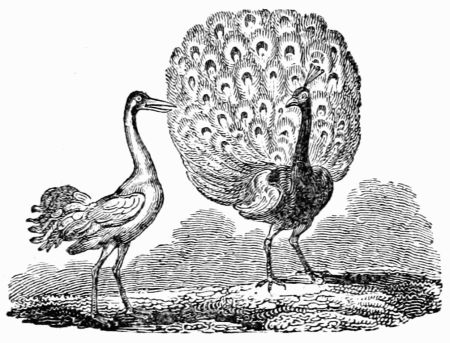 THE PEACOCK AND THE CRANE.
THE PEACOCK AND THE CRANE.
The Peacock and the Crane by chance met together in the same place. The Peacock erecting his tail, displayed his gaudy plumes, and looked with contempt upon the Crane, as some mean ordinary person. The Crane, resolving to mortify his insolence, took occasion to say, that Peacocks were very fine birds indeed, if fine feathers could make them so; but that he thought it a much nobler thing to be able to rise above the clouds, than to strut about upon the ground, and be gazed at by children.
APPLICATION.
It is very absurd to slight or insult another upon his wanting a property which we possess; for he may, for any thing we know, have as just[109] reason to triumph over us, by being master of some good quality of which we are incapable. But, in regard to the fable before us, that which the Peacock values himself upon, the glitter and finery of dress, is one of the most trifling considerations in nature; and what a man of sense would be ashamed to reckon even as the least part of merit. Indeed, children, and those people who think much about the same pitch with them, are apt to be taken with varnish and tinsel: but they who examine by the scale of common sense must find something of weight and substance, before they can be persuaded to set a value. The mind which is stored with virtuous and rational sentiments, and the behaviour which speaks complacence and humility, stamps an estimate upon the possessor, which all judicious spectators are ready to admire and acknowledge. But if there be any merit in an embroidered coat, a brocade waistcoat, a shoe, a stocking, or a sword-knot, the person who wears them has the least claim to it; let it be ascribed where it justly belongs—to the several artizans who wrought and disposed the materials of which they consist. This moral is not intended to derogate any thing from the magnificence of fine clothes and rich equipages, which, as times and circumstances require, may be used with decency and propriety enough: but one cannot help being concerned, lest any worth should be affixed to them more than their own intrinsic value.
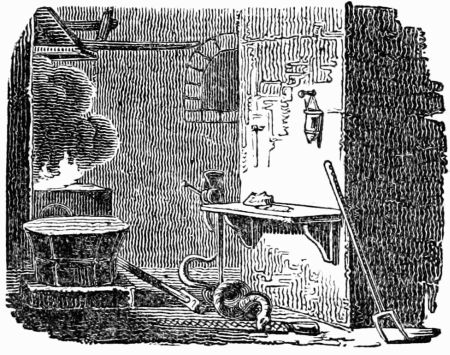 THE VIPER AND THE FILE.
THE VIPER AND THE FILE.
A Viper entering a smith's shop, looked up and down for something to eat; and seeing a File, fell to gnawing it as greedily as could be. The File told him, very gruffly, that he had best be quiet and let him alone; for he would get very little by nibbling at one who, upon occasion, could bite iron and steel.
APPLICATION.
By this fable we are cautioned to consider what any person is, before we make an attack upon him after any manner whatsoever: particularly how we let our tongues slip in censuring the actions of those who are, in the opinion of the world, not only of an unquestioned reputation, so[111] that nobody will believe what we insinuate against them; but of such an influence, upon account of their own veracity, that the least word from them would ruin our credit to all intents and purposes. If wit be the case, and we have a satirical vein, which at certain periods must have a flow, let us be cautious at whom we level it; for if the person's understanding be of better proof than our own, all our ingenious sallies, like liquor squirted against the wind, will recoil back upon our own faces, and make us the ridicule of every spectator. This fable, besides, is not an improper emblem of envy; which, rather than not bite at all, will fall foul where it can hurt nothing but itself.
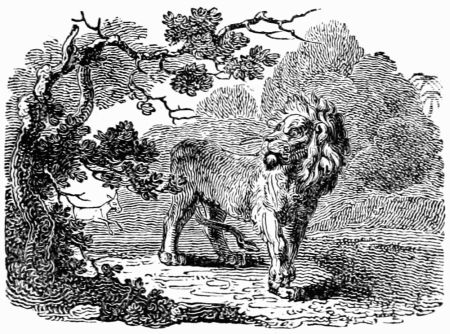 THE ASS, THE LION, AND THE COCK.
THE ASS, THE LION, AND THE COCK.
An Ass and a Cock happened to be feeding together in the same place, when on a sudden they spied a Lion approaching them. This beast is reported, above all things, to have an aversion, or rather antipathy, to the crowing of a Cock; so that he no sooner heard the voice of that bird, but he betook him to his heels, and run away as fast as ever he could. The Ass fancying he fled for fear of him, in the bravery of his heart, pursued him, and followed him so far, that they were quite out of the hearing of the Cock; which the Lion no sooner perceived, but he turned about and seized the Ass; and just as he was ready to tear him to pieces, the sluggish creature is said to have expressed himself thus:—'Alas! fool that I[113] was, knowing the cowardice of my own nature, thus, by an affected courage, to throw myself into the jaws of death, when I might have remained secure and unmolested!'
APPLICATION.
There are many who, out of an ambition to appear considerable, affect to show themselves men of fire, spirit, and courage: but these being qualities, of which they are not the right owners, they generally expose themselves, and show the little title they have to them, by endeavouring to exert and produce them at unseasonable times, or with improper persons. A bully, for fear you should find him out to be a coward, overacts his part, and calls you to account for affronts which a man of true bravery would never have thought of: and a cowardly silly fellow, observing that he may take some liberties with impunity, where perhaps the place or the company protect him, falsely concludes from thence, that the person with whom he made free is a greater coward than himself; so that he not only continues his offensive raillery and impertinence for the present, but probably renews them in some place not so privileged as the former, where his insolence meets with a due chastisement; than which nothing is more equitable in itself, or agreeable to the discreet part of mankind.
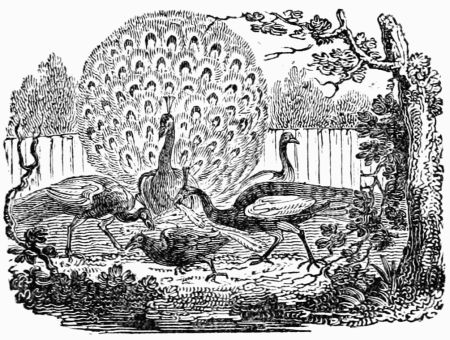 THE JACKDAW AND PEACOCKS.
THE JACKDAW AND PEACOCKS.
A certain Jackdaw was so proud and ambitious, that, not contented to live within his own sphere, he picked up the feathers which fell from the Peacocks, stuck them in among his own, and very confidently introduced himself into an assembly of those beautiful birds. They soon found him out, stripped him of his borrowed plumes, and, falling upon him with their sharp bills, punished him as his presumption deserved. Upon this, full of grief and affliction, he returned to his old companions, and would have flocked with them again; but they, knowing his late life and conversation, industriously avoided him, and refused to admit him into their company: and of them, at the same time, gave him this[115] serious reproof—'If, friend, you could have been contented with our station, and had not disdained the rank in which Nature had placed you, you had not been used so scurvily by those upon whom you intruded yourself, nor suffered the notorious slight which now we think ourselves obliged to put upon you.'
APPLICATION.
What we may learn from this fable is, in the main, to live contentedly in our own condition, whatever it be, without affecting to look bigger than we are, by a false or borrowed light. To be barely pleased with appearing above what a man really is, is bad enough; and what may justly render him contemptible in the eyes of his equals: but if, to enable him to do this with something of a better grace, he has clandestinely feathered his nest with his neighbour's goods, when found out, he has nothing to expect but to be stripped of his plunder, and used like a felonious rogue into the bargain.
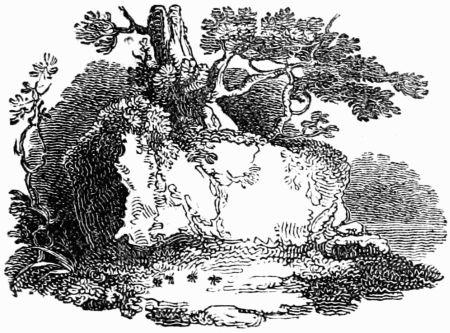 THE ANT AND THE FLY.
THE ANT AND THE FLY.
One day there happened some words between the Ant and the Fly about precedency, and the point was argued with great warmth and eagerness on both sides. Says the Fly, 'It is well known what my pretensions are, and how justly they are grounded: there is never a sacrifice that is offered but I always taste of the entrails, even before the gods themselves. I have one of the uppermost seats at church, and frequent the altar as often as any body: I have a free admission at court; and can never want the king's ear, for I sometimes sit upon his shoulder. There is not a maid of honour, or handsome young creature, comes in my way, but, if I like her, I settle betwixt her balmy lips, and then I eat and drink the best of every thing, without having any occasion to work for my[117] living. What is there that such country pusses as you enjoy, to be compared with a life like this?'—The Ant, who by this time had composed herself, replied with a great deal of temper, and no less severity—'Indeed, to be a guest at an entertainment of the gods, is a very great honour, if one is invited; but I should not care to be a disagreeable intruder any where. You talk of the king and the court, and the fine ladies there, with great familiarity; but, as I have been getting in my harvest in summer, I have seen a certain person under the town walls, making a hearty meal upon something that is not so proper to be mentioned. As to your frequenting the altars, you are in the right to take sanctuary where you are like to meet with the least disturbance: but I have known people before now run to altars, and call it devotion, when they have been shut out of all good company, and had no where else to go. You do not work for your living, you say,—true: therefore, when you have played away the summer, and winter comes, you have nothing to live upon; and, while you are starving with cold and hunger, I have a good warm house over my head, and plenty of provisions about me.'
APPLICATION.
This fable points out to us the different characters of those that recommend themselves in a vain-glorious way by false and borrowed lights; and of those whose real merit procures them a good esteem wherever they go. Poverty and[118] folly having, at the same time, possession of any one man, cannot fail of making him an object of pity, if not of contempt; but, when an empty conceited pride happens to be joined with them, they render the creature in whom they meet at the same time despicable and ridiculous. One who often attends at court, not because he has a place, but because he has not, should not value himself upon his condition. They who go to church out of vanity and curiosity, and not for pure devotion, should not value themselves upon their religion, for it is not worth a straw. They who eat at a threepenny ordinary, and sometimes not so well, should not boast either of their dinner or company. In short, nobody is a better gentleman, than he whose own honest industry supplies him with a plenty of all necessaries; who is so well acquainted with honour, as never to say or do a mean and unjust thing; and who despises an idle scoundrel, but knows how to esteem men of his own principles. Such a one is a person of the first quality, though he has never a title, and ought to take place of every man who is not so good as himself.
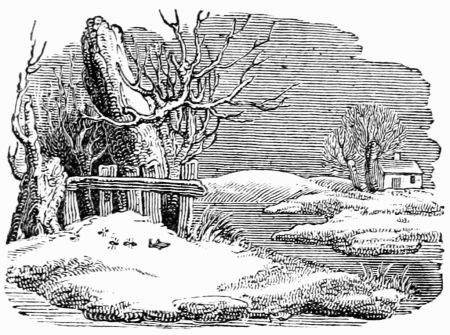 THE ANT AND THE GRASSHOPPER.
THE ANT AND THE GRASSHOPPER.
In the winter season, a commonwealth of Ants was busily employed in the management and preservation of their corn; which they exposed to the air in heaps round about the avenues of their little country habitation. A Grasshopper, who had chanced to outlive the summer, and was ready to starve with cold and hunger, approached them with great humility, and begged that they would relieve his necessity, with one grain of wheat or rye. One of the Ants asked him, how he had disposed of his time in summer, that he had not taken pains, and laid in a stock, as they had done?—'Alas, gentlemen,' says he, 'I passed away the time merrily and pleasantly, in drinking, singing, and dancing, and never once[120] thought of winter.'—'If that be the case,' replied the Ant, laughing, 'all I have to say is, that they who drink, sing, and dance in the summer, must starve in winter.'
APPLICATION.
As summer is the season of the year in which the industrious and laborious husbandman gathers and lays up such fruits as may supply his necessities in winter, so youth and manhood are the times of life which we should employ and bestow in laying in such a stock of all kind of necessaries as may suffice for the craving demands of helpless old age. Yet, notwithstanding the truth of this, there are many of those which we call rational creatures, who live in a method quite opposite to it, and make it their business to squander away, in a profuse prodigality, whatever they get in their younger days: as if the infirmity of age would require no supplies to support it; or, at least, would find them administered to in some miraculous way. From this fable we learn this admirable lesson, never to lose any present opportunity of providing against the future evils and accidents of life. While health and the flower and vigour of our age remain firm and entire, let us lay them out to the best advantage, that, when the latter days take hold of us, and spoil us of our strength and abilities, we may have a store moderately sufficient to subsist upon, which we laid up in the morning of our age.
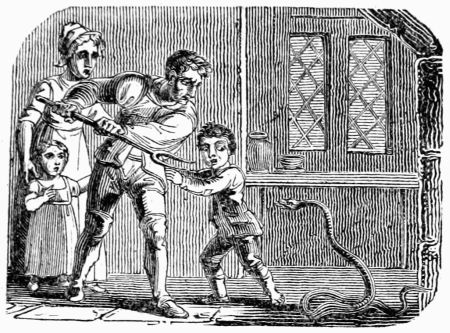 THE COUNTRYMAN AND THE SNAKE.
THE COUNTRYMAN AND THE SNAKE.
A villager, in a frosty, snowy winter, found a snake under a hedge, almost dead with cold. He could not help having compassion for the poor creature, so brought it home, and laid it upon the hearth near the fire; but it had not lain there long, before (being revived with the heat) it began to erect itself, and fly at his wife and children, filling the whole cottage with dreadful hissings. The Countryman hearing an outcry, and perceiving what the matter was, catched up a mattock, and soon dispatched him; upbraiding him at the same time in these words—'Is this, vile wretch, the reward you make to him that saved your life? Die, as you deserve; but a single death is too good for you.'
[122]APPLICATION.
It is the nature of ingrates to return evil for good: and the moralists, in all ages, have incessantly declaimed against the enormity of this crime, concluding, that they who are capable of hurting their benefactors, are not fit to live in a community; being such, as the natural ties of parent, friend, or country, are too weak to restrain within the bounds of society. Indeed, the sin of ingratitude is so detestable, that as none but the most inhuman temper can be guilty of it, so, in writing to men, there is no occasion to use many words, either in exposing the vice itself, or dissuading people from the commission of it. Therefore it is not likely that a person of Æsop's sagacity would have compiled this fable, without having something else in view besides this trite and obvious subject. He certainly intended to put us in mind that, as none but a poor silly clown would go to take up a Snake and cherish it, so we shall be very negligent and ill-advised if, in doing good offices, we do not take care to bestow our benevolence upon proper objects. It was not at all unnatural in the Snake to hiss, and brandish his tongue, and fly at the first that came near him; as soon at the person that saved his life as any other; indeed, more likely, because nobody else had so much to do with him. Nor is it strange at any time to see a reprobate fool throwing his poisonous language about, and committing his extravagancies against those,[123] more especially, who are so inadvertent as to concern themselves with him. The Snake and the reprobate will not appear extraordinary in their malevolence: but the sensible part of mankind cannot help thinking those guilty of great indiscretion, who receive either of them into their protection.
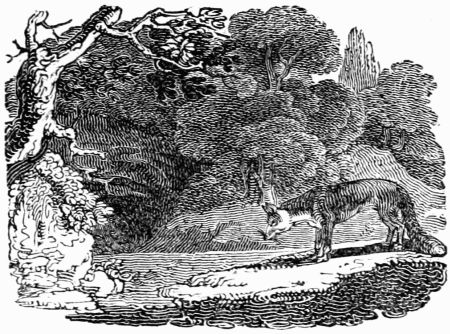 THE FOX AND THE SICK LION.
THE FOX AND THE SICK LION.
It was reported that the Lion was sick, and the beasts were made to believe that they could not make their court better than by going to visit him. Upon this they generally went; but it was particularly taken notice of, that the Fox was not one of the number. The Lion therefore dispatched one of his Jackals to sound him about it, and ask him why he had so little charity and respect, as never to come near him, at a time when he lay so dangerously ill, and every body else had been to see him?—'Why,' replies the Fox, 'pray present my duty to his majesty, and tell him, that I have the same respect for him as ever, and have been coming several times to kiss his royal hand: but I am so terribly frightened[125] at the mouth of his cave, to see the print of my fellow-subjects feet all pointing forwards and none backwards, that I have not resolution enough to venture in.' Now the truth of the matter was, that this sickness of the Lion's was only a sham to draw the beasts into his den, the more easily to devour them.
APPLICATION.
A man should weigh and consider the nature of any proposal well before he gives into it; for a rash and hasty compliance has been the ruin of many a one. And it is the quintessence of prudence not to be too easy of belief. Indeed the multitude think altogether in the same track, and are much upon a footing. Their meditations are confined in one channel, and they follow one another, very orderly, in a regular stupidity. Can a man of thought and spirit be harnessed thus, and trudge along like a pack-horse, in a deep, stinking, muddy road, when he may frisk it over the beauteous lawns, or lose himself agreeably in the shady verdant mazes of unrestrained contemplation? It is impossible. Vulgar notions are so generally attended with error, that wherever one traces the footsteps of the many, tending all one way, it is enough to make one suspect, with the Fox in the fable, that there is some trick in it. The eye of reason is dulled and stupified when it is confined, and made to gaze continually upon the same thing: it rather chooses to look about it, and amuse itself with variety of objects, as[126] they lie scattered up and down in the unbounded prospect. He that goes implicitly into a thing, may be mistaken, notwithstanding the number of those who keep him company; but he that keeps out till he sees reason to enter, acts upon true maxims of policy and prudence. In short, it becomes us, as we are reasonable creatures, to behave ourselves as such, and to do as few things as possible, of which we may have occasion to repent.
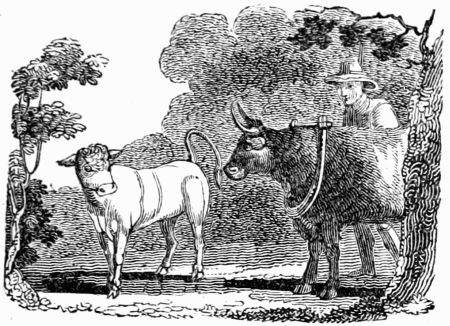 THE WANTON CALF.
THE WANTON CALF.
A Calf, full of play and wantonness, seeing the Ox at plough, could not forbear insulting him. 'What a sorry poor drudge art thou,' says he, 'to bear that heavy yoke upon your neck, and go all day drawing a plough at your tail, to turn up the ground for your master! but you are a wretched dull slave, and know no better, or else you would not do it. See what a happy life I lead: I go just where I please; sometimes I lie down under the cool shade; sometimes frisk about in the open sunshine; and, when I please, slake my thirst in the clear sweet brook; but you, if you were to perish, have not so much as a little dirty water to refresh you.' The Ox, not at all moved with what he said, went quietly and calmly on with his work; and, in the evening,[128] was unyoked and turned loose. Soon after which he saw the Calf taken out of the field, and delivered into the hands of a priest, who immediately led him to the altar, and prepared to sacrifice him. His head was hung round with fillets of flowers, and the fatal knife was just going to be applied to his throat, when the Ox drew near, and whispered him to this purpose—'Behold the end of your insolence and arrogance; it was for this only you were suffered to live at all; and pray now, friend, whose condition is best, yours or mine?'
APPLICATION.
To insult people in distress is the property of a cruel, indiscreet, and giddy temper; for, as the proceedings of fortune are very irregular and uncertain, we may, the next turn of the wheel, be thrown down to their condition, and they exalted to ours. We are likewise given to understand by this fable what the consequence of an idle life generally is, and how well satisfied laborious diligent men are, in the end, when they come quietly to enjoy the fruits of their industry. They who by little tricks and sharpings, or by open violence and robbery, live in a high expensive way, often in their hearts, at least, despise the poor honest man who is contented with the virtuous product of his daily labour, and patiently submits to his destiny. But how often is the poor man comforted, by seeing these wanton villains led in triumph to the altar of justice, while he has many a cheerful summer's morning[129] to enjoy abroad, and many a long winter's evening to indulge himself in at home, by a quiet hearth, and under an unenvied roof: blessings which often attend a sober industrious man, though the idle and the profligate are utter strangers to them. Luxury and intemperance, besides their being certain to shorten a man's days, are very apt not only to engage people with their seeming charms into a debauched life, utterly prejudicial to their health, but to make them have a contempt for others, whose good sense and true taste of happiness inspire them with an aversion to idleness and effiminacy, and put them upon hardening their constitution by innocent exercise and laudable employment. How many do gluttony and sloth tumble into an untimely grave! while the temperate and the active drink sober draughts of life, and spin out their thread to the most desirable length.
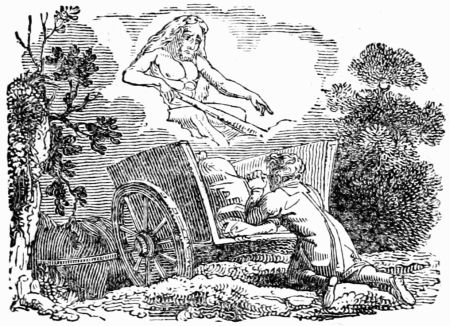 HERCULES AND THE CARTER.
HERCULES AND THE CARTER.
As a clownish Fellow was driving his cart along a deep miry lane, the wheels stuck so fast in the clay, that the horses could not draw them out. Upon this, he fell a bawling and praying to Hercules to come and help him. Hercules, looking down from a cloud, bid him not lie there, like an idle rascal as he was, but get up and whip his horses stoutly, and clap his shoulder to the wheel; adding, that this was the only way for him to obtain his assistance.
APPLICATION.
This fable shows us how vain and ill-grounded the expectations of those people are who imagine they can obtain whatever they want by importuning[131] heaven with their prayers; for it is so agreeable to the nature of the Divine Being to be better pleased with virtuous actions and an honest industry than idle prayers, that it is a sort of blasphemy to say otherwise. These were the sentiments of honest good heathens, who were strangers to all revealed religion: but it is not strange that they should embrace and propagate such a notion, since it is no other than the dictate of common reason. What is both strange in itself, and surprising how it could be made so fashionable, is, that most of those whose reason should be enlightened by revelation, are very apt to be guilty of this stupidity, and, by praying often for the comforts of life, to neglect that business which is the proper means of procuring them. How such a mistaken devotion came to prevail one cannot imagine, unless from one of these two motives; either that people, by such a veil of hypocrisy, would pass themselves upon mankind for better than they really are, or are influenced by unskilful preachers (which is sometimes, indeed too often, the case) to mind the world as little as possible, even to the neglect of their necessary callings. No question but it is a great sin for a man to fail in his trade or occupation by running often to prayers; it being a demonstration in itself, though the Scripture had never said it, that we please God most when we are doing the most good: and how can we do more good than, by a sober honest industry, 'to provide for those of our own household,' and to[132] endeavour 'to have to give to him that needeth?' The man who is virtuously and honestly engaged, is actually serving God all the while, and is more likely to have his silent wishes, accompanied with strenuous endeavours, complied with by the Supreme Being, than he who begs with a fruitless vehemence, and solicits with an empty hand: a hand which would be more religious were it usefully employed, and more devout were it stretched forth to do good to those that want it.
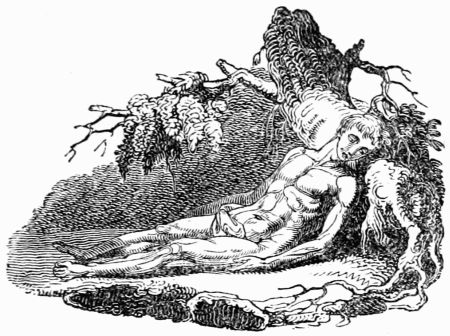 THE BELLY AND THE MEMBERS.
THE BELLY AND THE MEMBERS.
In former days, when the Belly and the other parts of the body enjoyed the faculty of speech, and had separate views and designs of their own, each part, it seems, in particular for himself, and in the name of the whole, took exception at the conduct of the Belly, and were resolved to grant him supplies no longer. They said they thought it very hard that he should lead an idle good-for-nothing life, spending and squandering away, upon his own ungodly guts, all the fruits of their labour; and that, in short, they were resolved for the future, to strike off his allowance, and let him shift for himself as well as he could. The Hands protested they would not lift up a[134] finger to keep him from starving; and the Mouth wished he might never speak again if he took in the least bit of nourishment for him as long as he lived; and, say the Teeth, may we be rotten if ever we chew a morsel for him for the future. This solemn league and covenant was kept as long as any thing of that kind can be kept, which was until each of the rebel members pined away to the skin and bone, and could hold out no longer. Then they found there was no doing without the Belly, and that, as idle and insignificant as he seemed, he contributed as much to the maintenance and welfare of all the other parts as they did to his.
APPLICATION.
This fable was spoken by Menenius Agrippa, a famous Roman consul and general, when he was deputed by the senate to appease a dangerous tumult and insurrection of the people. The many wars that nation was engaged in, and the frequent supplies they were obliged to raise, had so soured and inflamed the minds of the populace, that they were resolved to endure it no longer, and obstinately refused to pay the taxes which were levied upon them. It is easy to discern how the great man applied this fable. For, if the branches and members of a community refuse the government that aid which its necessities require, the whole must perish together. The rulers of a state, as idle and insignificant as they may sometimes[135] seem, are yet as necessary to be kept up and maintained in a proper and decent grandeur, as the family of each private person is in a condition suitable to itself. Every man's enjoyment of that little which he gains by his daily labour, depends upon the government's being maintained in a condition to defend and secure him in it.
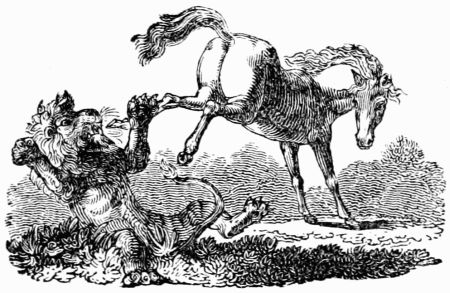 THE HORSE AND THE LION.
THE HORSE AND THE LION.
A Lion seeing a fine plump Nag, had a great mind to eat a bit of him, but knew not which way to get him into his power. At last he bethought himself of this contrivance: he gave out that he was a physician, who, having gained experience by his travels into foreign countries, had made himself capable of curing any sort of malady or distemper incident to any kind of beast, hoping by this stratagem to get an easier admittance among cattle, and find an opportunity to execute his design. The Horse, who smoked the matter, was resolved to be even with him; and, so humouring the thing, as if he suspected nothing, he prayed the Lion to give him his advice in relation to a thorn he had got in his foot, which had quite lamed him, and gave him[137] great pain and uneasiness. The Lion readily agreed and desired he might see the foot. Upon which the Horse lifted up one of his hind legs, and, while the Lion pretended to be poring earnestly upon his hoof, gave him such a kick in the face as quite stunned him, and left him sprawling upon the ground. In the mean time the Horse trotted away, neighing and laughing merrily at the success of the trick, by which he had defeated the purpose of one who intended to have tricked him out of his life.
APPLICATION.
Though all manner of fraud and tricking is mean, and utterly beneath a man of sense and honour, yet, methinks, equity itself allows us to disappoint the deceiver, and to repel craft by cunning. Treachery has something so wicked and worthy of punishment in its nature, that it deserves to meet with a return of its own kind: an open revenge would be too liberal for it, and nothing matches it but itself. However, therefore, abominable it is to be the aggressor in this point, yet it cannot be inconsistent with virtue to counterplot and to take all manner of advantage against the man who is undermining us.
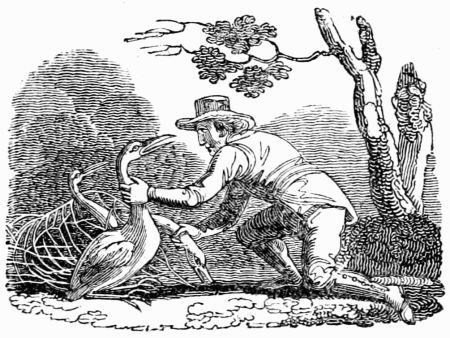 THE HUSBANDMAN AND THE STORK.
THE HUSBANDMAN AND THE STORK.
The Husbandman pitched a net in his fields to take the Cranes and Geese which came to feed upon the new-sown corn. Accordingly he took several, both Cranes and Geese; and among them a Stork, who pleaded hard for his life, and, among other apologies which he made, alleged, that he was neither Goose nor Crane, but a poor harmless Stork, who performed his duty to his parents to all intents and purposes, feeding them when they were old, and, as occasion required, carrying them from place to place upon his back.—'All this may be true,' replies the Husbandman; 'but, as I have taken you in bad company, and in the same crime, you must expect to suffer the same punishment.'
[139]APPLICATION.
If bad company had nothing else to make us shun and avoid it, this, methinks, might be sufficient, that it infects and taints a man's reputation, to as great a degree as if he were thoroughly versed in the wickedness of the whole gang. What is it to me if the thief who robs me of my money gives part of it to build a church? Is he ever the less a thief? Shall a woman's going to prayers twice a day save her reputation, if she is known to be a malicious lying gossip? No, such mixtures of religion and sin make the offence but the more flagrant, as they convince us that it was not committed out of ignorance. Indeed, there is no living without being guilty of some faults, more or less; which the world ought to be good-natured enough to overlook, in consideration of the general frailty of mankind, when they are not too gross and too abundant: but when we are so abandoned to stupidity, and a neglect of our reputation, as to keep bad company, however little we may be criminal in reality, we must expect the same censure and punishment as is due to the most notorious of our companions.
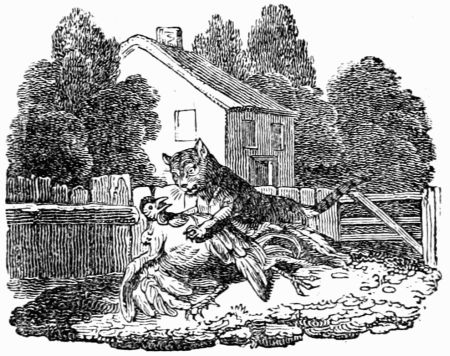 THE CAT AND THE COCK.
THE CAT AND THE COCK.
The Cat, having a mind to make a meal of the Cock, seized him one morning by surprise, and asked him what he could say for himself why slaughter should not pass upon him?—The Cock replied, that he was serviceable to mankind by crowing in the morning, and calling them up to their daily labour.—'That is true,' says the Cat, 'and is the very objection that I have against you; for you make such a shrill impertinent noise, that people cannot sleep for you. Besides you are an incestuous rascal, and make no scruple of lying with your mother and sisters.'—'Well,' says the Cock, 'this I do not deny; but I do it to procure eggs and chickens for my master.'—'Ah![141] villain,' says the Cat, 'hold your wicked tongue; such impieties as these declare that you are no longer fit to live.'
APPLICATION.
When a wicked man in power has a mind to glut his appetite in any respect, innocence, or even merit, is no protection against him. The cries of justice and the voice of reason are of no effect upon a conscience hardened in iniquity, and a mind versed in a long practice of wrong and robbery. Remonstrances, however reasonably urged, or movingly couched, have no more influence upon the heart of such a one, than the gentle evening breeze has upon the oak when it whispers among its branches, or the rising surges upon the deaf rock when they dash and break against its sides. Power should never be trusted in the hands of an impious selfish man, and one that has more regard to the gratification of his own unbounded avarice than to public peace and justice. Were it not for the tacit consent and heartless compliance of a great majority of fools, mankind would not be ridden, as oftentimes they are, by a little majority of knaves, to their great misfortune: for, whatever people may think of the times, if they were ten times worse than they are, it is principally owing to their own stupidity. Why do they trust the man a moment longer who has once injured and betrayed them?
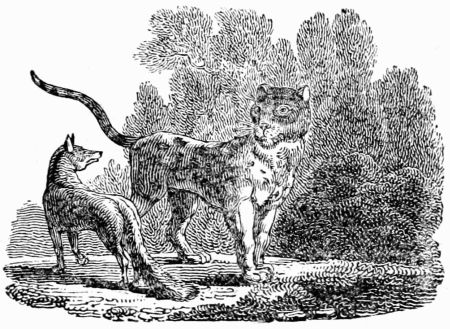 THE LEOPARD AND THE FOX.
THE LEOPARD AND THE FOX.
The Leopard one day took it into his head to value himself upon the great variety and beauty of his spots, and truly he saw no reason why even the Lion should take place of him, since he could not show so beautiful a skin. As for the rest of the wild beasts of the forest, he treated them all, without distinction, in the most haughty disdainful manner. But the Fox being among them, went up to him with a great deal of spirit and resolution, and told him, that he was mistaken in the value he was pleased to set upon himself; since people of judgment were not used to form their opinion of merit from an outside appearance, but by considering the good qualities and endowments with which the mind was stored within.
[143]APPLICATION.
How much more heavenly and powerful would beauty prove, if it were not so frequently impaired by the affectation and conceitedness of its possessor! If some women were but as modest and unassuming as they are handsome, they might command the hearts of all that behold them: but Nature seemed to foresee, and has provided against such an inconvenience, by tempering its great master-pieces with a due proportion of pride and vanity; so that their power, depending upon the duration of their beauty only, is like to be but of a short continuance; which, when they happen to prove tyrants, is no small comfort to us; and then, even while it lasts, will abate much of its severity by the allay of those two prevailing ingredients. Wise men are chiefly captivated with the charms of the mind; and whenever they are infatuated with a passion for any thing else, it is generally observed that they cease, during that time at least, to be what they were, and are indeed looked upon to be only playing the fool. If the fair ones we have been speaking of have a true ascendant over them, they will oblige them to divest themselves of common sense, and to talk and act ridiculously, before they can think them worthy of the least regard. Should one of these fine creatures be addressed in the words of Juba,
'Tis not a set of features, or complexion,
[144]The tincture of a skin, that I admire.
Beauty soon grows familiar to the lover,
Fades in his eye, and palls upon the sense.
The virtuous Marcia towers above her sex.
True, she is fair; oh, how divinely fair!
But still the lovely maid improves her charms
With inward greatness, unaffected wisdom,
And sanctity of manners.——
The man that should venture the success of a strong passion upon the construction she would put upon such a compliment, might have reason to repent of his conduct.
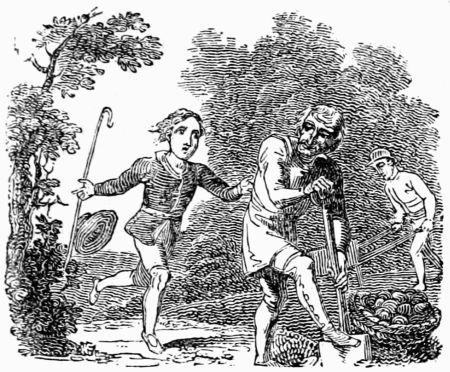 THE SHEPHERD'S BOY.
THE SHEPHERD'S BOY.
A certain Shepherd's Boy kept his Sheep upon a common, and, in sport and wantonness, would often cry out, The Wolf! The Wolf! By this means he several times drew the Husbandmen, in an adjoining field, from their work; who, finding themselves deluded, resolved for the future to take no notice of his alarm. Soon after the Wolf came indeed. The Boy cried out in earnest: but no heed being given to his cries, the Sheep were devoured by the Wolf.
APPLICATION.
He that is detected for being a notorious liar, besides the ignominy and reproach of the thing, incurs this mischief, that he will scarce be able to[146] get any one to believe him again as long as he lives. However true our complaint may be, or how much soever it may be for our interest to have it believed, yet, if we have been frequently caught tripping before, we shall hardly be able to gain credit to what we relate afterwards. Though mankind are generally stupid enough to be often imposed upon, yet few are so senseless as to believe a notorious liar, or to trust a cheat upon record. These little shams, when found out, are sufficiently prejudicial to the interest of every private person who practises them. But, when we are alarmed with imaginary dangers in respect of the public, till the cry grows quite stale and threadbare, how can it be expected we should know when to guard ourselves against real ones.
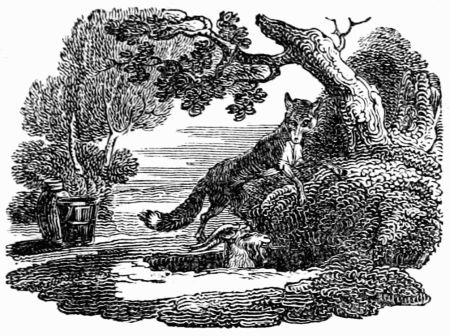 THE FOX AND THE GOAT.
THE FOX AND THE GOAT.
A Fox, having tumbled by chance into a Well, had been casting about a long while, to no purpose, how he should get out again; when at last a Goat came to the place, and, wanting to drink, asked Reynard whether the water was good. 'Good!' says he; 'ay, so sweet, that I am afraid I have surfeited myself, I have drank so abundantly.' The Goat upon this, without any more ado, leaped in; and the Fox, taking the advantage of his horns, by the assistance of them as nimbly leaped out, leaving the poor Goat at the bottom of the Well to shift for himself.
APPLICATION.
The doctrine taught us by this fable is no more than this, that we ought to consider who it is that[148] advises us before we follow the advice: for, however plausible the counsel may seem, if the person that gives it is a crafty knave, we may be assured that he intends to serve himself in it more than us, if not to erect something to his own advantage out of our ruin.
The little, poor, country attorney, ready to perish, and sunk to the lowest depth of poverty for want of employment, by such arts as these draws the esquire, his neighbour, into the gulf of the law; till, laying hold on the branches of his revenue, he lifts himself out of obscurity, and leaves the other immured in the bottom of a mortgage.
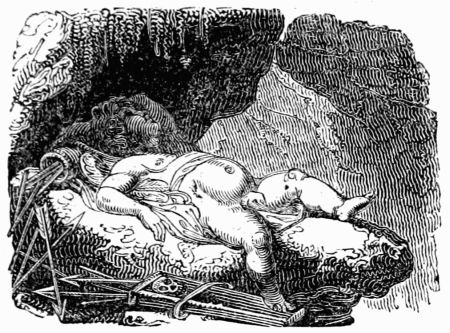 CUPID AND DEATH.
CUPID AND DEATH.
Cupid, one sultry summer's noon, tired with play, and faint with heat, went into a cool grotto to repose himself, which happened to be the cave of Death. He threw himself carelessly down on the floor, and his quiver turning topsy-turvy, all the arrows fell out, and mingled with those of Death, which lay scattered up and down the place. When he awoke, he gathered them up as well as he could; but they were so intermingled that, though he knew the certain number, he could not rightly distinguish them; from which it happened that he took up some of the arrows which belonged to Death, and left several of his own in the room of them. This is the cause that we, now and then, see the hearts of the old and decrepit transfixed with the bolts of Love; and with equal grief and surprise behold the youthful[150] blooming part of our species smitten with the darts of Death.
APPLICATION.
If we allow for this fable's being written by a heathen, and according to the scheme of the ancient pagan theology, it will appear to be a pretty probable solution of some parts of the dispensation of Providence, which otherwise seem to be obscure and unaccountable. For, when we see the young and the old fall promiscuously by the hand of Death, and at the same time consider that the world is governed by an all-wise Providence, we are puzzled how to account for so seemingly preposterous and unnatural a way of working. We should look upon a gardener to be mad, or at least very capricious, who, when his young trees are just arrived to a degree of bearing, should cut them down for fuel, and choose out old, rotten, decayed, sapless stocks to graft and inoculate upon: yet the irregular proceedings of those two levellers, Love and Death, appear to be every jot as odd and unreasonable. However, we must take it for granted that these things, though the method of them is hidden from our eyes, are transacted after the most just and fit manner imaginable: but, humanly speaking, it is strange that Death should be suffered to make such undistinguished havoc in the world; and, at the same time, just as shocking and unnatural to see old age laid betwixt a pair of wedding sheets, as it is for youth and beauty to be locked up in the cold embraces of the grave.
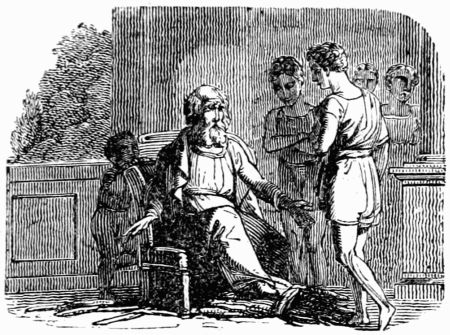 THE OLD MAN AND HIS SONS.
THE OLD MAN AND HIS SONS.
An Old Man had many Sons, who were often falling out with one another. When the Father had exerted his authority, and used other means in order to reconcile them, and all to no purpose, at last he had recourse to this expedient: he ordered his Sons to be called before him, and a short bundle of sticks to be brought; and then commanded them, one by one, to try if, with all their might and strength, they could any of them break it. They all tried, but to no purpose; for the sticks being closely and compactly bound up together, it was impossible for the force of man to do it. After this the Father ordered the bundle to be untied, and gave a single stick to each of his Sons; at the same time bidding him try to break it: which, when each did with all[152] imaginable ease, the Father addressed himself to them to this effect—'O my Sons, behold the power of unity! For if you, in like manner, would but keep yourselves strictly conjoined in the bonds of friendship, it would not be in the power of any mortal to hurt you; but when once the ties of brotherly affection are dissolved, how soon do you fall to pieces, and are liable to be violated by every injurious hand that assaults you!'
APPLICATION.
Nothing is more necessary towards completing and continuing the well-being of mankind, than their entering into and preserving friendships and alliances. The safety of a government depends chiefly upon this; and therefore it is weakened and exposed to its enemies, in proportion as it is divided by parties. "A kingdom divided against itself, is brought to desolation:" and the same holds good among all societies and corporations of men, from the constitution of the nation down to every little parochial vestry. But the necessity of friendship extends itself to all sorts of relations in life, as it conduces mightily to the advantage of particular clans and families. Those of the same blood and lineage have a natural disposition to unite together, which they ought by all means to cultivate and improve. It must be a great comfort to people, when they fall under any calamity, to know there are many others who sympathize with them; a great load of grief is mightily lessened, when it is parcelled out into[153] many shares. And then joy, of all our passions, loves to be communicative, and generally increases in proportion to the number of those who partake of it with us. We defy the threats and malice of an enemy, when we are assured that he cannot attack us single, but must encounter a bundle of allies at the same time. But they that behave themselves so as to have few or no friends in the world, live in perpetual fear and jealousy of mankind, because they are sensible of their own weakness, and know themselves liable to be crushed, or broken to pieces, by the first aggressor.
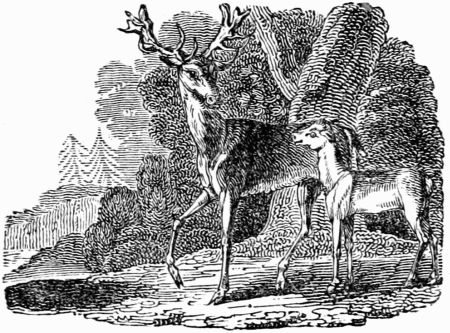 THE STAG AND THE FAWN.
THE STAG AND THE FAWN.
A Stag, grown old and mischievous, was, according to custom, stamping with his foot, making offers with his head, and bellowing so terribly, that the whole herd quaked for fear of him: when one of the little Fawns coming up, addressed him to this purpose—'Pray, what is the reason that you, who are so stout and formidable at all other times, if you do but hear the cry of the hounds, are ready to fly out of your skin for fear?'—'What you observe is true,' replied the Stag, 'though I know not how to account for it: I am indeed vigorous, and able enough, I think, to make my party good any where, and often resolve with myself, that nothing shall ever dismay my courage for the future; but, alas! I no sooner hear the voice of a hound but all my spirits fail[155] me, and I cannot help making off as fast as ever my legs can carry me.'
APPLICATION.
This is the case of many a cowardly bully in the world. He is disposed to be imperious and tyrannical, and to insult his companions, and takes all opportunities of acting according to his inclination; but yet is cautious where he makes his haunts, and takes care to have to do only with a herd of rascally people, as vile and mean as himself. A man of courage quashes him with a word; and he who has threatened death in every sentence, for a twelvemonth together, to those whom he knew it would affright, at the very frown of an intrepid man has leaped out of a window. It is no unpleasant sight to be present when any of these gentlemen happen to be disarmed of their terror before the face of their humble admirers: there is a strange boisterous struggle betwixt fear, shame, and revenge, which blinds them with confusion; and, though they would fain exert a little courage, and show themselves men, yet, they know not how; there is something within which will not suffer them to do it. The predominance of nature will show itself, upon occasion, in its true colours, through all the disguises which artful men endeavour to throw over it. Cowardice, particularly, gives us but the more suspicion when it would conceal itself under an affected fierceness; as they who would smother an ill smell by a cloud of perfume,[156] are imagined to be but the more offensive. When we have done all, Nature will remain what she was, and show herself whenever she is called upon; therefore whatever we do in contradiction to her laws, is so forced and affected, that it must needs expose and make us ridiculous. We talk nonsense when we would argue against it: like Teague, who being asked why he fled from his colours, said, his heart was as good as any in the regiment; but protested his cowardly legs would run away with him whatever he could do.
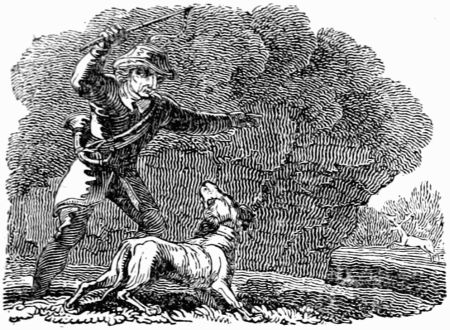 THE OLD HOUND.
THE OLD HOUND.
An Old Hound, who had been an excellent good one in his time, and given his master great sport and satisfaction in many a chase, at last, by the effect of years, became feeble and unserviceable. However, being in the field one day, when the stag was almost run down, he happened to be the first that came in with him, and seized him by one of his haunches; but, his decayed and broken teeth not being able to keep their hold, the deer escaped, and threw him quite out. Upon which his master, being in a great passion, and going to strike him, the honest old creature is said to have barked out his apology—'Ah! do not strike your poor old servant; it is not my heart and inclination, but my strength and speed, that fail me. If what I now am displeases, pray don't forget what I have been.'
APPLICATION.
This fable may serve to give us a general view[158] of the ingratitude of the greatest part of mankind. Notwithstanding all the civility and complaisance that is used among people where there is a common intercourse of business, yet let the main spring, the probability of their being serviceable to each other, either in point of pleasure or profit, be but once broken, and farewell courtesy: so far from continuing any regard in behalf of past favours, it is very well if they forbear doing any thing that is injurious. If the master had only ceased to caress and make much of the Old Hound, when he was past doing any service, it had not been very strange; but to treat a poor creature ill, not for a failure of inclination, but merely a defect of nature, must, notwithstanding the crowd of examples there are to countenance it, be pronounced inhuman and unreasonable.
There are two accounts upon which people that have been useful are frequently neglected. One, when they are so decayed, either through age or some accident, that they are no longer able to do the services they have formerly done; the other, when the occasion or emergency which required such talents no longer exists. Phædrus, who more than once complains of the bad consequences of age, makes no other application to this fable than by telling his friend Philetus, with some regret, that he wrote it with such a view; having, it seems, been repaid with neglect, or worse usage, for services done in his youth to those who were then able to afford him a better recompense.
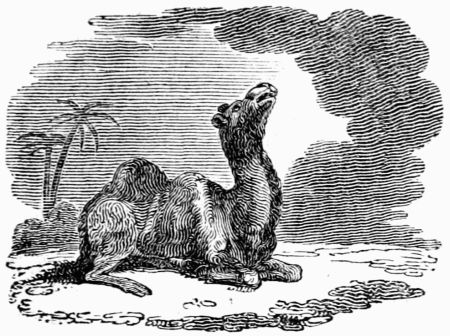 JUPITER AND THE CAMEL.
JUPITER AND THE CAMEL.
The Camel presented a petition to Jupiter, complaining of the hardship of his case in not having, like bulls and other creatures, horns, or any weapons of defence, to protect himself from the attacks of his enemies, and praying that relief might be given him in such manner as might be thought most expedient. Jupiter could not help smiling at the impertinent address of the great silly beast, but, however, rejected the petition; and told him that, so far from granting his unreasonable request, henceforward he would take care his ears should be shortened, as a punishment for his presumptuous importunity.
APPLICATION.
The nature of things is so fixed in every particular, that they are very weak superstitious people[160] who dream it is to be altered. But, besides the impossibility of producing a change by addresses of this nature, they who employ much of their time upon such accounts, instead of getting, are sure to lose in the end. When any man is so frivolous and vexatious as to make unreasonable complaints, and to harbour undue repinings in his heart, his peevishness will lessen the real good which he possesses, and the sourness of his temper shorten that allowance of comfort which he already thinks too scanty. Thus, in truth, it is not Providence, but ourselves who punish our own importunity in soliciting for impossibilities, with a sharp corroding care, which abridges us of some part of that little pleasure which Providence has cast into our lot.
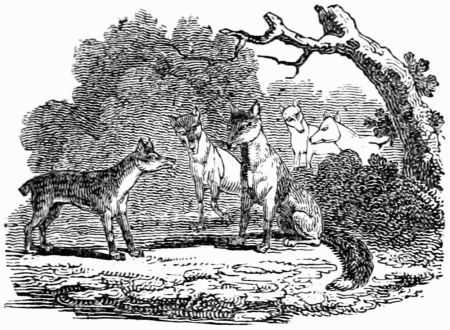 THE FOX WITHOUT A TAIL.
THE FOX WITHOUT A TAIL.
A Fox, being caught in a steel trap by his tail, was glad to compound for his escape with the loss of it; but, upon coming abroad into the world, began to be so sensible of the disgrace such a defect would bring upon him, that he almost wished he had died rather than left it behind him. However, to make the best of a bad matter, he formed a project in his head to call an assembly of the rest of the Foxes, and propose it for their imitation, as a fashion which would be very agreeable and becoming. He did so, and made a long harangue upon the unprofitableness of tails in general, and endeavoured chiefly to show the awkwardness and inconvenience of a Fox's tail in particular: adding, that it would be both more graceful and more expeditious to be altogether[162] without them; and that, for his part, what he had only imagined and conjectured before, he now found by experience; for that he never enjoyed himself so well, and found himself so easy as he had done since he cut off his tail. He said no more, but looked about with a brisk air, to see what proselytes he had gained; when a sly old thief in the company, who understood trap, answered him with a leer—'I believe you may have found a conveniency in parting with your tail, and when we are in the same circumstances, perhaps we may do so too.'
APPLICATION.
If men were but generally as prudent as Foxes, they would not suffer so many silly fashions to obtain as are daily brought in vogue, for which scarce any reason can be assigned besides the humour of some conceited vain creature; unless, which is full as bad, they are intended to palliate some defect in the person that introduces them. The petticoat of a whole sex has been sometimes swelled to such a prodigious extent, to screen an enormity of which only one of them has been guilty. And it is no wonder that Alexander the Great could bring a wry-neck into fashion, in a nation of slaves, when we consider what power of this nature some little, insignificant, dapper fellows have had among a free people.[163]
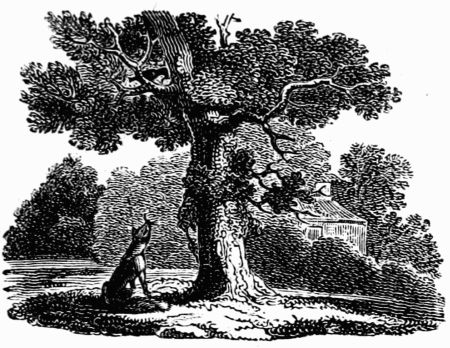 THE FOX AND THE CROW.
THE FOX AND THE CROW.
A Crow having taken a piece of cheese out of a cottage window, flew up into a high tree with it, in order to eat it; which a Fox observing, came and sat underneath, and began to compliment the Crow upon the subject of her beauty. 'I protest,' says he, 'I never observed it before, but your feathers are of a more delicate white than any that ever I saw in my life! Ah; what a fine shape and graceful turn of body is there! And I make no question but you have a tolerable voice. If it is but as fine as your complexion, I do not know a bird that can pretend to stand in competition with you.' The Crow, tickled with this very civil language, nestled and riggled about, and hardly knew where she was; but thinking the Fox a little dubious as to the particular of[164] her voice, and having a mind to set him right in that matter, began to sing, and in the same instant let the cheese drop out of her mouth. This being what the Fox wanted, he chopped it up in a moment, and trotted away, laughing to himself at the easy credulity of the Crow.
APPLICATION.
They that love flattery (as it is to be feared too many do) are in a fair way to repent of their foible in the long run. And yet how few are there among the whole race of mankind who may be said to be full proof against its attacks! The gross way by which it is managed by some silly practitioners, is enough to alarm the dullest apprehension, and make it to value itself upon the quickness of its insight into the little plots of this nature: but let the ambuscade be disposed with due judgment, and it will scarce fail of seizing the most guarded heart. How many are tickled to the last degree with the pleasure of flattery, even while they are applauded for their honest detestation of it! There is no way to baffle the force of this engine but by every one's examining, impartially for himself, the true estimate of his own qualities: if he deals sincerely in the matter, nobody can tell so well as himself what degree of esteem ought to attend any of his actions, and therefore he should be entirely easy as to the opinion men are like to have of them in the world. If they attribute more to him than is his due, they are either designing or mistaken: if[165] they allow him less, they are envious, or, possibly, still mistaken; and, in either case, are to be despised or disregarded. For he that flatters, without designing to take advantage of it, is a fool; and whoever encourages that flattery which he has sense enough to see through, is a vain coxcomb.
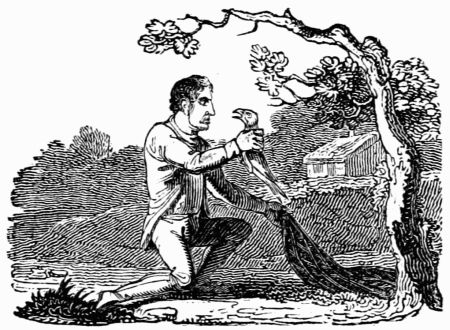 THE HAWK AND THE FARMER.
THE HAWK AND THE FARMER.
A Hawk, pursuing a Pigeon over a corn-field with great eagerness and force, threw himself into a net which a husbandman had planted there to take the Crows; who being employed not far off, and seeing the Hawk fluttering in the net, came and took him: but, just as he was going to kill him, the Hawk besought him to let him go, assuring him that he was only following a Pigeon, and neither intended nor had done any harm to him. To whom the Farmer replied—'And what harm had the poor Pigeon done to you?' Upon which he wrung his head off immediately.
APPLICATION.
Passion, prejudice, or power, may so far blind a man as not to suffer him justly to distinguish whether he is not acting injuriously at the same[167] time that he fancies he is only doing his duty. Now the best way of being convinced, whether what we do is reasonable and fit, is to put ourselves in the place of the persons with whom we are concerned, and then consult our conscience about the rectitude of our behaviour. For this we may be assured of, that we are acting wrong whenever we are doing any thing to another which we should think unjust if it was done to us. Nothing but an habitual inadvertency, as to this particular, can be the occasion that so many ingenious noble spirits are often engaged in courses so opposite to virtue and honour. He that would startle, if a little attorney should tamper with him to forswear himself, to bring off some small offender, some ordinary trespasser, will, without scruple, infringe the constitution of his country for the precarious prospect of a place or a pension. Which is most corrupt, he that lies, like a knight of the post, for half-a-crown and a dinner, or he that does it for the more substantial consideration of a thousand pounds a year? Which would be doing most service to the public, giving true testimony in a cause between two private men, and against one little common thief who has stolen a gold watch; or voting honestly and courageously against a rogue of state, who has gagged and bound the laws, and stripped the nation? Let those who intend to act justly, but view things in this light, and all would be well. There would be no danger of their oppressing others, or fear of being oppressed themselves.
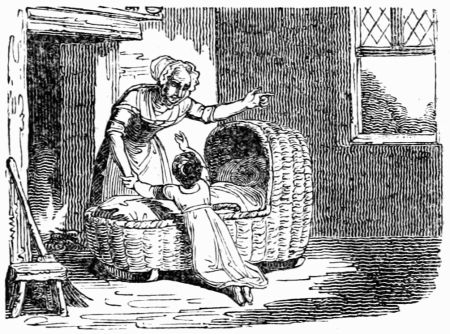 THE NURSE AND THE WOLF.
THE NURSE AND THE WOLF.
A nurse, who was endeavouring to quiet a froward bawling child, among other attempts, threatened to throw it out of doors to the Wolf, if it did not leave off crying. A Wolf, who chanced to be prowling near the door, just at that time, heard the expression, and believing the woman to be in earnest, waited a long while about the house, in expectation of seeing her words made good. But at last the child, wearied with its own importunities, fell asleep, and the poor Wolf was forced to return back to the woods empty and supperless. The Fox meeting him, and surprised to see him going home so thin and disconsolate, asked him what the matter was, and how he came to speed no better that night?—'Ah! do not ask me,' says he; 'I was so silly as[169] to believe what the Nurse said, and have been disappointed.'
APPLICATION.
All the moralists have agreed to interpret this fable as a caution to us never to trust a woman. What reasons they could have for giving so rough and uncourtly a precept, is not easy to be imagined: for, however fickle and unstable some women may be, it is well known there are several who have a greater regard for truth, in what they assert or promise, than most men. There is not room, in so short a compass, to express a due concern for the honour of the ladies upon this occasion, nor to show how much one is disposed to vindicate them: and, though there is nothing bad which can be said to them but may with equal justice be averred of the other sex, yet one would not venture to give them quite so absolute a precaution as the old mythologists have affixed to this fable; but only to advise them to consider well and thoroughly of the matter before they trust any man living.
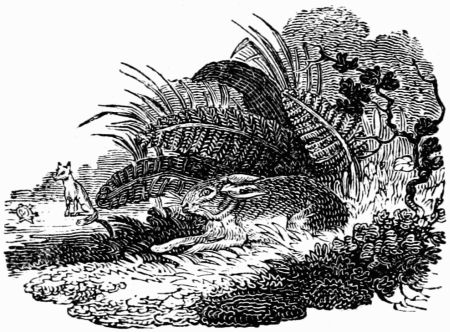 THE HARE AND THE TORTOISE.
THE HARE AND THE TORTOISE.
A Hare insulted a tortoise upon account of his slowness, and vainly boasted of her own great speed in running.—'Let us make a match,' replied the Tortoise; 'I will run with you five miles for five pounds, and the Fox yonder shall be the umpire of the race.' The Hare agreed; and away they both started together. But the Hare, by reason of her exceeding swiftness, outran the Tortoise to such a degree, that she made a jest of the matter; and, finding herself a little tired, squatted in a tuft of fern that grew by the way, and took a nap; thinking that, if the Tortoise went by, she could at any time fetch him up with all the ease imaginable. In the meanwhile the Tortoise came jogging on with slow[171] but continued motion; and the Hare, out of a too great security and confidence of victory, oversleeping herself, the Tortoise arrived at the end of the race first.
APPLICATION.
Industry and application to business makes amends for the want of a quick and ready wit. Hence it is, that the victory is not always to the strong, nor the race to the swift. Men of fine parts are apt to despise the drudgery of business; but, by affecting to show the superiority of their genius, upon many occasions, they run into too great an extreme the other way; and the administration of their affairs is ruined through idleness and neglect. What advantage has a man from the fertility of his invention, and the vivacity of his imagination, unless his resolutions are executed with a suitable and uninterrupted rapidity? In short, your men of wit and fire, as they are called, are oftentimes sots, slovens, and lazy fellows: they are generally proud and conceited to the last degree; and, in the main, not the fittest persons for either conversation or business. Such is their vanity, they think the sprightliness of their humour inconsistent with a plain sober way of thinking and speaking, and able to atone for all the little neglects of their business and persons. But the world will not be thus imposed upon; the man who would gain the esteem of others, and make his own fortune,[172] must be one that carries his point effectually, and finishes his course without swerving or loitering. Men of dull parts, and a slow apprehension, assisted by a continued diligence, are more likely to attain this than your brisk retailers of wit, with their affected spleen and indolence. And if business be but well done, no matter whether it be done by the sallies of a refined wit, or the considering head of a plain plodding man.
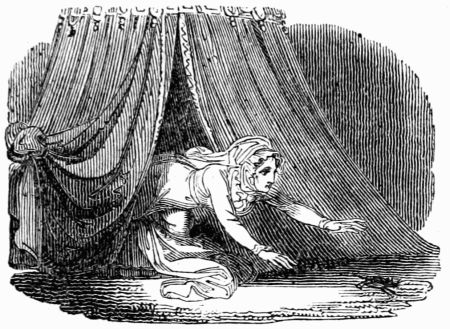 THE YOUNG MAN AND HIS CAT.
THE YOUNG MAN AND HIS CAT.
A certain Young Man used to play with a Cat, of which he grew so fond, that at last he fell in love with it, and to such a degree, that he could rest neither night nor day for the excess of his passion. At last he prayed to Venus, the goddess of beauty, to pity him, and relieve his pain. The good-natured goddess was propitious, and heard his prayers: before he rose up from kneeling, the Cat, which he held in his arms, was transformed into a beautiful girl. The Youth was transported with joy, and married her that very day. At night they went to bed, and as the new bride lay encircled in the embraces of her amorous husband, she unfortunately heard a Mouse behind the hangings, and sprung from his arms to pursue it. Venus, offended to see her sacred rites profaned[174] by such an indecent behaviour, and perceiving that her new convert, though a woman in outward appearance, was a Cat in her heart, she made her return to her old form again, that her manners and person might be agreeable to each other.
APPLICATION.
People, as to their manners and behaviour, take a strong bias from custom and education, but a much stronger from Nature. Her laws are so strong, that it is in vain for us to go to oppose them; we may refine and improve, but can never totally alter her works. Upon this account it is that we oftentimes see silly awkward blockheads displaying their idiotism and folly through all their ensigns of dignity; for some natures are so coarse and rustic, that all the embroidery of a court cannot conceal them. Doubtless such people were intended by Nature for nothing above driving Hogs to a fair, and laughing at the jokes of a country Merry Andrew. Fortune has found them worthy of her favours, and given them a lift out of the mire: but yet they do not fail to give frequent indications of their true composition, by a thousand little dirty actions. A fine equipage, and a great estate, may raise a man to an exalted station, and procure a respect to his outward person; notwithstanding which it may so happen, that every time he speaks and acts he cannot help playing the fool for the blood of him.
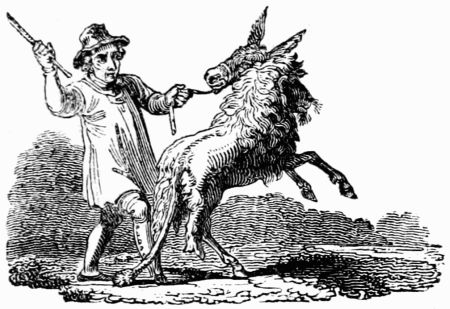 THE ASS IN THE LION'S SKIN.
THE ASS IN THE LION'S SKIN.
An Ass finding the skin of a Lion, put it on; and, going into the woods and pastures, threw all the flocks and herds into a terrible consternation. At last, meeting his owner, he would have frightened him also; but the good man, seeing his long ears slick out, presently knew him, and with a good cudgel made him sensible that, notwithstanding his being dressed in a Lion's Skin, he was really no more than an Ass.
APPLICATION.
As all affectation is wrong, and tends to expose and make a man ridiculous, so the more distant he is from the thing which he affects to appear, the stronger will the ridicule be which he excites, and the greater the inconveniences into which he runs himself thereby. How strangely absurd[176] it is for a timorous person to procure a military post in order to keep himself out of danger! and to fancy a red coat the surest protection for cowardice! yet there have been those who have purchased a commission to avoid being insulted; and have been so silly as to think courage was interwoven with a sash, or tied up in a cockade. But it would not be amiss for such gentlemen to consider, that it is not in the power of scarlet cloth to alter nature; and that, as it is expected a soldier should show himself a man of courage and intrepidity upon all proper occasions, they may, by this means, meet the disgrace they intended to avoid, and appear greater asses than they need to have done. However, it is not in point of fortitude only that people are liable to expose themselves, by assuming a character to which they are not equal; but he who puts on a show of learning, of religion, of a superior capacity in any respect, or, in short, of any virtue or knowledge to which he has no proper claim, is, and will always be found to be, "An Ass in a Lion's Skin."
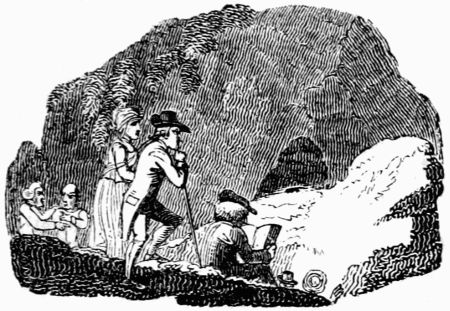 THE MOUNTAINS IN LABOUR.
THE MOUNTAINS IN LABOUR.
The Mountains were said to be in labour, and uttered most dreadful groans. People came together far and near to see what birth would be produced; and, after they wailed a considerable time in expectation, out crept a Mouse.
APPLICATION.
Great cry and little wool is the English proverb; the sense of which bears an exact proportion to this fable; by which are exposed all those who promise something exceeding great, but come off with a production ridiculously little. Projectors of all kinds, who endeavour by artificial rumours to raise the expectations of mankind, and then by their mean performances defeat and disappoint them, have, time out of mind, been lashed with the recital of this fable. How[178] agreeably surprising is it to see an unpromising favourite, whom the caprice of fortune has placed at the helm of state, serving the commonwealth with justice and integrity, instead of smothering and embezzling the public treasure to his own private and wicked ends! and, on the contrary, how melancholy, how dreadful, or rather, how exasperating and provoking a sight is it to behold one, whose constant declarations for liberty and the public good have raised people's expectations of him to the highest pitch, as soon as he is got into power exerting his whole art and cunning to ruin and enslave his country! The sanguine hopes of all those that wished well to virtue, and flattered themselves with a reformation of every thing that opposed the well-being of the community, vanish away in smoke, and are lost in a dark, gloomy, uncomfortable prospect.
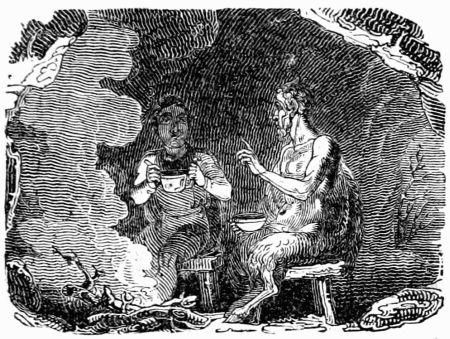 THE SATYR AND THE TRAVELLER.
THE SATYR AND THE TRAVELLER.
A Satyr, as he was ranging the forest in an exceeding cold snowy season, met with a Traveller, half-starved with the extremity of the weather. He took compassion on him, and kindly invited him home to a warm comfortable cave he had in the hollow of a rock. As soon as they had entered and sat down, notwithstanding there was a good fire in the place, the chilly Traveller could not forbear blowing his fingers' ends. Upon the Satyr's asking him why he did so, he answered, that he did it to warm his hands. The honest sylvan having seen little of the world, admired a man who was master of so valuable a quality as that of blowing heat, and therefore was resolved to entertain him in the best manner he could. He spread the table before him[180] with dried fruits of several sorts; and produced a remnant of cold cordial wine, which, as the rigour of the season made very proper, he mulled with some warm spices, infused over the fire, and presented to his shivering guest. But this the Traveller thought fit to blow likewise; and, upon the Satyr's demanding a reason why he blowed again, he replied, to cool his dish. This second answer provoked the Satyr's indignation as much as the first had kindled his surprise: so, taking the man by the shoulder, he thrust him out of doors, saying, he would have nothing to do with a wretch who had so vile a quality as to blow hot and cold with the same mouth.
APPLICATION.
Though the poor Traveller in the fable was not guilty of any real crime in what he did, yet one cannot help approving the honest simplicity of the Satyr, who could not be reconciled to such double dealing. In the moral sense of the fable, nothing can be more offensive to one of a sincere heart, than he that blows with a different breath from the same mouth; who flatters a man to his face, and reviles him behind his back. Some again, just like this man, to serve a present view, will blow nothing but what is warm, benevolent, and cherishing; and, when they have raised the expectations of a dependent to a degree which they think may prove troublesome, can, with putting on a cold air, easily chill and blast all his blooming hopes. But such a[181] temper, whether it proceeds from a designed or natural levity, is detestable, and has been the cause of much trouble and mortification to many a brave deserving man. Unless the tenor of a man's life be always true and consistent with itself, the less one has to do with him the better.
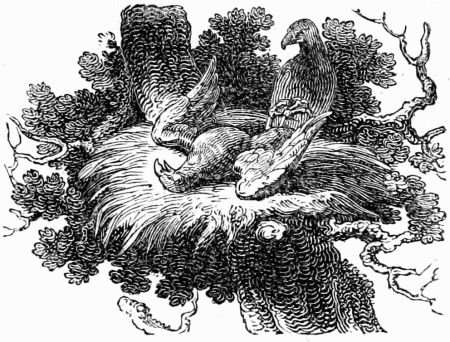 THE SICK KITE.
THE SICK KITE.
A Kite had been sick a long time, and finding there were no hopes of recovery, begged of his mother to go to all the churches and religious houses in the country, to try what prayers and promises would effect in his behalf. The old Kite replied—'Indeed, dear son, I would willingly undertake any thing to save your life, but I have great reason to despair of doing you any service in the way you propose: for, with what face can I ask any thing of the gods in favour of one whose whole life has been a continual scene of rapine and injustice, and who has not scrupled, upon occasion, to rob the very altars themselves?'
APPLICATION.
The rehearsal of this fable almost unavoidably draws our attention to that very serious and[183] important point, the consideration of a death-bed repentance. And, to expose the absurdity of relying upon such a weak foundation, we need only ask the same question with the Kite in the fable: how can he that has offended the gods all his life-time, by doing acts of dishonour and injustice, expect that they should be pleased with him at last, for no other reason but because he fears he shall not be able to offend them any longer? when, in truth, such a repentance can signify nothing but a confirmation of his former impudence and folly: for sure no stupidity can exceed that of the man who expects a future judgment, and yet can bear to commit any piece of injustice with a sense and deliberation of the fact.
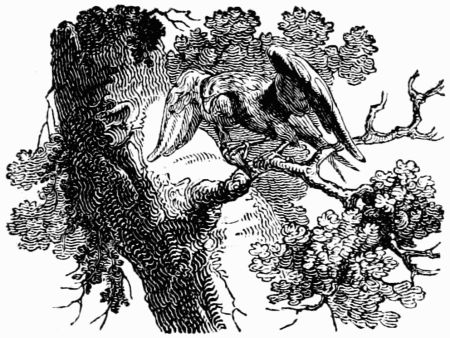 THE HAWK AND THE NIGHTINGALE.
THE HAWK AND THE NIGHTINGALE.
A Nightingale, sitting all alone among the shady branches of an oak, sung with so melodious and shrill a pipe, that she made the woods echo again, and alarmed a hungry Hawk, who was at some distance off watching for his prey; he had no sooner discovered the little musician, but, making a stoop at the place, he seized her with his crooked talons, and bid her prepare for death.—'Ah!' says she, 'for mercy's sake don't do so barbarous a thing, and so unbecoming yourself; consider, I never did you any wrong, and am but a poor small morsel for such a stomach as yours; rather attack some larger fowl, which may bring you more credit and a better meal, and let me go.'—'Aye!' says the Hawk, 'persuade me to it if you can: I have been upon the watch all day long, and have not met with one bit of any thing till I caught you; and now you would have me[185] let you go, in hopes of something better, would you? Pray, who would be the fool then?'
APPLICATION.
They who neglect the opportunity of reaping a small advantage, in hopes they shall obtain a better, are far from acting upon a reasonable and well-advised foundation. The figure of Time is always drawn with a single lock of hair hanging over his forehead, and the back part of his head bald; to put us in mind that we should be sure to lay hold of an occasion, when it presents itself to us, lest afterwards we repent us of our omission and folly, and would recover it when it is too late. It is a very weak reason to give for our refusal of an offer of kindness, that we do it because we desire or deserve a better; for it is time enough to relinquish the small affair when the great one comes, if ever it does come. But, supposing it should not, how can we forgive ourselves for letting any thing slip through our hands, by vainly gaping after something else, which we never could obtain? He who has not been guilty of any of these kind of errors, however poorly he may come off at last, has only the malice of fortune, or of somebody else, to charge with his ill success; and may applaud himself with some comfort, in never having lost an opportunity, though ever so small, of bettering and improving his circumstances. Unthinking people have oftentimes the unhappiness to fret and tease themselves with retrospects of this kind, which they, who attend to the business of life as they ought, never have occasion to make.
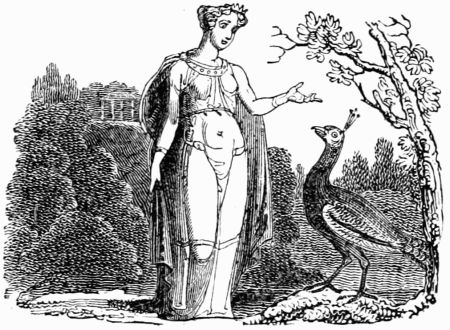 THE PEACOCK'S COMPLAINT.
THE PEACOCK'S COMPLAINT.
The Peacock presented a memorial to Juno, importing how hardly he thought he was used in not having so good a voice as the Nightingale; how that pretty animal was agreeable to every ear that heard it, while he was laughed at for his ugly screaming noise, if he did but open his mouth. The goddess, concerned at the uneasiness of her favourite bird, answered him very kindly to this purpose: 'If the Nightingale is blest with a fine voice, you have the advantage in point of beauty and largeness of person.'—'Ah!' says he, 'but what avails my silent unmeaning beauty, when I am so far excelled in voice!'—The goddess dismissed him, bidding him consider, that the properties of every creature were appointed by the decree of fate: to him beauty; strength to the Eagle; to the Nightingale a[187] voice of melody; the faculty of speech to the Parrot; and to the Dove innocence. That each of these was contented with his own peculiar quality; and unless he had a mind to be miserable, he must learn to be so too.
APPLICATION.
Since all things, as Juno says, are fixed by the eternal and unalterable decree of fate, how absurd it is to hear people complaining and tormenting themselves for that which it is impossible ever to obtain! They who are ambitious of having more good qualities, since that is impracticable, should spare for no pains to cultivate and recommend those they have; which a sourness and peevishness of temper, instead of improving, will certainly lessen and impair, whether they are of the mind or body. If we had all the desirable properties in the world, we could be no more than easy and contented with them; and if a man, by a right way of thinking, can reconcile himself to his own condition, whatever it be, he will fall little short of the most complete state that mortals ever enjoyed.
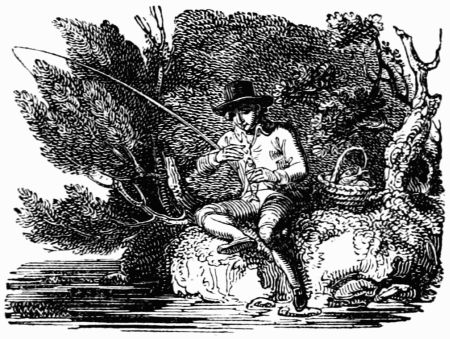 THE ANGLER AND THE LITTLE FISH.
THE ANGLER AND THE LITTLE FISH.
A man was angling in a river, and caught a small Perch; which, as he was taking off the hook and going to put into his basket, opened its mouth, and began to implore his pity, begging that he would throw it into the river again. Upon the man's demanding what reason he had to expect such a favour?—'Why,' says the Fish, 'because, at present, I am but young and little, and consequently not so well worth your while as I shall be if you take me some time hence, when I am grown larger.'—'That may be,' replies the man, 'but I am not one of those fools who quit a certainty, in expectation of an uncertainty.'
APPLICATION.
This fable points much the same way as the seventy-sixth, so that one moral may very well[189] serve for both. But the lesson they teach is so useful and instructive, that a repetition of it is by no means superfluous. The precept which they would instil into us is, never to let slip the present opportunity, but to secure to ourselves every little advantage, just in the nick that it offers, without a vain reliance upon, and fruitless expectation of, something better in time to come. We may cheer up our spirits with hoping for that which we cannot at present obtain; but at the same time let us be sure we give no occasion of condemning ourselves for omitting any thing which it was in our power to secure.
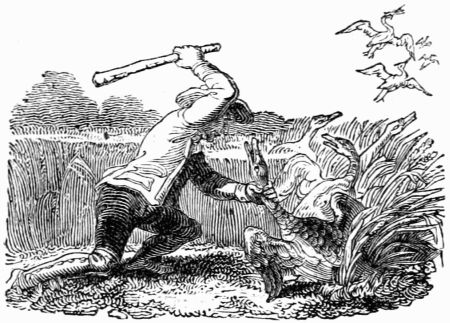 THE GEESE AND THE CRANES.
THE GEESE AND THE CRANES.
A flock of Geese and a parcel of Cranes used often to feed together in a corn field. At last the owner of the corn, with his servants, coming upon them of a sudden, surprised them in the very fact; and the geese, being heavy, fat, full-bodied creatures, were most of them sufferers; but the Cranes, being thin and light, easily flew away.
APPLICATION.
When the enemy comes to make a seizure, they are sure to suffer most whose circumstances are the richest and fattest. In any case of persecution, money hangs like a dead weight about a man; and we never feel gold so heavy as when we endeavour to make off with it. Therefore wise and politic ministers of state, whenever they[191] see a storm begin to gather over their heads, always take care to unlade themselves of a good part of their cargo; and, by this means, seldom find but the blasts of obloquy, through which they are to make their way, are less deaf and inexorable than the stormy waves of the ocean. Indeed, poverty is too frequently the occasion of mens' being treated as if they were guilty of the greatest crimes and reproaches; but then these sort of criminals have this advantage, that no one thinks fit to treat them with any thing worse than contempt: whereas if any pretence can be found to fall upon the man who is rich, it is a miracle if he escapes with both life and money. In short, riches are like the baggage of an army: very useful while we lie in quiet possession of the camp, or are powerful enough to defy the enemy; but when once we are put to the rout, if we would get off with our lives or liberties, we must quit our baggage as soon as possible, and leave it for plunder to our pursuers. Nay, however strongly intrenched we may think ourselves, as long as money is in the case, it is good to look about us for fear of a surprise: for, after all, he that does not, upon occasion, make himself wings with his riches to fly off with, deserves to be punished, like a Goose as he is, for his heaviness.
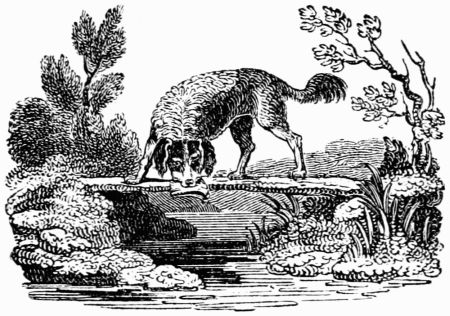 THE DOG AND THE SHADOW.
THE DOG AND THE SHADOW.
A Dog, crossing a little rivulet with a piece of flesh in his mouth, saw his own Shadow represented in the clear mirror of the limpid stream; and, believing it to be another dog, who was carrying another piece of flesh, he could not forbear catching at it; but was so far from getting any thing his greedy design, that he dropped the piece he had in his mouth, which immediately sunk to the bottom, and was irrecoverably lost.
APPLICATION.
He that catches at more than belongs to him justly deserves to lose what he has. Yet nothing is more common, and, at the same time, more pernicious, than this selfish principle. It prevails from the king to the peasant; and all orders and degrees of men are, more or less, infected with it.[193] Great monarchs have been drawn in, by this greedy humour, to grasp at the dominions of their neighbours; not that they wanted any thing more to feed their luxury, but to gratify their insatiable appetite for vain-glory. If the kings of Persia could have been contented with their own vast territories, they had not lost all Asia for the sake of a little petty state of Greece. And France, with all its glory, has, ere now, been reduced to the last extremity by the same unjust encroachments.
He that thinks he sees another's estate in a pack of cards, or a box and dice, and ventures his own in the pursuit of it, should not repine if he finds himself a beggar in the end.
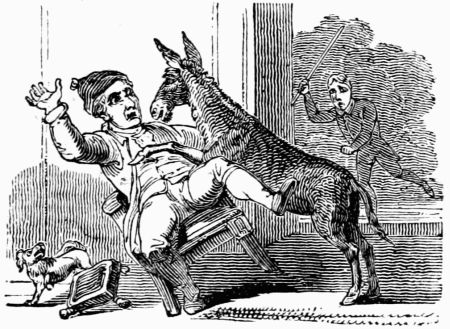 THE ASS AND THE LITTLE DOG.
THE ASS AND THE LITTLE DOG.
The Ass observing how great a favourite the Little Dog was with his master, how much caressed and fondled, and fed with good bits at every meal; and for no other reason, as he could perceive, but skipping and frisking about, wagging his tail, and leaping up into his master's lap; he was resolved to imitate the same, and see whether such a behaviour would not procure him the same favours. Accordingly, the master was no sooner come home from walking about his fields and gardens, and was seated in his easy chair, but the Ass, who observed him, came gamboling and braying towards him, in a very awkward manner. The master could not help laughing aloud at the odd sight. But his jest was soon turned into earnest, when he felt the[195] rough salute of the Ass's fore-feet, who, raising himself upon his hinder legs, pawed against his breast with a most loving air, and would fain have jumped into his lap. The good man, terrified at this outrageous behaviour, and unable to endure the weight of so heavy a beast, cried out; upon which, one of his servants running in with a good stick, and laying on heartily upon the bones of the poor Ass, soon convinced him that every one who desires it is not qualified to be a favourite.
APPLICATION.
Some men are as engaging in their ways as little dogs. They can fawn, wheedle, cringe, or, if occasion requires, leap backward and forward over a stick, to the great emolument of their master, and entertainment of those that behold them. But these are qualifications to which every body cannot pretend; and therefore none but those who have a genius for it should aspire at the employment. Many a man envies the happiness of these favourites, and would fain insinuate himself into the same good graces, if he did but know the way; but, whoever has a tolerable share of discretion, will distrust his abilities in this respect, and modestly forbear the attempt, for fear he should miscarry and look like an Ass. But, in short, the true moral of this fable is, that every one should consider the just turn and temper of his parts, and weigh the talents by which he hopes to be distinguished. After such an examination,[196] he may the more certainly know how to apply them to the most proper purposes; at least, so as not to hurt, or even mortify himself, by any mistaken address. Since there is such a variety of tempers in the world, and a no less multiplicity of arts and studies to fit and tally with them, how reasonable is it in general, and how much would it be for the true interest of every one in particular, if men would but be directed, by the natural bent of their genius, to such pursuits as are most agreeable to their capacities, and to the rudiments of education which they have most strongly imbibed.
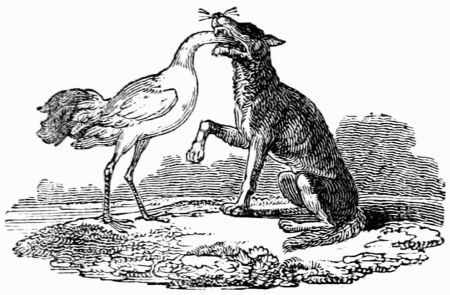 THE WOLF AND THE CRANE.
THE WOLF AND THE CRANE.
A Wolf, after devouring his prey, happened to have a bone stick in his throat, which gave him so much pain, that he went howling up and down, and importuning every creature he met to lend him a kind hand, in order to his relief; nay, he promised a reasonable reward to any one that should undertake the operation with success. At last the Crane, tempted with the lucre of the reward, and having first procured him to confirm his promise with an oath, undertook the business, and ventured his long neck into the rapacious felon's throat. In short, he plucked out the bone, and expected the promised gratuity. When the Wolf, turning his eyes disdainfully towards him, said,—'I did not think you had been so unconscionable; I had your head in my mouth, and could have bit it off whenever I pleased, but[198] suffered you to take it away without any damage, and yet you are not contented.'
APPLICATION.
There is a sort of people in the world, to whom a man may be in the wrong for doing services, upon a double score: first, because they never deserved to have a good office done them; and, secondly, because, when once engaged, it is so hard a matter to get well rid of their acquaintance.
This fable is not an example of ingratitude, as at first sight it seems to be, and as some of the mythologists have understood it; to make it a parallel in that case, the Crane ought to have been under some difficulties in his turn, and the Wolf have refused to assist him when it was in his power. The whole stress of it lies in this: that we ought to consider what kind of people they are to whom we are desired to do good offices, before we do them; for he that grants a favour, or even confides in a person of no honour, instead of finding his account in it, comes off well if he is no sufferer.
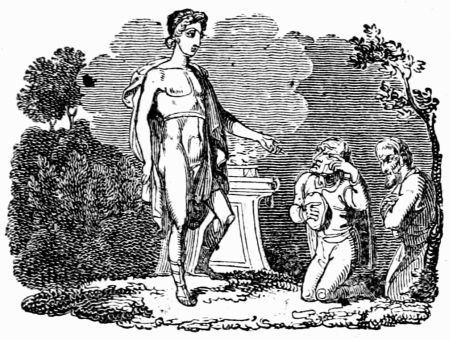 THE ENVIOUS MAN AND THE COVETOUS.
THE ENVIOUS MAN AND THE COVETOUS.
An Envious Man happened to be offering up his prayers to Jupiter just in the time and place with a Covetous Miserable Fellow. Jupiter, not caring to be troubled with their impertinences himself, sent Apollo to examine the merits of their petitions, and to give them such relief as he should think proper. Apollo therefore opened his commission, and withal told them that, to make short of the matter, whatever the one asked the other should have it double. Upon this, the Covetous Man, though he had a thousand things to request, yet forbore to ask first, hoping to receive a double quantity; for he concluded that all men's wishes sympathized with his. By this means, the Envious Man had an opportunity of preferring his petition first, which was the thing[200] he aimed at; so, without much hesitation, he prayed to be relieved, by having one of his eyes put out: knowing that, of consequence, his companion would be deprived of both.
APPLICATION.
In this fable the folly of those two vices, Envy and Avarice, is fully exposed, and handsomely rallied. The Miser, though he has the riches of the world, without stint, laid open to his choice, yet dares not name the sum, for fear another should be richer than himself. The advantage of a double quantity, by receiving last, is what he cannot bear to lose, and he fares accordingly. The Envious Man, though he has a power of calling for good things, without measure, to himself or others, yet waves this happy privilege, and is content to punish himself by a very great loss, even that of an eye, that he may bring down a double portion of the like calamity upon another. These are the true tempers of the covetous and envious; one can scarce determine, whether they are more mischievous to themselves, or to the public; but it is manifest, that they are highly noxious to both, and should be treated accordingly.
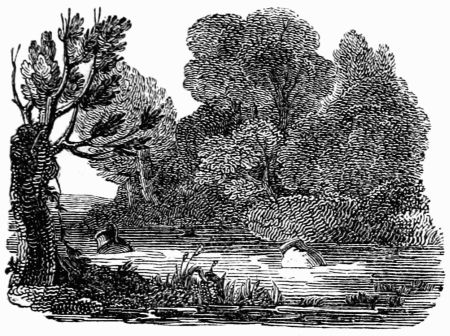 THE TWO POTS.
THE TWO POTS.
An Earthen Pot, and one of Brass, standing together upon the river's brink, were both carried away by the flowing-in of the tide. The Earthen Pot showed some uneasiness, as fearing he should be broken; but his companion of Brass bid him be under no apprehensions, for that he would take care of him.—'O,' replies the other, 'keep as far off as ever you can, I entreat you; it is you I am most afraid of: for, whether the stream dashes you against me, or me against you, I am sure to be the sufferer; and therefore, I beg of you, do not let us come near one another.'
APPLICATION.
A man of a moderate fortune, who is contented with what he has, and finds he can live happily[202] upon it, should take care not to hazard and expose his felicity by consorting with the great and the powerful. People of equal conditions may float down the current of life, without hurting each other; but it is a point of some difficulty to steer one's course in the company of the great, so as to escape without a bulge. One would not choose to have one's little country-box situated in the neighbourhood of a very great man; for whether I ignorantly trespass upon him, or he knowingly encroaches upon me, I only am like to be the sufferer. I can neither entertain nor play with him upon his own terms; for that which is moderation and diversion to him, in me would be extravagance and ruin.
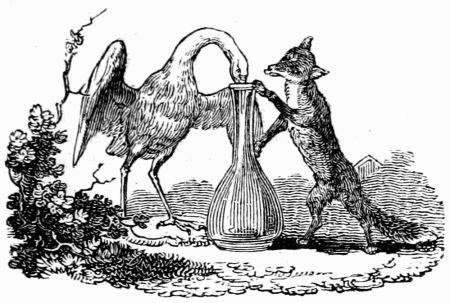 THE FOX AND THE STORK.
THE FOX AND THE STORK.
The Fox invited the Stork to dinner, and being disposed to divert himself at the expense of his guest, provided nothing for the entertainment but a soup, in a wide shallow dish. This himself could lap up with a great deal of ease; but the Stork, who could but just dip in the point of his bill, was not a bit the better all the while: however, in a few days after, he returned the compliment, and invited the Fox; but suffered nothing to be brought to table but some minced meat in a glass jar, the neck of which was so deep, and so narrow, that, though the Stork with his long bill made a shift to fill his belly, all that the Fox, who was very hungry, could do, was to lick the brim, as the Stork slabbered them with his eating. Reynard was heartily vexed at first; but, when he came to take his leave, owned[204] ingenuously, that he had been used as he deserved; and that he had no reason to take any treatment ill, of which himself had set the example.
APPLICATION.
It is mighty imprudent, as well as inhuman and uncivil, to affront any body; and whoever takes the liberty to exercise his witty talent that way, must not think much of it if he meets reprisals. Indeed, if all those who are thus paid in their own coin would take it with the same frankness the Fox did, the matter would not be much; but we are too apt, when the jest comes to be turned home upon ourselves, to think that insufferable in another, which we looked upon as pretty and facetious when the humour was our own. The rule of doing as we would be done by, so proper to be our model in every transaction of life, may more particularly be of use in this respect: because people seldom or never receive any advantage by these little ludicrous impositions; and yet, if they were to ask themselves the question, would find that another's using them in the same manner would be very displeasing.
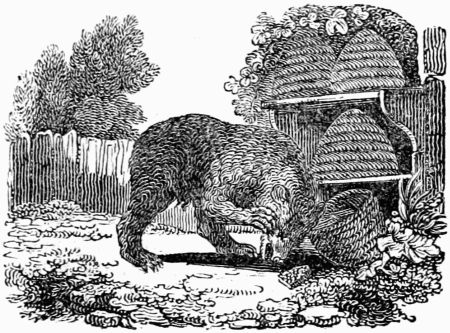 THE BEAR AND THE BEE HIVES.
THE BEAR AND THE BEE HIVES.
A Bear, climbing over the fence into a place where Bees were kept, began to plunder the Hives, and rob them of their honey. But the Bees, to revenge the injury, attacked him in a whole swarm together; and, though they were not able to pierce his rugged hide, yet, with their little stings, they so annoyed his eyes and nostrils, that, unable to endure the smarting pain, with impatience he tore the skin over his ears with his own claws, and suffered ample punishment for the injury he did the Bees in breaking open their waxen cells.
APPLICATION.
Many and great are the injuries of which some men are guilty towards others, for the sake of[206] gratifying some liquorish appetite. For there are those who would not stick at bringing desolation upon their country, and run the hazard of their own necks into the bargain, rather than baulk a wicked inclination, either of cruelty, ambition, or avarice. But it were to be wished all who are hurried by such blind impulses, would consider a moment before they proceed to irrevocable execution. Injuries and wrongs not only call for revenge and reparation with the voice of equity itself, but oftentimes carry their punishment along with them; and, by an unforeseen train of events, are retorted at the head of the actor of them; and not seldom, from a deep remorse, expiated upon himself by his own hand.
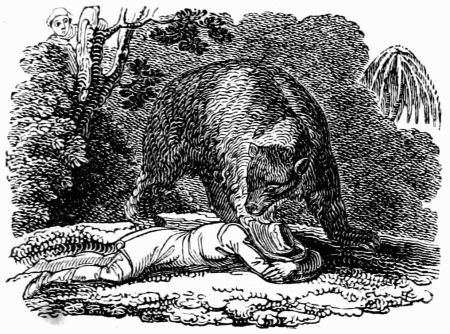 THE TRAVELLERS AND THE BEAR.
THE TRAVELLERS AND THE BEAR.
Two men being to travel through a forest together, mutually promised to stand by each other in any danger they should meet upon the way. They had not gone far before a Bear came rushing towards them out of a thicket; upon which one, being a light nimble fellow, got up into a tree; the other falling flat upon his face, and holding his breath, lay still while the Bear came up and smelled at him; but that creature, supposing him to be a dead carcass, went back again into the wood, without doing him the least harm. When all was over, the Spark who had climbed the tree came down to his companion, and, with a pleasant smile, asked him what the Bear said to him—'For,' says he, 'I took notice that he clapt his mouth very close to your ear.'——'Why,'[208] replies the other, 'he charged me to take care, for the future, not to put any confidence in such cowardly rascals as you.'
APPLICATION.
Though nothing is more common than to hear people profess services of friendship where there is no occasion for them, yet scarce any thing is so hard to be found as a true friend, who will assist us in time of danger and difficulty. All the declarations of kindness which are made to an experienced man, though accompanied by a squeeze of the hand, and a solemn asseveration, should leave no greater impression upon his mind than the whistling of the hollow breeze which brushes one's ear with an unmeaning salute, and is presently gone. He that succours our necessity by a well-timed assistance, though it were not ushered in by previous compliments, will ever after be looked upon as our friend and protector; and, in so much a greater degree, as the favour was unasked and unpromised; as it was not extorted by importunities on the one side, nor led in by a numerous attendance of promises on the other. Words are nothing till they are fulfilled by actions; and therefore we should not suffer ourselves to be deluded by a vain hope and reliance upon them.
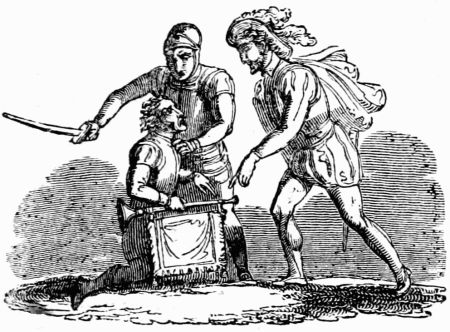 THE TRUMPETER TAKEN PRISONER.
THE TRUMPETER TAKEN PRISONER.
A trumpeter, being taken prisoner in a battle, begged hard for quarter, declaring his innocence, and protesting that he neither had nor could kill any man, bearing no arms but only his trumpet, which he was obliged to sound at the word of command.—'For that reason,' replied his enemies, 'we are determined not to spare you; for though you yourself never fight, yet, with that wicked instrument of yours, you blow up animosity between other people, and so become the occasion of much bloodshed.'
APPLICATION.
A man may be guilty of murder who has never handled a sword, or pulled a trigger, or lifted up his arm with any mischievous weapon. There is[210] a little incendiary, called the tongue, which is more venomous than a poisoned arrow, and more killing than a two-edged sword. The moral of the fable therefore is this, that if in any civil insurrection the persons taken in arms against the government deserve to die, much more do they whose devilish tongues gave birth to the sedition, and excited the tumult. When wicked priests, instead of preaching peace and charity, employ that engine of scandal their tongue to foment rebellions, whether they succeed in their designs or no, they ought to be severely punished; for they have done what in them lay to set folks together by the ears; they have blown the trumpet and sounded the alarm, and if thousands are not destroyed by the sword, it is none of their fault.
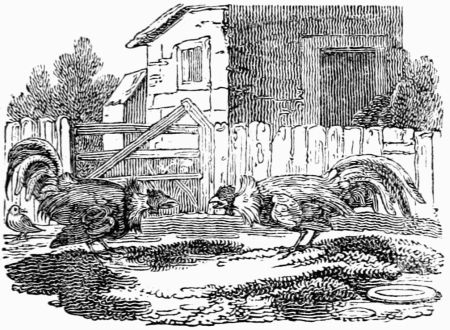 THE PARTRIDGE AND THE COCKS.
THE PARTRIDGE AND THE COCKS.
A certain man, having taken a Partridge, plucked some of the feathers out of its wings, and turned it into a little yard, where he kept game Cocks. The Cocks, for awhile, made the poor bird lead a sad life, continually pecking and driving it away from the meat. This treatment was taken the more unkindly, because offered to a stranger; and the Partridge could not but conclude them the most inhospitable uncivil people he had ever met with. But at last, observing how frequently they quarrelled and fought with each other, he comforted himself with this reflection; that it was no wonder they were so cruel to him, since there was so much bickering and animosity among themselves.
[212]APPLICATION.
This fable comes home to ourselves, we of this island having always been looked upon as cruel to strangers. Whether there is any thing in the manner of our situation, as an island, which consequently can be no thoroughfare to other countries, and so is not made use of by strangers upon that account, which makes us thus shy and uncivil; or, whether it be a jealousy upon account of our liberties, which puts us upon being suspicious of, and unwilling to harbour any that are not members of the same community, perhaps it would not be easy to determine. But that it is so in fact, is too notorious to be denied; and probably can be accounted for no better way than from the natural bent of our temper, as it proceeds from something peculiar to our air and climate. It has been affirmed, that there is not in the whole world besides a breed of Cocks and Dogs so fierce and incapable of yielding as that of ours; but that either of them, carried into foreign countries, would degenerate in a few years. Why may not the same be true of our men? But if strangers find any inconvenience in this, there is a comfortable consideration to balance it on the other side, which is, that there are no people under the sun so much given to division and contention among themselves as we are. Can a stranger think it hard to be looked upon with some shyness, when he beholds how little we spare one another? Was ever any foreigner,[213] merely for being a foreigner, treated with half that malice and bitterness which differing parties express towards each other? One would willingly believe that this proceeds in the main, on both sides, from a passionate concern for our liberties and well-being; for there is nothing else which can so well excuse it. But it cannot be denied, that our aversion, notwithstanding our being a trading nation, to have any intercourse with strangers, is so great, that when we want other objects for our churlishness, we raise them up among ourselves; and there is, sometimes, as great a strangeness kept up between one county and another here, as there is between two distinct kingdoms abroad. One cannot so much wonder at the constant hostilities which are observed between the inhabitants of South and North Britain, of Wales and Ireland, among one another, when a Yorkshireman shall be looked upon as a foreigner by a native of Norfolk, and both be taken for outlandish intruders by one that happens to be born within the bills of mortality.
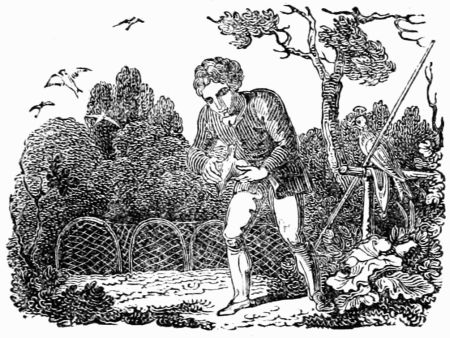 THE FALCONER AND THE PARTRIDGE.
THE FALCONER AND THE PARTRIDGE.
A falconer having taken a Partridge in his net, the bird begged hard for a reprieve, and promised the man, if he would let him go, to decoy other Partridges into his net.—'No,' replies the Falconer, 'I was before determined not to spare you, but now you have condemned yourself by your own words: for he who is such a scoundrel as to offer to betray his friends to save himself, deserves, if possible, worse than death.'
APPLICATION.
However it may be convenient for us to like the treason, yet we must be very destitute of honour not to hate and abominate the traitor.[215] And accordingly history furnishes us with many instances of kings and great men who have punished the actors of treachery with death, though the part they acted had been so conducive to their interests as to give them a victory, or perhaps the quiet possession of a throne. Nor can princes pursue a more just maxim than this; for a traitor is a villain of no principles, that sticks at nothing to promote his own selfish ends; he that betrays one cause for a great sum of money, will betray another upon the same account; and therefore it must be very impolitic in a state to suffer such wretches to live in it. Since then this maxim is so good, and so likely at all times to be practised, what stupid rogues must they be who undertake such precarious dirty work! If they miscarry, it generally proves fatal to them from one side or other; if they succeed, perhaps they may have the promised reward, but are sure to be detested, if suffered to live, by the very person that employs them.
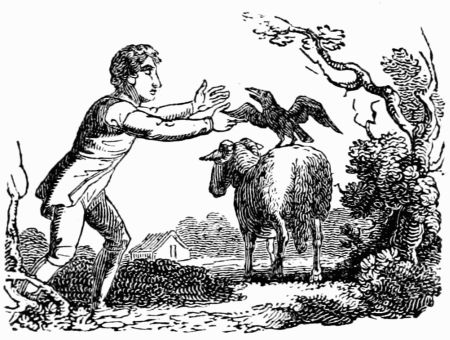 THE EAGLE AND THE CROW.
THE EAGLE AND THE CROW.
An Eagle flew down from the top of a high rock, and settled upon the back of a Lamb; and then instantly flying up into the air again, bore his bleating prize aloft in his pounces. A Crow, who sat upon an elm, and beheld this exploit, resolved to imitate it; so flying down upon the back of a Ram, and entangling his claws in the wool, he fell a chattering and attempting to fly; by which means he drew the observation of the Shepherd upon him, who finding his feet hampered in the fleece of the Ram, easily took him, and gave him to his boys for their sport and diversion.
APPLICATION.
Every quality which is excellent and commendable, is not, however, always a proper object[217] for our imitation. We ought to state our own account honestly and fairly, that we may see what our abilities are, and how our circumstances stand; otherwise we may not only become ridiculous to others, but prejudicial to ourselves, by some awkward and ill-judged emulation, though it happen to be in a qualification truly laudable and great. It behoves every man to exert a good share of industry towards the advancement of his interest, or, if he pleases, of his reputation. But then it is highly necessary that he does this with a true regard to his own capacity, and without any danger of exposing or embarrassing himself in the operation.
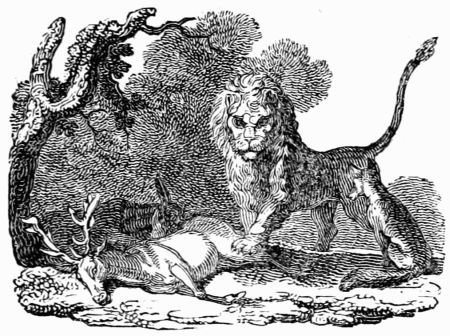 THE LION, THE ASS, AND THE FOX.
THE LION, THE ASS, AND THE FOX.
The Lion, the Ass, and the Fox went a hunting together in the forest; and it was agreed, that whatever was taken should be divided amongst them. They happened to have very good sport, and caught a large fat Stag, which the Lion ordered the Ass to divide. The Ass, according to the best of his capacity, did so, and made three pretty equal shares. But such levelling doings not suiting at all with the craving temper of the greedy Lion, without farther delay he flew upon the Ass, and tore him in pieces; and then bid the Fox divide it into two parts. Reynard, who seldom wanted a prompter, however, had his cue given him sufficiently upon this occasion; and so nibbling off one little bit for himself, he laid forth all the rest for the Lion's portion. The[219] royal brute was so delighted at this dutiful and handsome proof of his respect, that he could not forbear expressing the satisfaction it gave him; and asked him withal, where he could possibly have learned so proper and so courtly a behaviour?—'Why,' replies Reynard, 'to tell your majesty the truth, I was taught it by the Ass that lies dead there.'
APPLICATION.
We may learn a great deal of useful experience from the examples of other people, if we will but take the pains to observe them. And, besides the profit of the instructions, there is no small pleasure in being taught any proper science at the expense of somebody else. To this purpose, the history of former times, as well as the transactions of the present, are very well adapted; and so copious, as to be able to furnish us with precedents upon almost every occasion. The rock upon which another has split is a kind of light-house or beacon to warn us from the like calamity; and by taking such an advantage, how easily may we steer a safe course! He that, in any negociation with his betters, does not well and wisely consider how to behave himself, so as not to give offence, may very likely come off as the Ass did: but a cool thinking man, though he should despair of ever making friends of the people in power, will be cautious and prudent enough to do nothing which may provoke them to be his enemies.
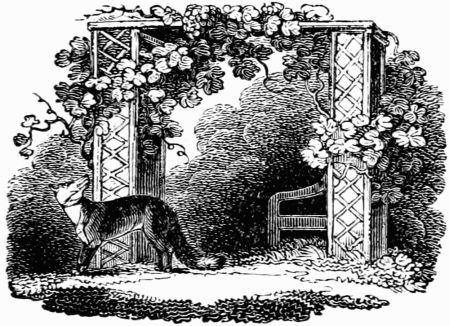 THE FOX AND THE GRAPES.
THE FOX AND THE GRAPES.
A Fox, very hungry, chanced to come into a vineyard, where there hung branches of charming ripe grapes; but nailed up to a trellis so high, that he leaped till he quite tired himself, without being able to reach one of them. At last—'Let who will take them!' says he, 'they are but green and sour; so I will even let them alone.'
APPLICATION.
This fable is a good reprimand to a parcel of vain coxcombs in the world, who, because they would never be thought to be disappointed in any of their pursuits, pretend a dislike to every thing which they cannot obtain. There is a strange propensity in mankind to this temper, and there are numbers of grumbling malcontents in every[221] different faculty and sect in life. The discarded statesman, considering the corruption of the times, would not have any hand in the administration of affairs for all the world. The country squire damns a court life, and would not go cringing and creeping to a drawing-room for the best place the king has at his disposal. A young fellow, being asked how he liked a celebrated beauty, by whom all the world knew he was despised, answered, she had a stinking breath. How insufferable is the pride of this poor creature man! who would stoop to the basest vilest actions, rather than be thought not able to do any thing. For what is more base and vile than lying? And when do we lie more notoriously than when we disparage and find fault with a thing, for no other reason but because it is out of our power?
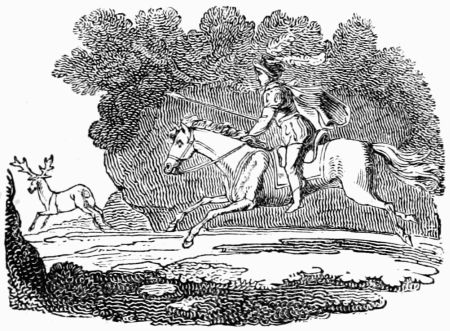 THE HORSE AND THE STAG.
THE HORSE AND THE STAG.
The Stag with his sharp horns, got the better of the Horse, and drove him clear out of the pasture where they used to feed together. So the latter craved the assistance of man; and, in order to receive the benefit of it, suffered him to put a bridle into his mouth and a saddle upon his back. By this way of proceeding he entirely defeated his enemy; but was mightily disappointed when, upon returning thanks, and desiring to be dismissed, he received this answer:—'No, I never knew before how useful a drudge you were; now I have found what you are good for, you may depend upon it I will keep you to it.'
APPLICATION.
As the foregoing fable was intended to caution us against consenting to any thing that might[223] prejudice public liberty, this may serve to keep us upon our guard in the preservation of that which is of a private nature. This is the use and interpretation given of it by Horace, the best and most polite philosopher that ever wrote. After reciting the fable, he applies it thus:—'This,' says he, 'is the case of him, who dreading poverty, parts with that invaluable jewel, liberty; like a wretch as he is, he will always be subject to a tyrant of some sort or other, and be a slave for ever; because his avaricious spirit knew not how to be contented with that moderate competency, which he might have possessed independent of all the world.'
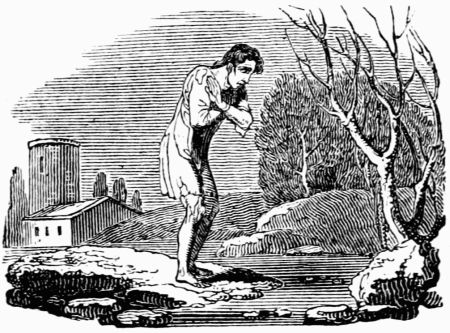 THE YOUNG MAN AND THE SWALLOW.
THE YOUNG MAN AND THE SWALLOW.
A prodigal Young Spendthrift, who had wasted his whole patrimony in taverns and gaming-houses, among lewd idle company, was taking a melancholy walk near a brook. It was in the month of January; and happened to be one of those warm sunshiny days which sometimes smile upon us even in that winterly season of the year; and, to make it the more flattering, a Swallow, which had made his appearance, by mistake, too soon, flew skimming along upon the surface of the water. The giddy Youth observing this, without any further consideration, concluded that summer was now come, and that he should have little or no occasion for clothes, so went and pawned them at the broker's, and ventured the money for one stake more, among his sharping[225] companions. When this too was gone the same way with the rest, he took another solitary walk in the same place as before. But the weather being severe and frosty, had made every thing look with an aspect very different from what it did before; the brook was quite frozen over, and the poor Swallow lay dead upon the bank of it: the very sight of which cooled the young Spark's brains; and coming to a kind of sense of his misery, he reproached the deceased bird as the author of all his misfortunes:—'Ah, wretch that thou wert!' says he, 'thou hast undone both thyself and me, who was so credulous as to depend upon thee.'
APPLICATION.
They who frequent taverns and gaming-houses, and keep bad company, should not wonder if they are reduced, in a very small time, to penury and want. The wretched young fellows, who once addict themselves to such a scandalous kind of life, scarce think of, or attend to, any one thing besides. They seem to have nothing else in their heads, but how they may squander what they have got, and where they may get more when that is gone. They do not make the same use of their reason that other people do; but, like the jaundiced eye, view every thing in that false light in which their distemper and debauchery represent it. The Young Man in the fable gives us a pretty example of this; he sees a Swallow in the midst of winter, and instead of being surprised at it,[226] as a very irregular and extraordinary thing, concludes from thence that it is summer, as if he had never thought before about the season. Well, the result of this wise conclusion is of a piece with the conclusion itself; if it is summer, he shall not want so many clothes, therefore he sells them: for what?—More money to squander away; as if (had his observation been just) summer would have lasted all the year round. But the true result and conclusion of all this is—when both his money and clothes are irrecoverably gone, he comes to his right senses; is ready to perish with hunger, to starve with cold, and to tear his own flesh with remorse and vexation at his former stupidity.
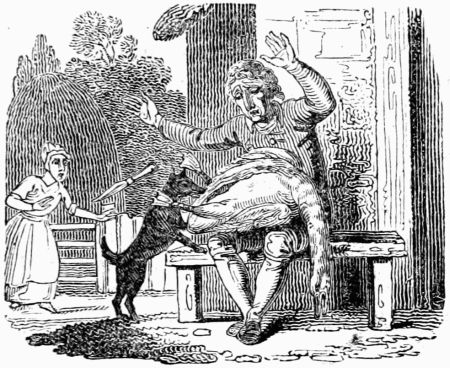 THE MAN AND HIS GOOSE.
THE MAN AND HIS GOOSE.
A certain Man had a Goose, which laid him a golden egg every day. But, not contented with this, which rather increased than abated his avarice, he was resolved to kill the Goose, and cut up her belly, that so he might come at the inexhaustible treasure which he fancied she had within her. He did so; and, to his great sorrow and disappointment, found nothing.
APPLICATION.
They who are of such craving impatient tempers, that they cannot live contented when fortune has blessed them with a constant and continued sufficiency, deserve even to be deprived of what they have. And this has been the case of many[228] ambitious and covetous men, who, by making an essay to grow very rich at once, have missed what they aimed at, and lost what they had before. But this comes so near the sense of the forty-seventh fable, that the same application may very well serve for both. If any thing further can be couched in this, it may possibly be intended to show us the unreasonableness and inconvenience of being solicitous about what may happen hereafter, and wanting to pry into the womb of futurity: which if we could do, all we should get for our pains would be, to spoil our pleasures by anticipation, and double our misfortunes by a previous sense and apprehension of them. There are some things that entertain and delight us very agreeably while we view them at a proper distance; which, perhaps, would not stand the test of a too near inspection. Beauty, being only the external form of a thing which strikes the eye in a pleasing manner, is a very thin glossy being, and, like some nice paintings of a peculiar composition, will not well bear even to be breathed on: to preserve our good opinion of it, we must not approach too close; for if, like the man in the fable, we have a mind to search for a treasure within, we may not only fail of our expectations there, but even lose the constant relish we enjoyed from a remoter contemplation.
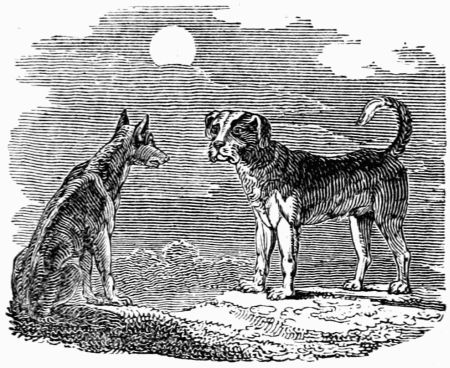 THE DOG AND THE WOLF.
THE DOG AND THE WOLF.
A lean, hungry, half-starved Wolf, happened, one moonshiny night, to meet with a jolly, plump, well-fed mastiff; and, after the first compliments were passed, says the Wolf—'You look extremely well; I protest, I think, I never saw a more graceful comely person. But how comes it about, I beseech you, that you should live so much better than I? I may say, without vanity, that I venture fifty times more than you do; and yet I am almost ready to perish with hunger.'—The Dog answered very bluntly—'Why you may live as well, if you will do the same for it that I do.'—'Indeed! What is that?' says he.—'Why,' says the Dog, 'only to guard the house a nights, and keep it from thieves.'—'With[230] all my heart,' replies the Wolf, 'for at present I have but a sorry time of it; and, I think, to change my hard lodging in the woods, where I endure rain, frost, and snow, for a warm roof over my head, and a belly full of good victuals, will be no bad bargain.'—'True,' says the Dog; 'therefore you have nothing more to do but to follow me.' Now, as they were jogging on together, the Wolf spied a crease in the Dog's neck, and, having a strange curiosity, could not forbear asking him what it meant.—'Pugh! nothing,' says the Dog. 'Nay, but pray,'—says the Wolf. 'Why,' says the Dog, 'if you must know, I am tied up in the day-time, because I am a little fierce, for fear I should bite people, and am only let loose a nights. But this is done with design to make me sleep a days, more than any thing else, and that I may watch the better in the night-time; for, as soon as ever the twilight appears, out I am turned, and may go where I please. Then my master brings me plates of bones from the table with his own hands, and whatever scraps are left by any of the family, all fall to my share; for you must know I am a favourite with every body. So you see how you are to live.—Come, come along; what is the matter with you?'—'No,' replied the Wolf, 'I beg your pardon; keep your happiness all to yourself. Liberty is the word with me; and I would not be a king upon the terms you mention.'
[231]APPLICATION.
The lowest condition of life, with freedom attending it, is better than the most exalted station under a restraint. Æsop and Phædrus, who had both felt the bitter effects of slavery, though the latter of them had the good fortune to have the mildest prince that ever was for his master, cannot forbear taking all opportunities to express their great abhorrence of servitude, and their passion for liberty, upon any terms whatsoever. Indeed, a state of slavery, with whatever seeming grandeur and happiness it may be attended, is yet so precarious a thing, that he must want sense, honour, courage, and all manner of virtue, who can endure to prefer it in his choice. A man who has so little honour as to bear to be a slave, when it is in his power to prevent or redress it, would make no scruple to cut the throats of his fellow creatures, or to do any wickedness that the wanton unbridled will of his tyrannical master could suggest.
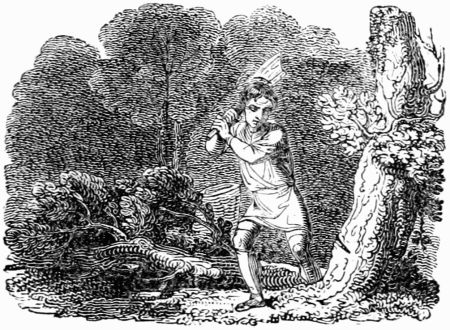 THE WOOD AND THE CLOWN.
THE WOOD AND THE CLOWN.
A country Fellow came one day into the Wood, and looked about him with some concern; upon which the Trees, with a curiosity natural to some other creatures, asked him what he wanted.—He replied—'That he only wanted a piece of wood to make a handle to his hatchet.' Since that was all, it was voted unanimously, that he should have a piece of good, sound, tough ash. But he had no sooner received and fitted it for his purpose, than he began to lay about him unmercifully, and to hack and hew without distinction, felling the noblest trees in all the forest. Then the Oak is said to have spoke thus to the Beech in a low whisper,—'Brother, we must take it for our pains.'
APPLICATION.
No people are more justly liable to suffer than they who furnish their enemies with any kind[233] of assistance. It is generous to forgive; it is enjoined us by religion to love our enemies; but he that trusts an enemy, much more contributes to the strengthening and arming of him, may almost depend upon repenting him for his inadvertent benevolence; and has, moreover, this to add to his distress, that, when he might have prevented it, he brought his misfortune upon himself by his own credulity.
Any person in a community, by what name or title soever distinguished, who affects a power which may possibly hurt the people, is an enemy to that people, and therefore they ought not to trust him: for though he were ever so fully determined not to abuse such a power, yet he is so far a bad man, as he disturbs the people's quiet, and makes them jealous and uneasy by desiring to have it, or even retaining it, when it may prove mischievous. If we consult history, we shall find that the thing called Prerogative has been claimed and contended for chiefly by those who never intended to make a good use of it; and as readily resigned and thrown up by just and wise princes, who had the true interest of their people at heart. How like senseless stocks do they act, who, by complimenting some capricious mortal, from time to time, with parcels of prerogative, at last put it out of their power to defend and maintain themselves in their just and natural liberty!
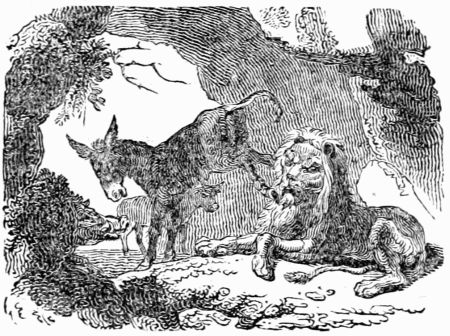 THE OLD LION.
THE OLD LION.
A Lion, worn out with old age, lay fetching his last gasp, and agonizing in the convulsive struggles of death. Upon which occasion several of the beasts, who had formerly been sufferers by him, came and revenged themselves upon him. The Boar, with his mighty tusks, drove at him in a stroke that glanced like lightning. And the Bull gored him with his violent horns. Which, when the Ass saw they might do without any danger, he too came up, and threw his heels into the Lion's face. Upon which, the poor old expiring tyrant uttered these words with his last dying groan:—'Alas! how grievous is it to suffer insults, even from the brave and the valiant; but to be spurned by so base a creature as this is, who is the disgrace of Nature, is worse than dying ten thousand deaths.'
[235]APPLICATION.
He that would be reverenced and respected by the rest of mankind, must lay in a foundation for it of some kind or other; for people cannot be persuaded to pay deference and esteem for nothing. So that, though we have lived in good repute in the world, if ever we should happen to outlive our stock, we must not be surprised to find ourselves slighted and affronted, even by the vilest scum of the people. If therefore we would raise to ourselves a dignity that will continue not only to the end of our lives, but extend itself far down among the ages of posterity, we should take care to establish it upon a foundation of virtue and good-nature: this will not only preserve us from the insults of enemies, but, upon occasion, surround us with a trusty guard of faithful and sincere friends.
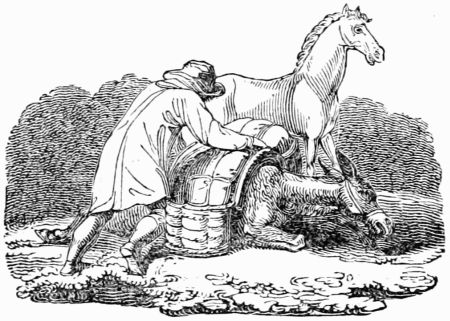 THE HORSE AND THE LOADED ASS.
THE HORSE AND THE LOADED ASS.
An idle Horse, and an Ass labouring under a heavy burden, were travelling the road together; they both belonged to a country fellow, who trudged it on foot by them. The Ass, ready to faint under his heavy load, entreated the Horse to assist him, and lighten his burden, by taking some of it upon his back. The Horse was ill-natured, and refused to do it; upon which the poor Ass tumbled down in the midst of the highway, and expired in an instant. The countryman ungirted his pack-saddle, and tried several ways to relieve him, but all to no purpose: which, when he perceived, he took the whole burden and laid it upon the Horse, together with the skin of the dead Ass: so that the Horse, by his moroseness in refusing to do a small kindness, justly brought upon himself a great inconvenience.
APPLICATION.
Self-love is no such ill principle, if it were but[237] well and truly directed; for it is impossible that any man should love himself to any purpose, who withdraws his assistance from his friends or the public. Every government is to be considered as a body politic; and every man who lives in it as a member of that body. Now, to carry on the allegory, no member can thrive better than when they all jointly unite in their endeavours to assist and improve the whole. If the hand was to refuse its assistance in procuring food for the mouth, they must both starve and perish together. And when those, who are parties concerned in the same community, deny such assistance to each other, as the preservation of that community necessarily requires, their self-interestedness, in that case, is ill-directed, and will have a quite contrary effect from what they intended. How many people are so senseless as to think it hard that there should be any taxes in the nation; whereas, were there to be none indeed, those very people would be undone immediately. That little property they have would be presently plundered by foreign or domestic enemies; and then they would be glad to contribute their quota, even without an act of parliament. The charges of supporting a government are necessary things, and easily supplied by a due and well proportioned contribution. But, in a narrower and more confined view, to be ready to assist our friends upon all occasions, is not only good, as it is an act of humanity, but highly discreet, as it strengthens our interest, and gives us an opportunity of lightening the burden of life.
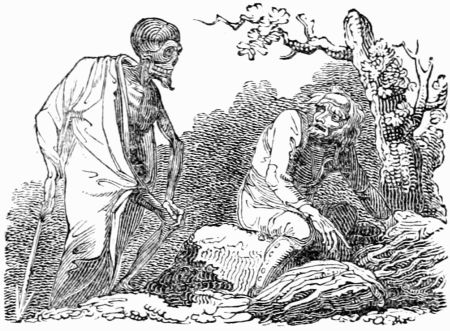 THE OLD MAN AND DEATH.
THE OLD MAN AND DEATH.
A poor feeble old man who had crawled out into a neighbouring wood to gather a few sticks, had made up his bundle, and, laying it over his shoulders was trudging homeward with it; but, what with age, and the length of the way, and the weight of his burden, he grew so faint and weak that he sunk under it: and, as he sat on the ground, called upon Death to come, once for all, and ease him of his troubles. Death no sooner heard him, but he came and demanded of him what he wanted. The poor old creature, who little thought Death had been so near, and frighted almost out of his senses with his terrible aspect, answered him trembling, that having by chance let his bundle of sticks fall, and being too infirm to get it up himself, he had made bold to call upon him to help him: that,[239] indeed, this was all he wanted at present; and that he hoped his worship was not offended with him for the liberty he had taken in so doing.
APPLICATION.
This fable gives us a lively representation of the general behaviour of mankind towards that grim king of terrors, Death. Such liberties do they take with him behind his back, that, upon every little cross accident which happens in their way, Death is immediately called upon; and they even wish it might be lawful for them to finish by their own hands a life so odious, so perpetually tormenting and vexatious. When, let but Death only offer to make his appearance, and the very sense of his near approach almost does the business. Oh, then all they want is a little longer life; and they would be glad to come off so well as to have their old burden laid upon their shoulders again. One may well conclude what an utter aversion they, who are in youth, health, and vigour of body, have to dying, when age, poverty, and wretchedness, are not sufficient to reconcile us to the thought.
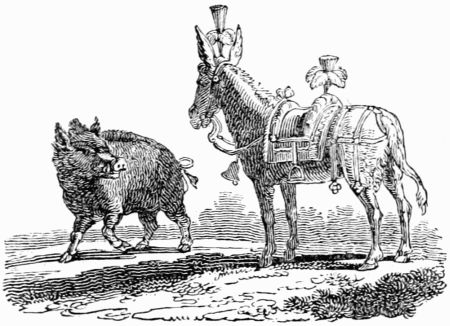 THE BOAR AND THE ASS.
THE BOAR AND THE ASS.
A little scoundrel of an Ass, happening to meet with a Boar, had a mind to be arch upon him,—'And so, brother,' says he, 'your humble servant.' The Boar, somewhat nettled at his familiarity, bristled up to him, and told him, he was surprised to hear him utter so impudent an untruth, and was just going to show his noble resentment, by giving him a rip in the flank; but wisely stifling his passion, he contented himself with only saying—'Go, you sorry beast! I could be amply and easily revenged of you; but I do not care to foul my tusks with the blood of so base a creature.'
APPLICATION.
Fools are sometimes so ambitious of being thought wits, that they run great hazards in[241] attempting to show themselves such. This is not the first Ass, who, after a handsome rebuke from one superior to himself both in courage and merit, has continued his awkward raillery even to the last degree of offence. But such a dull creature is so far from raising himself the least esteem by his ludicrous vein, that he has very good luck if he escapes with a whole skin. Buffoons, like dwarfs, should be matched with those of their own level; a man, in sense or stature, would be ashamed to encounter either of them. But notwithstanding all this, and though the Boar in the fable is a very good example to men of generous brave spirits not to give themselves up to passion, nor to be distempered with thoughts of revenge upon the insolent behaviour of every Ass that offends them, because their hands would be dishonoured by the tincture of a base man's blood; yet among human creatures, the correction of an Ass that would be unseasonably witty, may be performed with justness and propriety enough, provided it be done in good humour. The blood of a coward, literally speaking, would stain the character of a man of honour; when we chastise such wretches, it should be done, if possible, in the utmost calmness of temper. It takes off something from the reputation of a great soul, when we see it is in the power of a fool to ruffle and unsettle it.
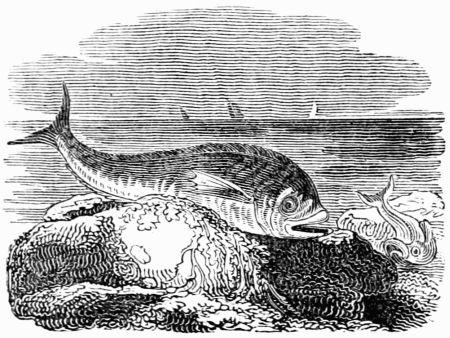 THE TUNNY AND THE DOLPHIN.
THE TUNNY AND THE DOLPHIN.
A fish called a Tunny being pursued by a Dolphin, and driven with great violence, not minding which way he went, was thrown by the force of the waves upon a rock, and left there. His death now was inevitable; but, casting his eyes on one side, and seeing the Dolphin in the same condition lay gasping by him.—'Well,' says he, 'I must die, it is true; but I die with pleasure, when I behold him who is the cause of it involved in the same fate.'
APPLICATION.
Revenge though a blind mischievous passion, is yet a very sweet thing: so sweet, that it can even soothe the pangs and reconcile us to the bitterness of death. And, indeed, it must be a[243] temper highly philosophical, that could be driven out of life by any tyrannical unjust procedure, and not be touched with a sense of pleasure to see the author of it splitting upon the same rock. When this is allowed, and it is further considered how easily the revenge of the meanest person may be executed even upon the highest, it should, methinks, keep people upon their guard, and prevail with them not to persecute or be injurious to any one. The moral turpitude of doing wrong is sufficient to influence every brave honest man, and to secure him from harbouring even the least thought of it in his breast: but the knave and the coward should weigh the present argument, and, before they attempt the least injury, be assured of this truth, that nothing is more sweet, nor scarce any thing so easy to compass, as revenge.
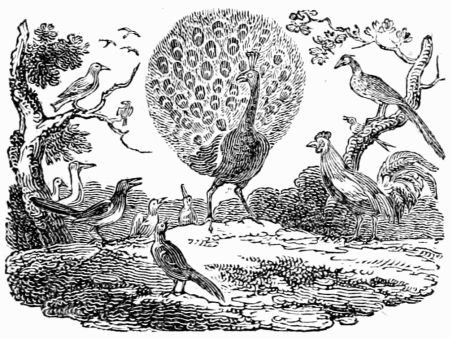 THE PEACOCK AND THE MAGPIE.
THE PEACOCK AND THE MAGPIE.
The birds met together upon a time to choose a king; and the Peacock standing candidate, displayed his gaudy plumes, and catched the eyes of the silly multitude with the richness of his feathers. The majority declared for him, and clapped their wings with great applause: but just as they were going to proclaim him, the Magpie stepped forth in the midst of the assembly, and addressed himself thus to the new king—'May it please your majesty elect, to permit one of your unworthy subjects to represent to you his suspicions and apprehensions, in the face of this whole congregation: we have chosen you for our king, we have put our lives and fortunes into your hands, and our whole hope and dependence is upon you; if therefore,[245] the Eagle, or the Vulture, or the Kite, should at any time make a descent upon us, as it is highly probable they will, may your majesty be so gracious as to dispel our fears, and clear our doubts, about that matter, by letting us know how you intend to defend us against them?'—This pithy unanswerable question drew the whole audience into so just a reflection, that they soon resolved to proceed to a new choice. But, from that time, the Peacock has been looked upon as a vain insignificant pretender, and the Magpie esteemed as eminent a speaker as any among the whole community of birds.
APPLICATION.
Form and outside, in the choice of a ruler, should not be so much regarded as the qualities and endowments of the mind. In choosing heads of corporations, from the king of the land down to the master of a company, upon every new election it should be inquired into, which of the candidates is most capable of advancing the good and welfare of the community; and upon him the choice should fall. But the eyes of the multitude are so dazzled with pomp and show, noise and ceremony, that they cannot see things really as they are: and from hence it comes to pass, that so many absurdities are committed and maintained in the world. People should examine and weigh the real weight and merit of the person, and not be imposed upon by false colours and pretences of I know not what.
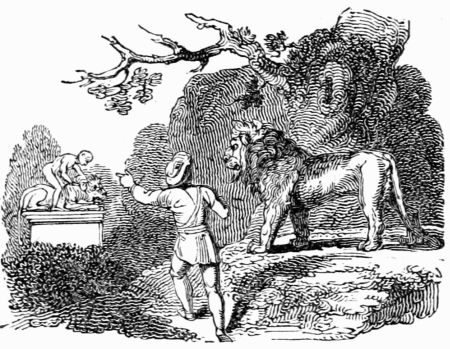 THE FORESTER AND THE LION.
THE FORESTER AND THE LION.
The Forester meeting with a Lion one day, they discoursed together for awhile without differing much in opinion. At last, a dispute happening to arise about the superiority between a Man and a Lion, the Man, wanting a better argument, showed the Lion a marble monument, on which was placed the statue of a man striding over a vanquished Lion.—'If this,' says the Lion, 'is all you have to say for it, let us be the carvers, and we will make the Lion striding over the Man.'
APPLICATION.
Contending parties are very apt to appeal for the truth to records written by their own side; but nothing is more unfair, and at the same time insignificant and unconvincing. Such is the[247] partiality of mankind in favour of themselves and their own actions, that it is almost impossible to come at any certainty by reading the accounts which are written on one side only. We have few or no memoirs come down to us of what was transacted in the world during the sovereignty of ancient Rome, but what were written by those who had a dependency upon it; therefore it is no wonder that they appear, upon most occasions, to have been so great and glorious a nation. What their contemporaries of other countries thought of them we cannot tell, otherwise than from their own writers: it is not impossible but they might have described them as a barbarous, rapacious, treacherous, unpolite people; who, upon their conquest of Greece, for some time, made as great havoc and destruction of the arts and sciences, as their fellow plunderers, the Goths and Vandals, did afterwards in Italy. What monsters would our own party-zealots make of each other, if the transactions of the times were to be handed down to posterity by a warm hearty man on either side! and, were such records to survive two or three centuries, with what perplexities and difficulties must they embarrass a young historian, as by turns he consulted them for the characters of his great forefathers! If it should so happen, it were to be wished this application might be living at the same time that young readers, instead of doubting to which they should give their credit, would not fail to remember that this was the work of a man, that of a lion.
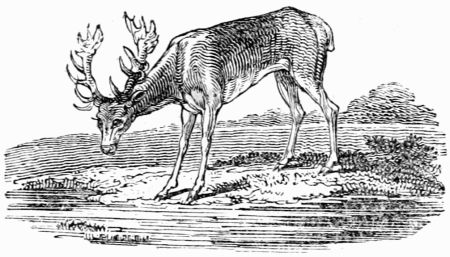 THE STAG LOOKING INTO THE WATER.
THE STAG LOOKING INTO THE WATER.
A Stag that had been drinking at a clear spring, saw himself in the water: and, pleased with the prospect, stood afterwards for some time contemplating and surveying his shape and features from head to foot.—'Ah!' says he, 'what a glorious pair of branching horns are there! how gracefully do those antlers hang over my forehead, and give an agreeable turn to my whole face! If some other parts of my body were but proportionable to them, I would turn my back to nobody; but I have a set of such legs as really makes me ashamed to see them. People may talk what they please of their conveniencies, and what great need we stand in of them upon several occasions; but, for my part, I find them so very slender and unsightly, that I had as lief have none at all.' While he was giving himself these airs, he was alarmed with the noise of some huntsmen,[249] and a pack of hounds that had been just laid on upon the scent, and were making towards him. Away he flies, in some consternation, and, bounding nimbly over the plain, threw dogs and men at a vast distance behind him. After which, taking a very thick copse, he had the ill-fortune to be entangled by his horns in a thicket; where he was held fast till the hounds came in and pulled him down. Finding now how it was like to go with him, in the pangs of death he is said to have uttered these words:—'Unhappy creature that I am! I am too late convinced, that what I prided myself in has been the cause of my undoing, and what I so much disliked was the only thing that could have saved me.'
APPLICATION.
Perhaps we cannot apply this better than by supposing the fable to be a parable! which may be thus explained. The Deer, viewing itself in the water, is a beautiful young lady at her looking-glass. She cannot help being sensible of the charms which lie blooming in every feature of her face. She moistens her lips, languishes with her eyes, adjusts every lock of her hair with the nicest exactness, gives an agreeable attitude to her whole body; and then, with a soft sigh, says to herself,—'Ah! how happy might I be, in a daily crowd of admirers, if it were not for the censoriousness of the age! when I view that face, where Nature, to give her her due, has been liberal enough of charms, how easy should I be, if it were not for[250] that slender particular, my honour. The odious idea of that comes across all my happy moments, and brings a mortification with it that damps my most flattering tender hopes. Oh! that there were no such thing in the world!'—In the midst of these soliloquies she is interrupted by the voice of her lover, who enters her chamber singing a rigadoon air; and, introducing his discourse in a familiar easy manner, takes occasion to launch out in praise of her beauty; sees she is pleased with it, snatches her hand, kisses it in a transport; and, in short, pursues his point so close, that she is not able to disengage herself from him. But, when the consequence of all this approaches, in an agony of grief and shame, she fetches a deep sigh and says—'Ah! how mistaken have I been! the virtue I slighted might have saved me; but the beauty I prized so much has been my undoing.'
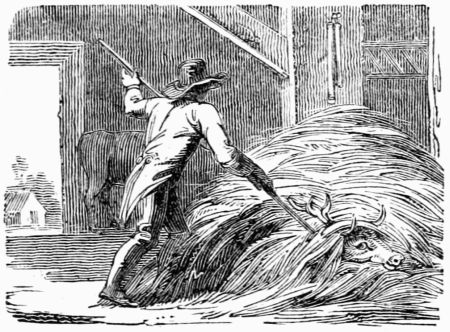 THE STAG AND THE OX-STALL.
THE STAG AND THE OX-STALL.
A Stag, roused out of his thick cover in the midst of the forest, and driven hard by the hounds, made towards a farm-house, and seeing the door of an Ox-Stall open, entered therein, and hid himself under a heap of straw. One of the Oxen, turning his head about, asked him what he meant by venturing himself in such a place as that was, where he was sure to meet with his doom?—'Ah!' says the Stag, 'if you will but be so good as to favour me with your concealment, I hope I shall do well enough; I intend to make off again the first opportunity.'—Well, he staid there till towards night; in came the ox-man with a bundle of fodder, and never saw him. In short, all the servants of the farm came and went, and not a soul of them smelt[252] any thing of the matter. Nay, the bailiff himself came according to form, and looked in, but walked away no wiser than the rest. Upon this the Stag, ready to jump out of his skin for joy, began to return thanks to the good-natured Oxen, protesting that they were the most obliging people he had ever met with in his life. After he had done his compliments, one of them answered him gravely—'Indeed, we desire nothing more than to have it in our power to contribute to your escape; but there is a certain person, you little think of, who has a hundred eyes; if he should happen to come, I would not give this straw for your life.'—In the interim, home comes the master himself, from a neighbour's, where he had been invited to dinner; and, because he had observed the cattle to look but scurvily of late, he went up to the rack, and asked, why they did not give them more fodder? then, casting his eyes downward,—'Hey-day!' says he, 'why so sparing of your litter? pray scatter a little more here. And these cobwebs—but I have spoke so often, that unless I do it myself—' Thus, as he went on, prying into every thing, he chanced to look where the Stag's horns lay sticking out of the straw; upon which he raised a hue-and-cry, called all his people about him, killed the poor Stag, and made a prize of him.
APPLICATION.
The moral of this fable is, that nobody looks after a man's affairs so well as he himself. Servants,[253] being but hirelings, seldom have the true interest of their master at heart, but let things run on in a negligent constant disorder; and this, generally, not so much for want of capacity as honesty. Their heads are taken up with the cultivation of their own private interest; for the service and promotion of which that of their master is postponed, and often entirely neglected.
Few families are reduced to poverty and distress merely by their own extravagance and indulgence in luxury: the inattention of servants swells every article of expense in domestic œconomy; and the retinue of great men, instead of exerting their industry to conduce as far as possible to the increase of their master's wealth, commonly exercise no other office than that of locusts and caterpillars, to consume and devour it.
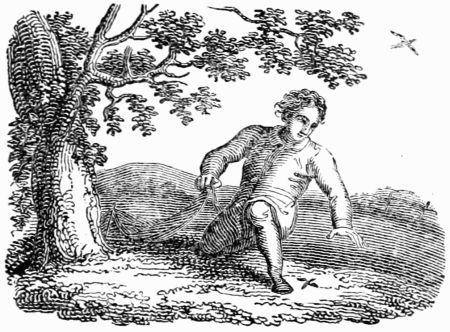 THE DOVE AND THE ANT.
THE DOVE AND THE ANT.
The Ant, compelled by thirst, went to drink in a clear purling rivulet; but the current, with its circling eddy, snatched her away, and carried her down the stream. The Dove, pitying her distressed condition, cropped a branch from a neighbouring tree, and let it fall into the water, by means of which the Ant saved herself, and got ashore. Not long after, a fowler having a design upon the Dove, planted his nets in due order, without the bird's observing what he was about; which the Ant perceiving, just as he was going to put his design in execution, she bit him by the heel, and made him give so sudden a start, that the Dove took the alarm, and flew away.
[255]APPLICATION.
One good turn deserves another; and gratitude is excited by so noble and natural a spirit, that he ought to be looked upon as the vilest of creatures who has no sense of it. It is, indeed, so very just and equitable a thing, and so much every man's duty, that, to speak of it properly, one should not mention it as any thing meritorious, or that may claim praise and admiration, any more than we should say a man ought to be rewarded or commended for not killing his father, or forbearing to set fire to his neighbour's house. The bright and shining piece of morality, therefore, which is recommended to us in this fable, is set forth in this example of the Dove, who, without any obligation or expectation, does a voluntary office of charity to its fellow creature in distress. The constant uninterrupted practice of this virtue, is the only thing in which we are capable of imitating the great Author of our being; whose beloved Son, besides the many precepts he has given to enforce this duty, used this expression as a common saying, 'It is more blessed to give than to receive.'
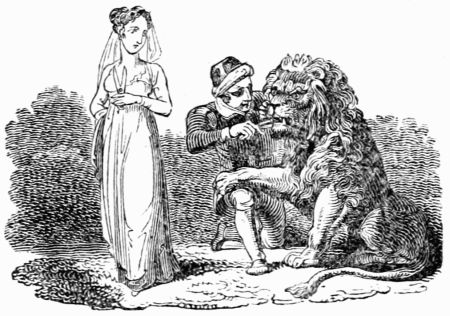 THE LION IN LOVE.
THE LION IN LOVE.
The Lion, by chance, saw a fair Maid, the forester's daughter, as she was tripping over a lawn, and fell in love with her. Nay, so violent was his passion, that he could not live unless he made her his own; so that, without any more delay, he broke his mind to the father, and demanded the damsel for his wife. The man, as odd as the proposal seemed at first, yet soon recollected, that by complying he might get the Lion into his power; but, by refusing him, should only exasperate and provoke his rage. Therefore he consented; but told him it must be upon these conditions: that, considering the girl was young and tender, he must agree to let his teeth be plucked out, and his claws cut off, lest he should hurt her, or at least frighten her, with the apprehension of them. The Lion was too[257] much in love to hesitate; but was no sooner deprived of his teeth and claws, than the treacherous forester attacked him with a huge club, and knocked his brains out.
APPLICATION.
Of all the ill consequences that may attend that blind passion, love, seldom any prove so fatal as that one, of its drawing people into a sudden and ill-concerted marriage. They commit a rash action in the midst of a fit of madness, of which, as soon as they come to themselves, they may find reason to repent as long as they live. Many an unthinking young fellow has been treated as much like a savage, in this respect, as the Lion in the fable. He has, perhaps, had nothing valuable belonging to him but his estate, and the writings which made his title to it; and, if he is so far captivated as to be persuaded to part with these, his teeth and his claws are gone, and he lies entirely at the mercy of madam and her relations. All the favour he is to expect, after this, is from the accidental goodness of the family he falls into; which, if it happen to be of a particular strain, will not fail to keep him in a distant subjection, after they have stripped him of all his power. Nothing but a true friendship, and a mutual interest, can keep up reciprocal love between the conjugal pair; and when that is wanting, and nothing but contempt and aversion remain to supply the place, matrimony becomes[258] a downright state of enmity and hostility: and what a miserable case he must be in, who has put himself and his whole power into the hands of his enemy, let those consider, who, while they are in their sober senses, abhor the thoughts of being betrayed into their ruin, by following the impulse of a blind unheeding passion.
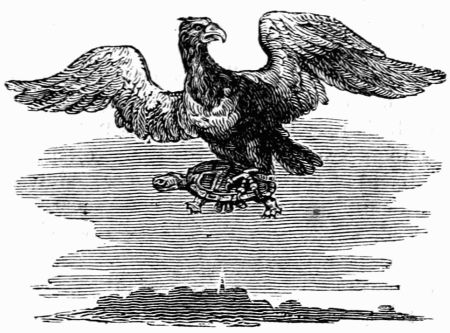 THE TORTOISE AND THE EAGLE.
THE TORTOISE AND THE EAGLE.
The Tortoise, weary of his condition, by which he was confined to creep upon the ground, and being ambitious to have a prospect, and look about him, gave out, that if any bird would take him up into the air, and show him the world, he would reward him with a discovery of many precious stones, which he knew were hidden in a certain place of the earth: the Eagle undertook to do as he desired, and, when he had performed his commission, demanded the reward; but finding the Tortoise could not make good his words, he stuck his talons into the softer parts of his body, and made him a sacrifice to his revenge.
APPLICATION.
As men of honour ought to consider calmly how far the things which they promise may be in[260] their power, before they venture to make promises upon this account, because the non-performance of them will be apt to excite an uneasiness within themselves, and tarnish their reputation in the eyes of other people; so fools and cowards should be as little rash in this respect as possible, lest their impudent forgeries draw upon them the resentment of those whom they disappoint, and that resentment makes them undergo smart, but deserved, chastisement. The man who is so stupid a knave as to make a lying promise where he is sure to be detected, receives the punishment of his folly unpitied by all that know him.
FINIS.
Printed by C. WHITTINGHAM, Chiswick.
[1] Arist. Rhet. Lib. ii. chap. 21.
[2] Lib. ii. fab. 9. and Lib. iii. fab. 19.
[3] Phæd. Lib. i. fab. 2.
[4] Spect. No. 183.
[5] Fab. liv.
[6] Tatler, No. 147.
The header "Fable I" has been added.
Variations in spelling and hyphenation have been preserved except in obvious cases of typographical error.
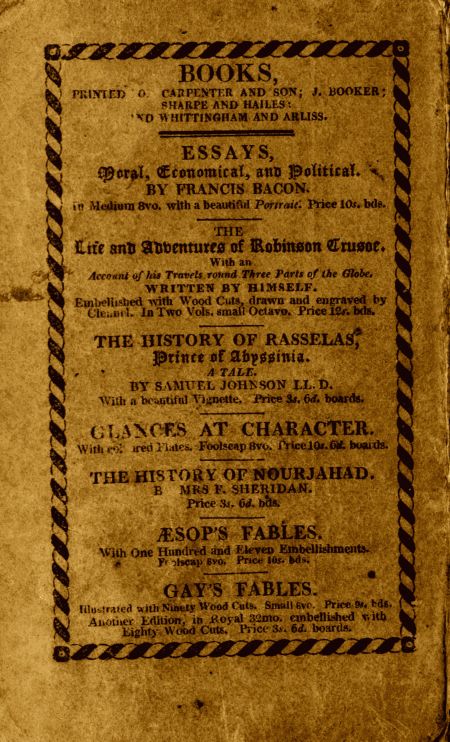
End of the Project Gutenberg EBook of Æsop's Fables, by Æsop
*** END OF THIS PROJECT GUTENBERG EBOOK ÆSOP'S FABLES ***
***** This file should be named 39187-h.htm or 39187-h.zip *****
This and all associated files of various formats will be found in:
http://www.gutenberg.org/3/9/1/8/39187/
Produced by Chris Curnow, Julia Neufeld and the Online
Distributed Proofreading Team at http://www.pgdp.net (This
file was produced from images generously made available
by The Internet Archive)
Updated editions will replace the previous one--the old editions
will be renamed.
Creating the works from public domain print editions means that no
one owns a United States copyright in these works, so the Foundation
(and you!) can copy and distribute it in the United States without
permission and without paying copyright royalties. Special rules,
set forth in the General Terms of Use part of this license, apply to
copying and distributing Project Gutenberg-tm electronic works to
protect the PROJECT GUTENBERG-tm concept and trademark. Project
Gutenberg is a registered trademark, and may not be used if you
charge for the eBooks, unless you receive specific permission. If you
do not charge anything for copies of this eBook, complying with the
rules is very easy. You may use this eBook for nearly any purpose
such as creation of derivative works, reports, performances and
research. They may be modified and printed and given away--you may do
practically ANYTHING with public domain eBooks. Redistribution is
subject to the trademark license, especially commercial
redistribution.
*** START: FULL LICENSE ***
THE FULL PROJECT GUTENBERG LICENSE
PLEASE READ THIS BEFORE YOU DISTRIBUTE OR USE THIS WORK
To protect the Project Gutenberg-tm mission of promoting the free
distribution of electronic works, by using or distributing this work
(or any other work associated in any way with the phrase "Project
Gutenberg"), you agree to comply with all the terms of the Full Project
Gutenberg-tm License (available with this file or online at
http://gutenberg.org/license).
Section 1. General Terms of Use and Redistributing Project Gutenberg-tm
electronic works
1.A. By reading or using any part of this Project Gutenberg-tm
electronic work, you indicate that you have read, understand, agree to
and accept all the terms of this license and intellectual property
(trademark/copyright) agreement. If you do not agree to abide by all
the terms of this agreement, you must cease using and return or destroy
all copies of Project Gutenberg-tm electronic works in your possession.
If you paid a fee for obtaining a copy of or access to a Project
Gutenberg-tm electronic work and you do not agree to be bound by the
terms of this agreement, you may obtain a refund from the person or
entity to whom you paid the fee as set forth in paragraph 1.E.8.
1.B. "Project Gutenberg" is a registered trademark. It may only be
used on or associated in any way with an electronic work by people who
agree to be bound by the terms of this agreement. There are a few
things that you can do with most Project Gutenberg-tm electronic works
even without complying with the full terms of this agreement. See
paragraph 1.C below. There are a lot of things you can do with Project
Gutenberg-tm electronic works if you follow the terms of this agreement
and help preserve free future access to Project Gutenberg-tm electronic
works. See paragraph 1.E below.
1.C. The Project Gutenberg Literary Archive Foundation ("the Foundation"
or PGLAF), owns a compilation copyright in the collection of Project
Gutenberg-tm electronic works. Nearly all the individual works in the
collection are in the public domain in the United States. If an
individual work is in the public domain in the United States and you are
located in the United States, we do not claim a right to prevent you from
copying, distributing, performing, displaying or creating derivative
works based on the work as long as all references to Project Gutenberg
are removed. Of course, we hope that you will support the Project
Gutenberg-tm mission of promoting free access to electronic works by
freely sharing Project Gutenberg-tm works in compliance with the terms of
this agreement for keeping the Project Gutenberg-tm name associated with
the work. You can easily comply with the terms of this agreement by
keeping this work in the same format with its attached full Project
Gutenberg-tm License when you share it without charge with others.
1.D. The copyright laws of the place where you are located also govern
what you can do with this work. Copyright laws in most countries are in
a constant state of change. If you are outside the United States, check
the laws of your country in addition to the terms of this agreement
before downloading, copying, displaying, performing, distributing or
creating derivative works based on this work or any other Project
Gutenberg-tm work. The Foundation makes no representations concerning
the copyright status of any work in any country outside the United
States.
1.E. Unless you have removed all references to Project Gutenberg:
1.E.1. The following sentence, with active links to, or other immediate
access to, the full Project Gutenberg-tm License must appear prominently
whenever any copy of a Project Gutenberg-tm work (any work on which the
phrase "Project Gutenberg" appears, or with which the phrase "Project
Gutenberg" is associated) is accessed, displayed, performed, viewed,
copied or distributed:
This eBook is for the use of anyone anywhere at no cost and with
almost no restrictions whatsoever. You may copy it, give it away or
re-use it under the terms of the Project Gutenberg License included
with this eBook or online at www.gutenberg.org
1.E.2. If an individual Project Gutenberg-tm electronic work is derived
from the public domain (does not contain a notice indicating that it is
posted with permission of the copyright holder), the work can be copied
and distributed to anyone in the United States without paying any fees
or charges. If you are redistributing or providing access to a work
with the phrase "Project Gutenberg" associated with or appearing on the
work, you must comply either with the requirements of paragraphs 1.E.1
through 1.E.7 or obtain permission for the use of the work and the
Project Gutenberg-tm trademark as set forth in paragraphs 1.E.8 or
1.E.9.
1.E.3. If an individual Project Gutenberg-tm electronic work is posted
with the permission of the copyright holder, your use and distribution
must comply with both paragraphs 1.E.1 through 1.E.7 and any additional
terms imposed by the copyright holder. Additional terms will be linked
to the Project Gutenberg-tm License for all works posted with the
permission of the copyright holder found at the beginning of this work.
1.E.4. Do not unlink or detach or remove the full Project Gutenberg-tm
License terms from this work, or any files containing a part of this
work or any other work associated with Project Gutenberg-tm.
1.E.5. Do not copy, display, perform, distribute or redistribute this
electronic work, or any part of this electronic work, without
prominently displaying the sentence set forth in paragraph 1.E.1 with
active links or immediate access to the full terms of the Project
Gutenberg-tm License.
1.E.6. You may convert to and distribute this work in any binary,
compressed, marked up, nonproprietary or proprietary form, including any
word processing or hypertext form. However, if you provide access to or
distribute copies of a Project Gutenberg-tm work in a format other than
"Plain Vanilla ASCII" or other format used in the official version
posted on the official Project Gutenberg-tm web site (www.gutenberg.org),
you must, at no additional cost, fee or expense to the user, provide a
copy, a means of exporting a copy, or a means of obtaining a copy upon
request, of the work in its original "Plain Vanilla ASCII" or other
form. Any alternate format must include the full Project Gutenberg-tm
License as specified in paragraph 1.E.1.
1.E.7. Do not charge a fee for access to, viewing, displaying,
performing, copying or distributing any Project Gutenberg-tm works
unless you comply with paragraph 1.E.8 or 1.E.9.
1.E.8. You may charge a reasonable fee for copies of or providing
access to or distributing Project Gutenberg-tm electronic works provided
that
- You pay a royalty fee of 20% of the gross profits you derive from
the use of Project Gutenberg-tm works calculated using the method
you already use to calculate your applicable taxes. The fee is
owed to the owner of the Project Gutenberg-tm trademark, but he
has agreed to donate royalties under this paragraph to the
Project Gutenberg Literary Archive Foundation. Royalty payments
must be paid within 60 days following each date on which you
prepare (or are legally required to prepare) your periodic tax
returns. Royalty payments should be clearly marked as such and
sent to the Project Gutenberg Literary Archive Foundation at the
address specified in Section 4, "Information about donations to
the Project Gutenberg Literary Archive Foundation."
- You provide a full refund of any money paid by a user who notifies
you in writing (or by e-mail) within 30 days of receipt that s/he
does not agree to the terms of the full Project Gutenberg-tm
License. You must require such a user to return or
destroy all copies of the works possessed in a physical medium
and discontinue all use of and all access to other copies of
Project Gutenberg-tm works.
- You provide, in accordance with paragraph 1.F.3, a full refund of any
money paid for a work or a replacement copy, if a defect in the
electronic work is discovered and reported to you within 90 days
of receipt of the work.
- You comply with all other terms of this agreement for free
distribution of Project Gutenberg-tm works.
1.E.9. If you wish to charge a fee or distribute a Project Gutenberg-tm
electronic work or group of works on different terms than are set
forth in this agreement, you must obtain permission in writing from
both the Project Gutenberg Literary Archive Foundation and Michael
Hart, the owner of the Project Gutenberg-tm trademark. Contact the
Foundation as set forth in Section 3 below.
1.F.
1.F.1. Project Gutenberg volunteers and employees expend considerable
effort to identify, do copyright research on, transcribe and proofread
public domain works in creating the Project Gutenberg-tm
collection. Despite these efforts, Project Gutenberg-tm electronic
works, and the medium on which they may be stored, may contain
"Defects," such as, but not limited to, incomplete, inaccurate or
corrupt data, transcription errors, a copyright or other intellectual
property infringement, a defective or damaged disk or other medium, a
computer virus, or computer codes that damage or cannot be read by
your equipment.
1.F.2. LIMITED WARRANTY, DISCLAIMER OF DAMAGES - Except for the "Right
of Replacement or Refund" described in paragraph 1.F.3, the Project
Gutenberg Literary Archive Foundation, the owner of the Project
Gutenberg-tm trademark, and any other party distributing a Project
Gutenberg-tm electronic work under this agreement, disclaim all
liability to you for damages, costs and expenses, including legal
fees. YOU AGREE THAT YOU HAVE NO REMEDIES FOR NEGLIGENCE, STRICT
LIABILITY, BREACH OF WARRANTY OR BREACH OF CONTRACT EXCEPT THOSE
PROVIDED IN PARAGRAPH 1.F.3. YOU AGREE THAT THE FOUNDATION, THE
TRADEMARK OWNER, AND ANY DISTRIBUTOR UNDER THIS AGREEMENT WILL NOT BE
LIABLE TO YOU FOR ACTUAL, DIRECT, INDIRECT, CONSEQUENTIAL, PUNITIVE OR
INCIDENTAL DAMAGES EVEN IF YOU GIVE NOTICE OF THE POSSIBILITY OF SUCH
DAMAGE.
1.F.3. LIMITED RIGHT OF REPLACEMENT OR REFUND - If you discover a
defect in this electronic work within 90 days of receiving it, you can
receive a refund of the money (if any) you paid for it by sending a
written explanation to the person you received the work from. If you
received the work on a physical medium, you must return the medium with
your written explanation. The person or entity that provided you with
the defective work may elect to provide a replacement copy in lieu of a
refund. If you received the work electronically, the person or entity
providing it to you may choose to give you a second opportunity to
receive the work electronically in lieu of a refund. If the second copy
is also defective, you may demand a refund in writing without further
opportunities to fix the problem.
1.F.4. Except for the limited right of replacement or refund set forth
in paragraph 1.F.3, this work is provided to you 'AS-IS' WITH NO OTHER
WARRANTIES OF ANY KIND, EXPRESS OR IMPLIED, INCLUDING BUT NOT LIMITED TO
WARRANTIES OF MERCHANTIBILITY OR FITNESS FOR ANY PURPOSE.
1.F.5. Some states do not allow disclaimers of certain implied
warranties or the exclusion or limitation of certain types of damages.
If any disclaimer or limitation set forth in this agreement violates the
law of the state applicable to this agreement, the agreement shall be
interpreted to make the maximum disclaimer or limitation permitted by
the applicable state law. The invalidity or unenforceability of any
provision of this agreement shall not void the remaining provisions.
1.F.6. INDEMNITY - You agree to indemnify and hold the Foundation, the
trademark owner, any agent or employee of the Foundation, anyone
providing copies of Project Gutenberg-tm electronic works in accordance
with this agreement, and any volunteers associated with the production,
promotion and distribution of Project Gutenberg-tm electronic works,
harmless from all liability, costs and expenses, including legal fees,
that arise directly or indirectly from any of the following which you do
or cause to occur: (a) distribution of this or any Project Gutenberg-tm
work, (b) alteration, modification, or additions or deletions to any
Project Gutenberg-tm work, and (c) any Defect you cause.
Section 2. Information about the Mission of Project Gutenberg-tm
Project Gutenberg-tm is synonymous with the free distribution of
electronic works in formats readable by the widest variety of computers
including obsolete, old, middle-aged and new computers. It exists
because of the efforts of hundreds of volunteers and donations from
people in all walks of life.
Volunteers and financial support to provide volunteers with the
assistance they need are critical to reaching Project Gutenberg-tm's
goals and ensuring that the Project Gutenberg-tm collection will
remain freely available for generations to come. In 2001, the Project
Gutenberg Literary Archive Foundation was created to provide a secure
and permanent future for Project Gutenberg-tm and future generations.
To learn more about the Project Gutenberg Literary Archive Foundation
and how your efforts and donations can help, see Sections 3 and 4
and the Foundation web page at http://www.pglaf.org.
Section 3. Information about the Project Gutenberg Literary Archive
Foundation
The Project Gutenberg Literary Archive Foundation is a non profit
501(c)(3) educational corporation organized under the laws of the
state of Mississippi and granted tax exempt status by the Internal
Revenue Service. The Foundation's EIN or federal tax identification
number is 64-6221541. Its 501(c)(3) letter is posted at
http://pglaf.org/fundraising. Contributions to the Project Gutenberg
Literary Archive Foundation are tax deductible to the full extent
permitted by U.S. federal laws and your state's laws.
The Foundation's principal office is located at 4557 Melan Dr. S.
Fairbanks, AK, 99712., but its volunteers and employees are scattered
throughout numerous locations. Its business office is located at
809 North 1500 West, Salt Lake City, UT 84116, (801) 596-1887, email
[email protected]. Email contact links and up to date contact
information can be found at the Foundation's web site and official
page at http://pglaf.org
For additional contact information:
Dr. Gregory B. Newby
Chief Executive and Director
[email protected]
Section 4. Information about Donations to the Project Gutenberg
Literary Archive Foundation
Project Gutenberg-tm depends upon and cannot survive without wide
spread public support and donations to carry out its mission of
increasing the number of public domain and licensed works that can be
freely distributed in machine readable form accessible by the widest
array of equipment including outdated equipment. Many small donations
($1 to $5,000) are particularly important to maintaining tax exempt
status with the IRS.
The Foundation is committed to complying with the laws regulating
charities and charitable donations in all 50 states of the United
States. Compliance requirements are not uniform and it takes a
considerable effort, much paperwork and many fees to meet and keep up
with these requirements. We do not solicit donations in locations
where we have not received written confirmation of compliance. To
SEND DONATIONS or determine the status of compliance for any
particular state visit http://pglaf.org
While we cannot and do not solicit contributions from states where we
have not met the solicitation requirements, we know of no prohibition
against accepting unsolicited donations from donors in such states who
approach us with offers to donate.
International donations are gratefully accepted, but we cannot make
any statements concerning tax treatment of donations received from
outside the United States. U.S. laws alone swamp our small staff.
Please check the Project Gutenberg Web pages for current donation
methods and addresses. Donations are accepted in a number of other
ways including checks, online payments and credit card donations.
To donate, please visit: http://pglaf.org/donate
Section 5. General Information About Project Gutenberg-tm electronic
works.
Professor Michael S. Hart is the originator of the Project Gutenberg-tm
concept of a library of electronic works that could be freely shared
with anyone. For thirty years, he produced and distributed Project
Gutenberg-tm eBooks with only a loose network of volunteer support.
Project Gutenberg-tm eBooks are often created from several printed
editions, all of which are confirmed as Public Domain in the U.S.
unless a copyright notice is included. Thus, we do not necessarily
keep eBooks in compliance with any particular paper edition.
Most people start at our Web site which has the main PG search facility:
http://www.gutenberg.org
This Web site includes information about Project Gutenberg-tm,
including how to make donations to the Project Gutenberg Literary
Archive Foundation, how to help produce our new eBooks, and how to
subscribe to our email newsletter to hear about new eBooks.